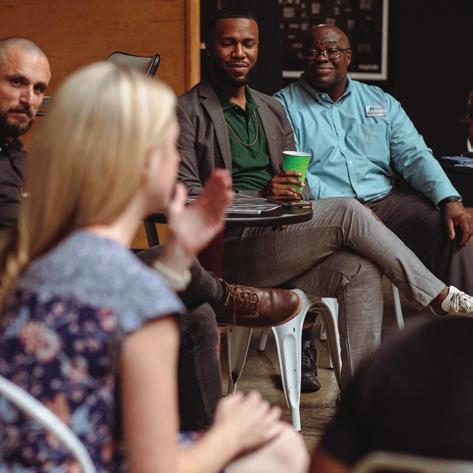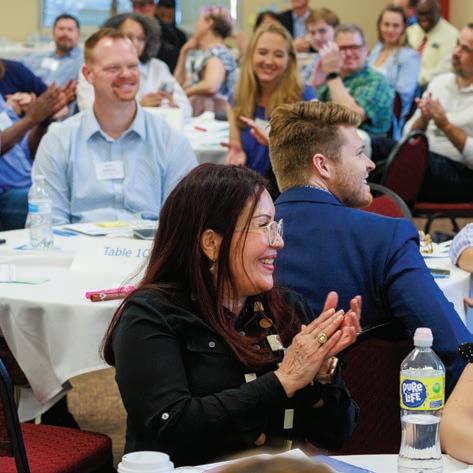






Editor
ENTREPRENEURSHIP TEAM AT INDIANA ECONOMIC DEVELOPMENT CORP
Creative Director
POLINA OSHEROV
Design Director
LINDSAY HADLEY
Managing Editors
MORGAN ALLEN ALEXA CARR JULIE HEATH JENNY WALTON
Copy Editor ANNE LAKER Designer CARRIE KELB
JENNIFER BIBBS COLLIMEDIA WIL FOSTER JAY GOLDZ
MYRIAM NICODEMUS
POLINA OSHEROV
Writers
CORY CATHCART
EBONY CHAPPEL
COLIN DULLAGHAN
CRYSTAL HAMMON
RYAN MILLBERN
DAWN OLSEN
TERRI PROCOPIO SAM STALL
JENNY WALTON
This project used the services of 16 Hoosier small business owners and freelancers paying them more than $120,000 in creative fees. The funds enabled these entrepreneurs to buy new equipment, invest in their studios and marketing materials, start new ventures, grow their teams, hire accountants and assistants.
PRINTED BY FINELINE PRINTING, INDIANAPOLIS, INDIANA
PROUDLY MADE IN INDIANAPOLIS, INDIANA
Letter
9 Steps to Starting a Business p .16 Adipo Therapeutics p.18
ArcticRX p. 19 Blüm Relocation p . 20 FoodMeets p. 21
Economy for Everyone p. 22 InsightTRAC p . 24
NanoBio Designs p. 25
On-Ramp Accelerator p. 26 Tips and Recommendations p. 28
OmegaSkin p. 30
Tutor Us p . 31 Entrepreneurial Mindset p. 32 Verility p .33
FIRST Indiana Robotics p. 34
1 Million Cups p. 36
American Evidence p. 40 Aspire Group p. 41 Atlas Solutions p. 42 BoCo Collective p.43
Columbus Way p.44 Crossroads Solar p.46 Face Finances p.47
Teachers as Ecosystem Builders p. 48 Karyosoft p. 50 Kupros p. 51 MITO Materials p. 52 Heritage Group Accelerator p. 54 Move2Train p. 55 Paradise Spreads p. 56 Patchables p. 58 Pierce Aerospace p. 59 Plantennas p.61 Snapped p. 62 Community Navigators p. 63 Southern Indiana Bait Co p. 64 Roaming Wedge p.65 Wave Therapeutics p. 66
ROCKaBLOCK p. 70
950 Speakeasy p. 71 Abrams Studios p. 72 Ateois Systems p. 73
CDFI South Bend p . 74
Café Baby p. 76 Civic Champs p. 77 Mach Medical p. 78 Conspire p. 80 ConverSight p. 81
Co-Working p. 82 Crown Jewel p.84 Indiana Black Expo p. 85 Importin' Joe's Coffee p. 86
JUA Technologies p. 88 Kanela Drinks p. 89 Legacy Courts p. 90 Mom Water p.92
NearSpace Launch p. 93
Process Alliance p. 94 Qualifi p. 95
RAZOR Medical p. 96
RX Lightning p. 97
Sea Salt & Cinnamon p. 98 SIMBA Chain p. 99
The Bee Corp p. 100 Traction AG p. 102 Traduality Language p. 103 ZeroCarb LYFE p. 104
120 Water p. 108 3 Sisters Investments p. 109 Alliance RV p.110 Ameri-Can Engineering p. 112 audiochuck p. 113 Beneker Family Farms p. 114
Black Lodge Coffee p. 115 BNutty p. 116 Boomerang Ventures p. 118
Boston International p. 119 Diamond K Sweets p. 120 Genie Supply p. 122 Green Filing p. 123 Hudson Star Green Mowers p. 124 Mayasari Indonesian Grill p. 125
Mid-America Safety Solutions p. 126 Old 55 Distillery p. 127 StoryBolt p. 128 Tayco Brace p. 130
The Electrical Connection p. 131 Red Pepper p. 132 Tolbert & Tolbert p. 134 Valor Defense Solutions p. 135 Scott Dorsey p. 136 M25 Ranking p. 138 Elevate Ventures p.140
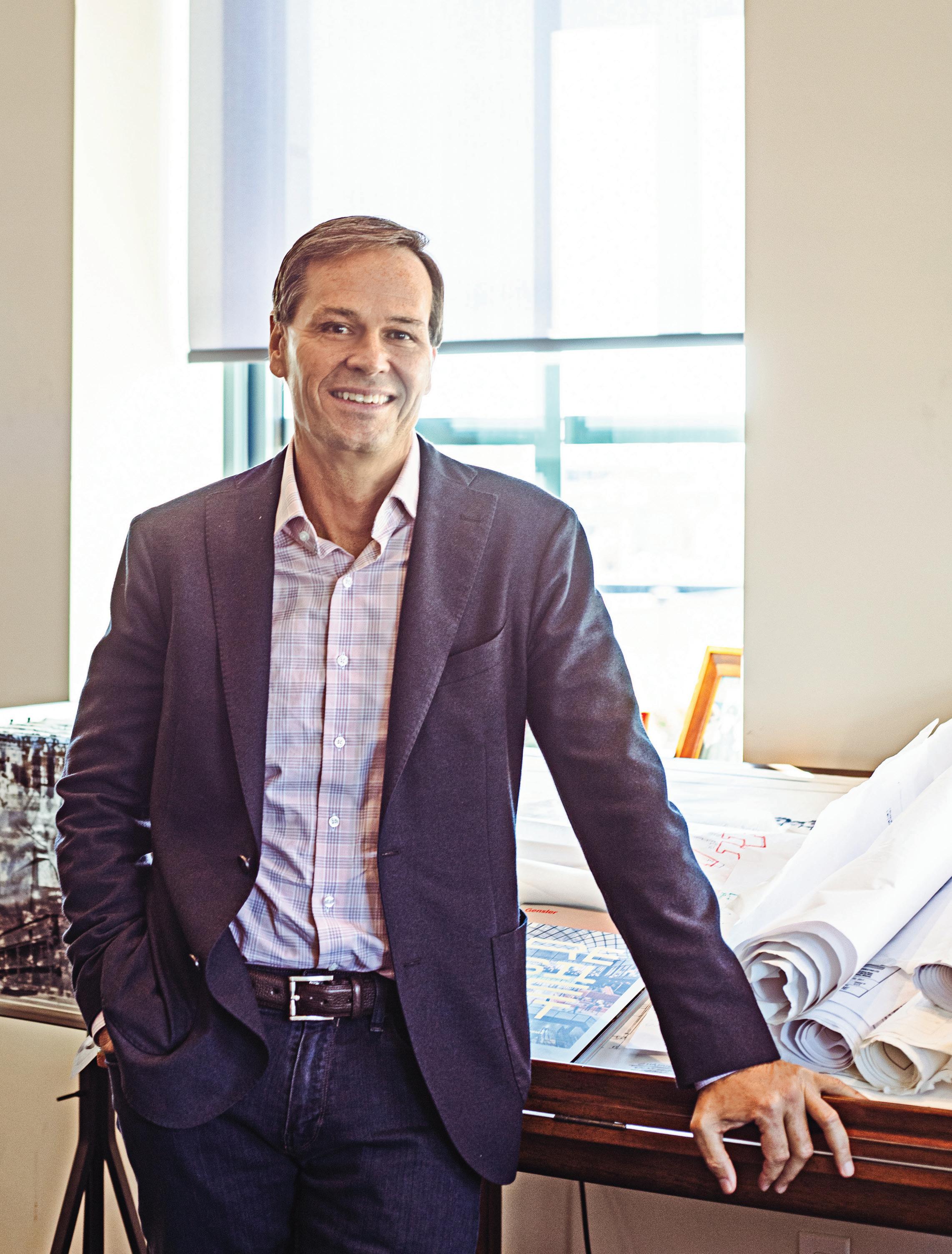
In 2022, his pharmacy has transformed into the 25th largest company on the planet and supports tens of thousands of jobs and provides life-saving medicine worldwide. His name was Eli Lilly. The Colonel’s company also ventured into philanthropy and is now also a global force for humanitarian and social good. Colonel Eli Lilly was a dreamer, risk taker, and a Hoosier entrepreneur who has changed our state in innumerable ways. His story, and the stories of countless others, demonstrates the power of entrepreneurship. Entrepreneurship changes the world, is fundamental to the founding of our great nation, is foundational to our state, communities and families everywhere.
As an entrepreneur for almost 40 years, I have lived this journey. I have experienced the long hours, the self-doubt, the stress and failures, but I have also experienced the joy of building something, the endless learning, and the satisfaction of seeing your dreams become reality. Being an entrepreneur is not for the faint of heart. I never would have believed that those humble beginnings could someday become a national business supporting hundreds of employees and contributing to the state and national economy. But that is what can happen if you just take one determined step at a time,—soon you turn around and are amazed at how far you’ve gone.
Entrepreneurship Indiana is a celebration of that entrepreneurial journey, a spotlight on our best and brightest entrepreneurs—those risk takers, dreamers, innovators, who are fundamental to our state’s future economy.
What is celebrated is emulated, and if this book, and Indiana’s celebration of entrepreneurship, inspires even one more entrepreneur to take the next step in their journey, then mission accomplished.

In this publication you will find stories featuring 100 Indiana manufacturers, restaurateurs, tech founders, and more. Each one of these determined entrepreneurs, each at different stages of their journey, play an important role in making our communities unique and quality of life stronger.
Entrepreneurship is a key focus in my role as Secretary of Commerce; in fact, it is my aspiration that Indiana becomes the single best location in the nation to start or grow a business. Indiana entrepreneurs are already succeeding in every corner of our state, and it is my hope and intention to further invest in our entrepreneurial ecosystem to help even more Hoosiers achieve their entrepreneurial dream. There is no greater investment a government can make than to support the economic potential of our citizens or state. This annual publication is one of many ways the Hoosier state is celebrating entrepreneurship and the important role it holds in our economic future. Stay plugged in by visiting EntrepreneurshipIndiana.com.
Bradley B. Chambers Secretary of Commerce State of IndianaEntrepreneurs and the new companies they launch are crucial to the state’s economic development future.
“Research shows that productivity, new job growth, the economy of tomorrow, and community-level economic health are driven by new and young companies,” says Julie Heath, VP of Entrepreneurial Ecosystems at the Indiana Economic Development Corp (IEDC).
Helping aspiring business founders and entrepreneurs isn’t a new idea, but recently community leaders have learned the power of new and young businesses for the purposes of economic vibrancy and quality of place. Creating the conditions for people to successfully start companies, also known as entrepreneurship ecosystems is a recent chapter in economic development.
“The Kauffman Foundation is the national thought leader in this space and at the 2019 ESHIP Summit, Dell Gines shared a framework that breaks economic development into four parts – four waves of creating prosperous and growing economies. The first wave is industrial recruitment, the second is small business support, the third wave focuses on clusters, and the fourth wave, entrepreneurship ecosystems, started around 2010.”
The economic impact of new businesses can be felt across the state, beginning with the neighborhoods where they establish roots.
“If there is one successful new company start–even a web-based microbusiness–it increases the median household income for households nearby,” says Heath, citing research from Venture Forward, a GoDaddy initiative started in 2018 and their work with UCLA to measure the economic impact of 20 million U.S. microbusinesses.
Venture Forward also found that on average, two or more jobs are created by every microbusiness entrepreneur, not counting their own. New businesses hire employees, pay suppliers and spend money in the community, supporting other businesses. All of this has a multiplier effect.
“We are seeing local and regional leaders take action. Leaders in Noble County have come together to launch entrepreneurial ecosystem efforts because they want to see their homegrown companies flourish,” shares Heath.
With the connection between new job growth and young companies in mind, in early 2022 the Entrepreneurship & Innovation team at IEDC worked with Indiana Business Research Center at Indiana University to figure out job growth driven by young Indiana companies between 2000 and 2019.

Using U.S. Bureau of Labor Statistics data, they found Indiana companies in their first five years created more net-new jobs in Indiana than any other “age group” of companies, accounting for over 36,000 new jobs in 2019 alone.
Heath and the IEDC team consider it their mission to celebrate the entrepreneurs who are thriving across a diverse range of evolving entrepreneurship ecosystems in Indiana—and to support them with the resources necessary to continue to grow their businesses and enrich their communities.
The stories shared in these pages are just the beginning of the conversation, one that IEDC hopes continues in collaborative workspaces, conferences, and board rooms across the state. These are vital conversations that might very well lead to one Hoosier connecting with another and creating a more prosperous economic future for everyone.
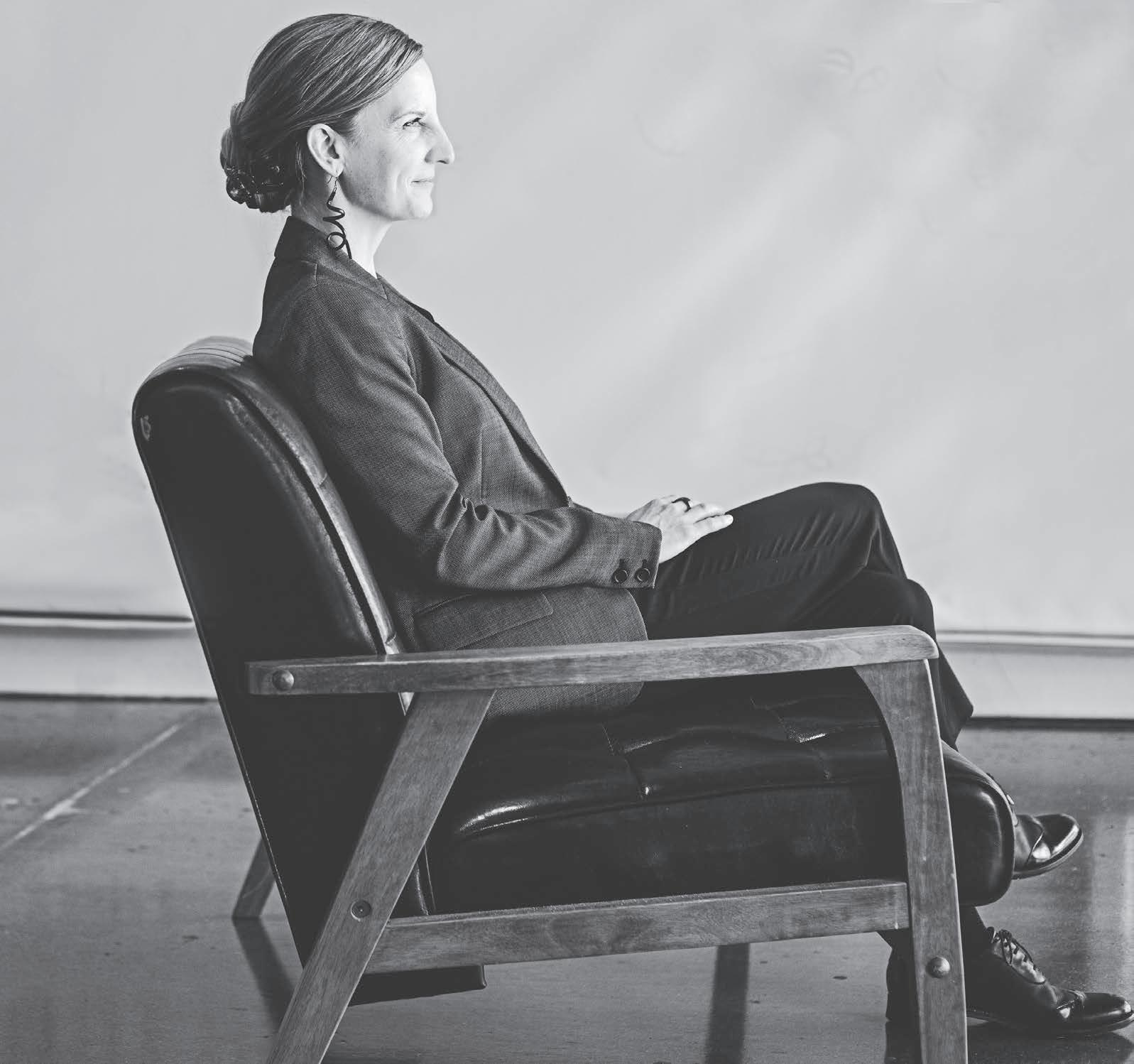 —JULIE HEATH, VP OF ENTREPRENEURIAL ECOSYSTEMS
—JULIE HEATH, VP OF ENTREPRENEURIAL ECOSYSTEMS
Research shows that productivity, new job growth, the economy of tomorrow, and community-level economic health are driven by new and young companies.”
WHERE DOES entrepreneurship FIT INTO ECONOMIC DEVELOPMENT?
With a growing portfolio of more than 125 clients across six continents, Startup Genome is a policy advisory and research organization that bolsters startup ecosystems— both public and private, in partnership with global thought leaders and practitioners.
Startup Genome is perhaps best known for its Global Startup Ecosystem Reports (GSER), first published in 2012. Ten years later, in his intro letter to the 2022 edition of the GSER, Startup Genome Founder and CEO JF Gauthier reflects on how that first report highlighted the Western and Englishspeaking cities in their findings. The results of the 2022 research show that startup ecosystems can now be found thriving around the world.
As the COVID-19 pandemic forced companies to find new virtual and digital iterations of previously physical realities, startups were, more often than not, rising to meet these critical demands. The 2022 GSER highlights this rapidly changing landscape and the cities leading the way in the Global Startup Ecosystem Ranking. Silicon Valley, New York, London, and Boston are the top four, followed by Beijing, Tel Aviv, Seoul, Tokyo, Singapore, and Sydney. The industries that spawn the most startups include artificial intelligence
& big data, educational technology, financial technology, cybersecurity, clean technology, blockchain, digital media, gaming, and life sciences to name a few. And the GSER details the changes in rounds of funding and exits over time along with sub-sector trends.
In total it’s nearly 400 pages of sophisticated data visualizations and analysis of these top cities and the regions they occupy along with the industries impacted. Due to its scope, the GSER takes the 10,000 foot view of these startup ecosystems, but within the North America regional analysis, two full pages are dedicated to the exploration of how “Local Connectedness Is Driving Indiana’s Thriving Startup Ecosystem.”
The report describes Indiana as “an affordable, affable startup hub” with startups, universities, and corporations dedicated to some of the world’s fastest growing tech sectors including health and clean tech. In many ways, according to the Startup Genome findings, Indiana out-performs nearly all comparable ecosystems. The findings also predict that Indianapolis will start annually producing $100-million-plus scale-ups. The prediction is based on data including a record year of investment
when Indiana startups collectively raised $1.4 billion across 159 deals and a 13% higherthan-peer success rate from Seed to Series A funding. The prediction is also tied to a long history of innovation and investment at top tier universities in Indiana; the attraction and impact of major industries and corporations; and what is defined as its high degree of local connectedness—col loquially understood as “Hoosier hospitality applied to founders.”
Local Connectedness measures how much help an entrepreneur can get when they are stuck.
Help can be from a peer, mentor, investor, or expert in the industry. Startup Genome has found that the regions with the highest levels of local connected ness accelerate all their entrepreneurs twice as fast in quarterly revenue growth compared to regions with low levels of local connectedness.
The report refers to Indiana as the birthplace of modern technology transfer in 1980 due to U.S. Senator Birch Bayh’s work on a law that established universities’ ownership of patents. This law led to a landscape that today includes Elevate Ventures and BioCrossroads, in addition to IU Ventures and Purdue Ventures. The facility of technology transfer also attracts companies such as MBX Biosciences. With more than $60 million in funding, the MBX Biosciences laboratory at Indiana University is developing a treatment for endocrine disorders based on discoveries made by its co-founder, the serial entrepreneur Richard DiMarchi.
According to Startup Genome assessment, world-class degrees and research facilities offered through Indiana
University, Purdue University, and the University of Notre Dame are attracting top national and international talent to Indiana. These same students are then often remaining in the state for its low cost of living and quality of life— expanding the pool of highly qualified engineering and business experts.
But not all entrepreneurs find their way to Indiana through a university. Formerly based in Israel, the agricultural tech startup Taranis relocated to Indiana due to its strong agricultural economy. Another example: formerly based in Oklahoma, the speciality chemical company MITO relocated in Indiana to be at the heart of manufacturing in the Midwest.
Haley Marie Keith, co-founder of MITO Materials, says it best: “Indiana’s strong ecosystem gives companies who grow here access to corporations that can be customers, mentors, collaborators, and investors.”
Startup Genome agrees that members of Indiana’s entrepreneurial network have “forged a strong sense of community and relationships among founders, investors, and experts, and this is what strengthens the ecosystem.” The GSER also notes that the network continues to grow as Hoosiers disperse around the world but maintain strong relationships in Indiana and often return, bringing their global connections back home.
It’s a spirit of connectedness worth celebrating and leaning into as Hoosier entrepreneurs and startups respond to new realities and new possibilities across industries and into the future.
“Someday not too far in the future, when people think about the most important issues related to the well-being of all people, I believe entrepreneurship should be on the shortlist,” says Victor Hwang.
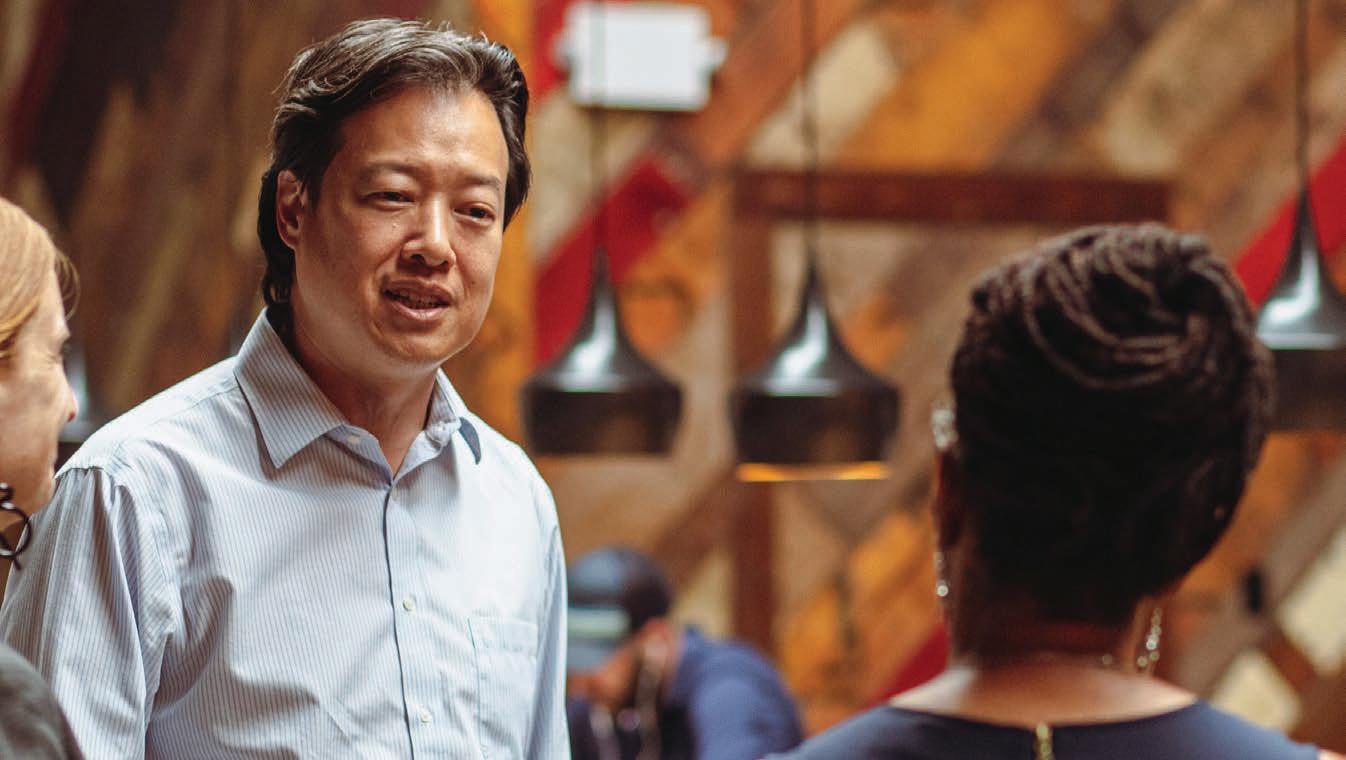
If anyone can realize this vision, it’s Hwang. As Vice President of Entrepreneurship at the Kauffman Foundation, the world’s leading philanthropy supporting entrepreneurs, Hwang led initiatives that impacted over 200,000 business founders. He’s served as an economic development consultant for the World Bank, Ford Foundation, and the U.S. Agency for International Development. And he’s worked with corporate clients ranging from Accenture to Microsoft.
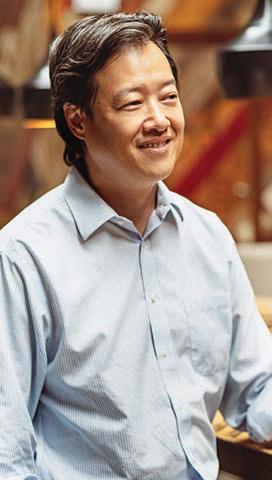
His latest endeavor, Right to Start, is dedicated to unleashing entrepreneurial opportunity for everyone. “Those of us in the entrepreneurship world know how important it should be,” Hwang says. “It’s the source of new job growth, poverty alleviation, and it helps fight inequality. Entrepreneurship is so core to everything that we consider to be the American Dream, but it’s ignored in the public discourse.”
According to research by the Kauffman Foundation, 62% of Americans have a dream business in mind, and 41% would start their business within six months if they could. However, only 2% do. “To reboot the American Dream, you have to look at the whole system itself,” Hwang states. “You can’t look at entrepreneurs like a single line item.”
Right to Start seeks to lift the voices of entrepreneurs through storytelling and media, to advocate for proentrepreneur policies by engaging policymakers and civic leaders at all levels, and to mobilize citizens to take action in support of entrepreneurial activity.
Since its launch in 2020, Right to Start has already seen five state legislatures introduce bills addressing everything from alleviating regulatory burdens and shifting tax policy to expanding capital access and workforce training. “Through this movement we’ve been encouraging people to think about entrepreneurship in a more expansive sense.” Hwang says. “How do we improve the entire ecosystem of policies and issues that impact the successes and failures of entrepreneurs?”
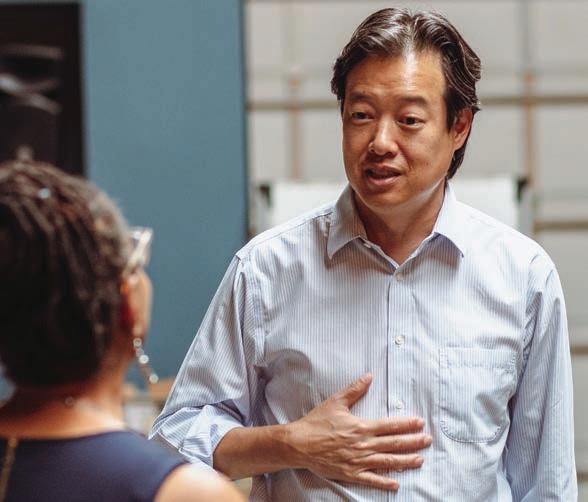
Hwang sees Indiana as a paragon of what can happen when states begin to treat entrepreneurship systemically. “I’ve heard many people in other states talk about Indiana as a shining light in addressing these complex economic development issues that cut across different industries,” Hwang says. “The states that are starting to look at this and tackle it in a holistic sense are those that are starting to make some strides.”
Hwang believes Indiana and other Midwest states have ample room for growing entrepreneurship into the future.
“There’s a strong base of people here who learned from the ground up how to make stuff work,” Hwang says. “As the internet and digitization transform traditional industries, we need to unlock that talent and energy and apply that Midwestern pragmatism to innovation.”
Including the voices of entrepreneurs in advocacy to leadership is crucial to sustaining the success that states like Indiana have achieved. “Entrepreneurs have no time and money to get involved [in policy], so they have some of the smallest voices—and leadership and policymakers tend to ignore the smallest voices,” Hwang notes. “We need to make sure there’s an intentional effort to pull them into conversations to help make the environment more pro-entrepreneur. If you can get that right, a lot of great things will follow.”
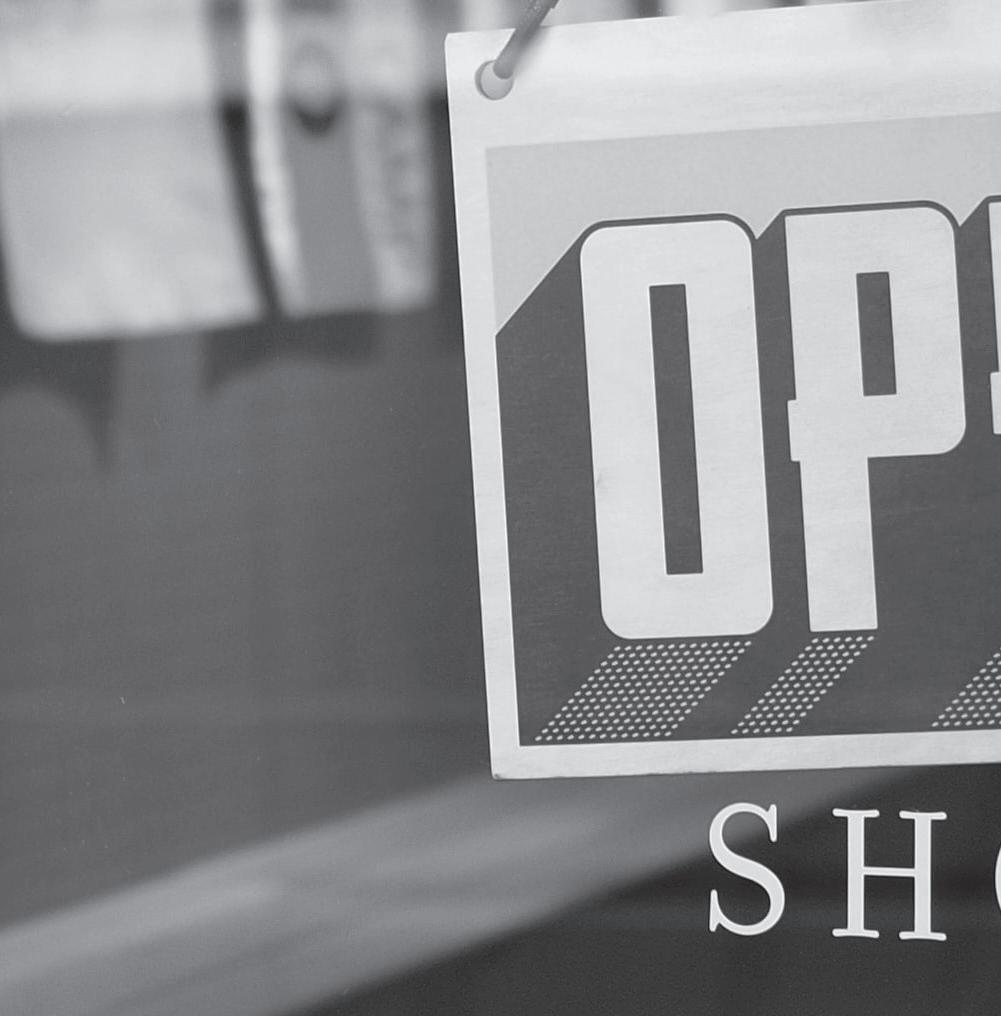



Adipo’s breakthrough technology stems from Dr. Deng’s 15 years of experience developing technolo gies for cell and tissue engineering, and drug development.''
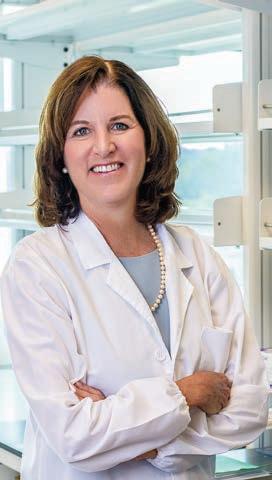
By 2025, the Centers for Disease Control and Prevention estimate that one in five Americans will have Type 2 diabetes.
While current treatment focuses on diet and exercise, Adipo Therapeutics believes there is another option: localized fat browning.
Founded by Dr. Meng Deng, associate professor of agricultural and biological engineering, biomedical engineering, and materials engineering at Purdue University, Adipo uses bioengineered polymeric nanoparticles to induce local browning of white fat, or adipose tissue (from which Adipo gets its name). The process inhibits Notch signaling, a pathway that allows cells to communicate with each other. Studies have shown that treatment—received via weekly subcutaneous injection leads to a conversion of white fat to brown fat, weight loss and improved glucose control.
“For people with diabetes, there’s about an eight-year reduction in life expectancy,” says Adipo CEO Karen Wurster. “So, we’ve been focused on bringing to market a product that makes a difference in the lives of people with diabetes.”
Adipo’s breakthrough technology stems from Dr. Deng’s more than 15 years of experience developing technologies for cell and tissue engineering, and drug delivery development. Resources and support from Elevate Ventures, Purdue Foundry, IU Ventures, the AXIS Mentoring Program, the Queen City Angels Entrepreneur Boot Camp, and other mentors helped kickstart the company.
Adipo is currently conducting preclinical studies. Recently, the team met with the U.S. Food and Drug Administration to talk about next steps. “Our goal is to complete preclinical safety studies in 2023 to provide the FDA the data needed to apply for approval for first human dose."
"WE’VE BEEN focused ON BRINGING TO MARKET A PRODUCT THAT MAKES A difference IN THE LIVES OF PEOPLE WITH DIABETES.”
A big thing for us is seeing the impact on the real world.''
Stuart Lowry and Shane Bivens became business partners when both had a vision for a better kind of passive cold chain transport and storage in an industry severely lacking in innovation for the past 50 years. "We want to make a sustainable business and do good in the world at the same time- this is how we designed ArcticRx,'' says Bivens.
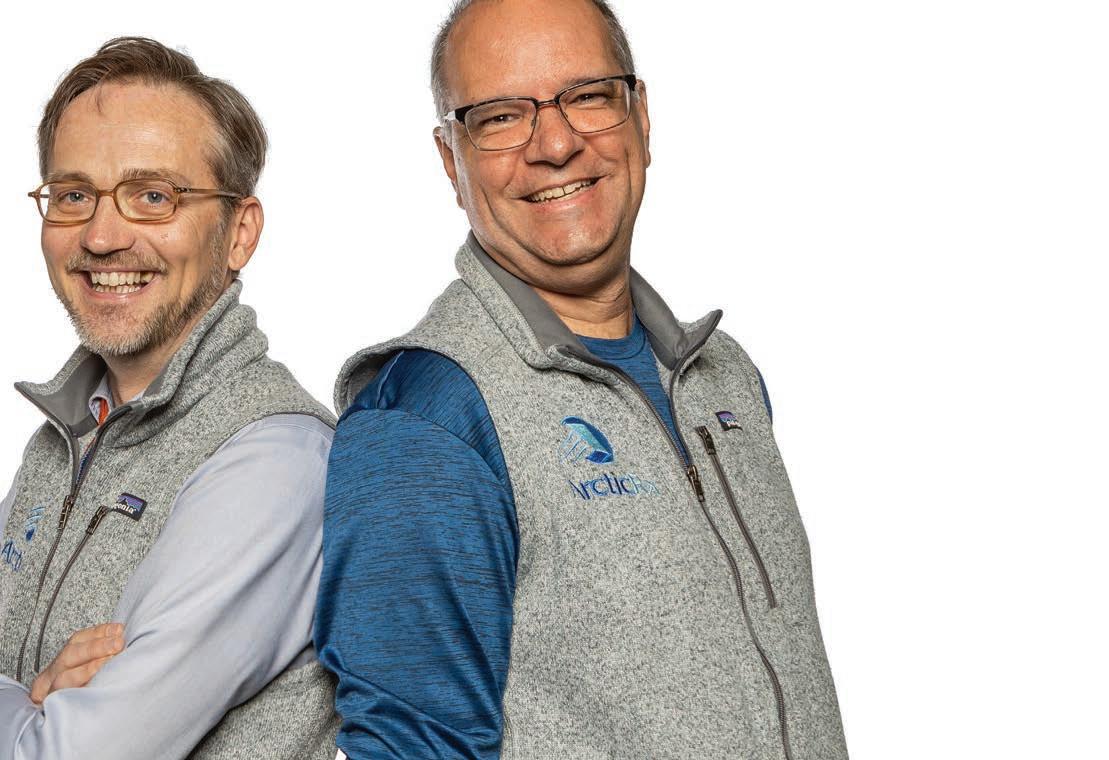
I magine: a dishwasher-sized pod charged once, and it stays ultra-cold for 600 hours. Styrofoam- and BPA-free, and reusable, too, these transport pods have a relatively tiny carbon footprint. Competitor cooling products currently last about three to five days, but ArcticRx technology cools beyond 21 days.
Lowry and Bivens launched ChefsFridge Co. in 2018, and ArcticRx in 2021, their lead product in response to the COVID-19 pandemic. “The World Health Organization estimates we lose about 50% of all vaccines from spoilage,” Bivens says. “A lot of waste will happen not only in developed countries, but globally. Waste is a major issue in cold-chain logistics.”
The pair discovered how units move around matters. “Because of supply chain issues and bottlenecks, we purposely designed something that can fit through international doorways,” Lowry says. “ArcticRx can easily move products needed for both health and food equity through different modes of transportation.”
Initially funded by Pitch Winnings from Dimension Mill, Dartmouth College, and the Muncie Innovation Connector, the company is now identifying strategic partners. As a part of the Export Indiana Accelerator Program, the hope is to expand ArcticRx globally within the next two years. “A big goal for us is seeing the impact on the real world,” Bivens says. “We want to make a sustainable business and do good in the world at the same time- this is how we designed ArcticRx.”

“WE WANT TO MAKE A sustainable BUSINESS, BUT AT THE SAME TIME WE WANT TO DO WHAT’S GOOD, AND THAT’S HOW WE’RE STRUCTURING WHAT WE DO.”
ArcticRx by ChefsFridge Co.
I realized that when people don’t feel settled, they can’t be their best selves.”
She repeatedly heard companies struggling to get out-of-state candidates to accept offers. “No one enjoys moving,” she says. “I started thinking about why we haven’t figured out a way to make it less miserable.” She began to wonder if the real issues weren’t due to the physical moving process itself, but the mental load that came along with it.
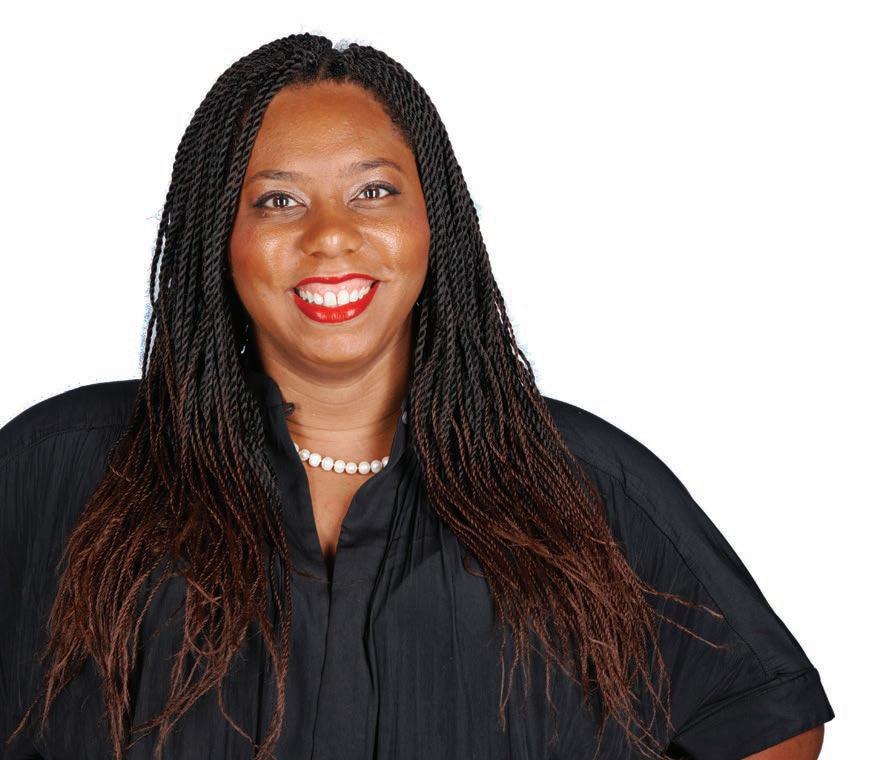
So in 2021, Martin-Urban launched Blüm Relocation Technologies, a technology-enabled personal concierge service to address the pain points of moving and to make executive level relocation services available to all. After a client takes a series of surveys, her company manages tasks that help the client get established in a new location: from organizing the move to identifying services such as physicians and hair stylists. “I realized that when people don’t feel settled, they can’t be their best selves,” she says.
Martin-Urban found support for her startup from Be Nimble and won The IMPACT Fund’s PitchFeast. She also received support from the Indiana Technical Assistance Program (INTAP) which she is using to complete the company’s Minimally Viable Product (MVP) development by the end of 2022. She sees Indiana’s commitment to investing in entrepreneurs as having a very positive impact on the state as a whole. “Helping people find their purpose creates a strong society,” she says. "Small businesses are the lifeblood of the American economy, and focusing on their growth is key to our future as a state and nation. Helping Hoosiers reach their potential is a really great place to start."

Domini Martin-Urban became curious about relocation issues while working in the economic development field on e-commerce talent attraction.
We decided to use our love of food as a way to help people connect.''
Originally partners in a Carmel High School business competition, Priya Una and Victoria Nopporn reconnected as Indiana University students to create an app to solve for social disconnection.
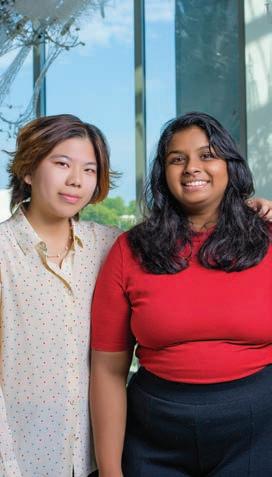

“Coming back from the pandemic, it was really hard to meet new people,” Una says. “We decided to use our love of food as a way to help people connect.” After finishing in the top eight at Indiana University’s Clapp IDEA competition, the duo’s app and LGBTQ women-owned company, FoodMeets, was launched in May 2021.
Targeting graduate students and post-college adults, the app connects people moving to a new city with others who want to try new restaurants. While still in the funding phase, the two have relied on the mentorship of Indiana University’s Dr. Travis Brown of the startup incubator, The Shoebox, to help guide them along the way.
“Last year we went to The Shoebox and talked to other entrepreneurs,” Nopporn says. “Being able to get ideas and connect with other startups helped us take a step back to better understand our path.” In January 2022, they started development through a local platform to up the power of the app.
Una and Nopporn are now working on acquiring a second round of funding and finishing native app development to further grow the company. By December 2023, they aim to have a reliable user base—fueled by TikTok and Instagram testimonials—to monetize the FoodMeets app, and to expand into larger markets such as Chicago, New York, and San Francisco.
“BEING ABLE TO GET IDEAS AND CONNECT WITH OTHER STARTUPS HELPED US TAKE A STEP BACK TO BETTER UNDERSTAND OUR PATH.”
In late 2020, the Community Foundation of Greater Fort Wayne (CFGFW) established its Everyone’s Economy Pillar committee, with the goal of creating "an economy where every citizen has the opportunity for upward mobility and increased security.”
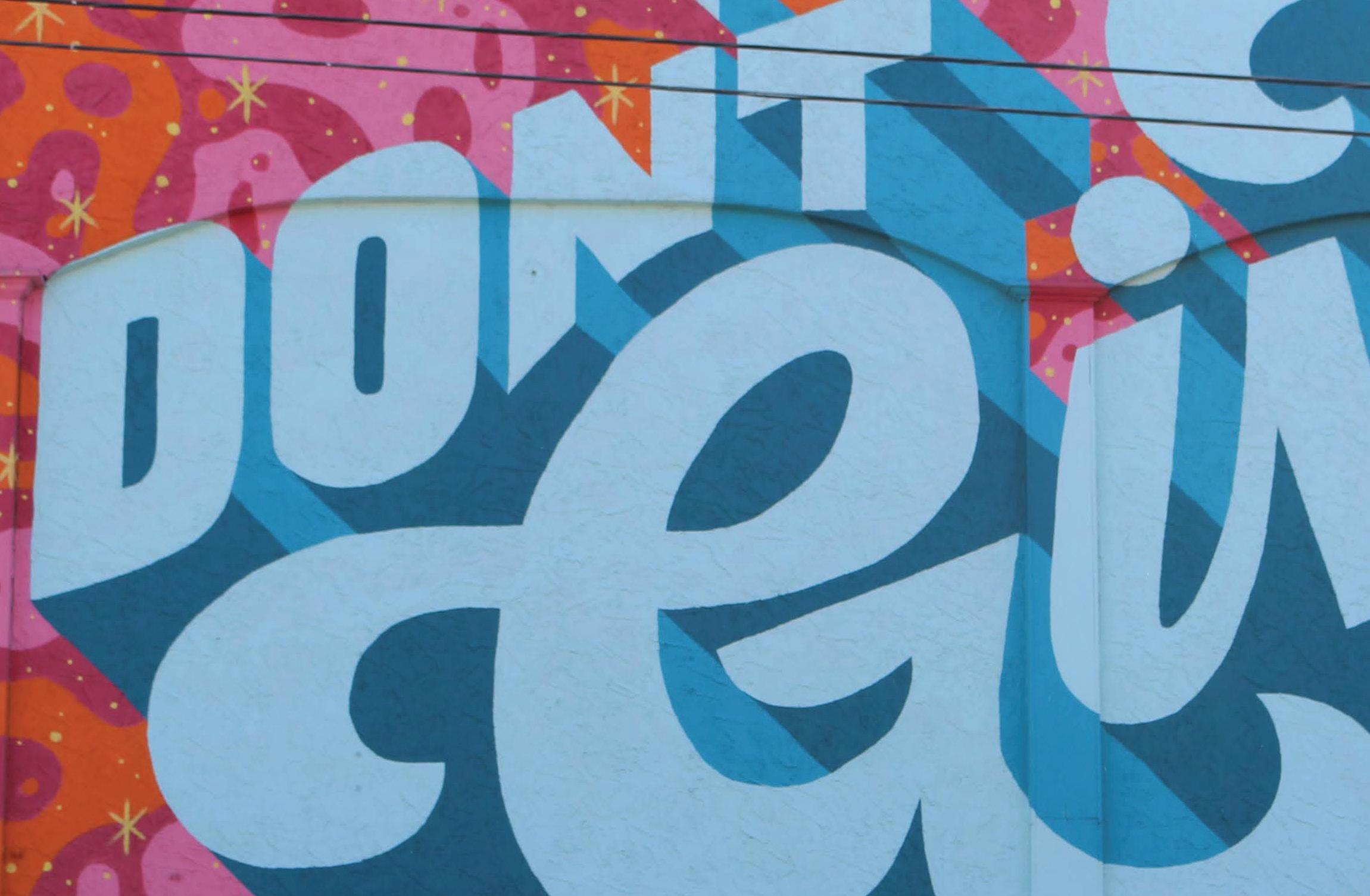
The committee—comprised of key stakeholders in the Fort Wayne business community ranging from Greater Fort Wayne Inc. to Chase Bank to the Don Wood Foundation— determined that the best way to build for the city’s economic future was to create a healthy entrepreneurship ecosystem.
Spearheaded by Start Fort Wayne, a nonprofit that helps entrepreneurs turn ideas into growth-oriented businesses, the committee solicited feedback from over 600 entrepreneurs in the area. The result: the Entrepreneurship Ecosystem Strategy, a 10-year tactical plan for taking shared responsibility for the success of Fort Wayne’s new business climate.
The Entrepreneurship Ecosystem Strategy focuses on developing and enhancing the interplay of six core areas: policy, markets, finance, culture, supports, and human capital. By 2030, the committee is targeting $1 billion in total financial capital access for entrepreneurship.
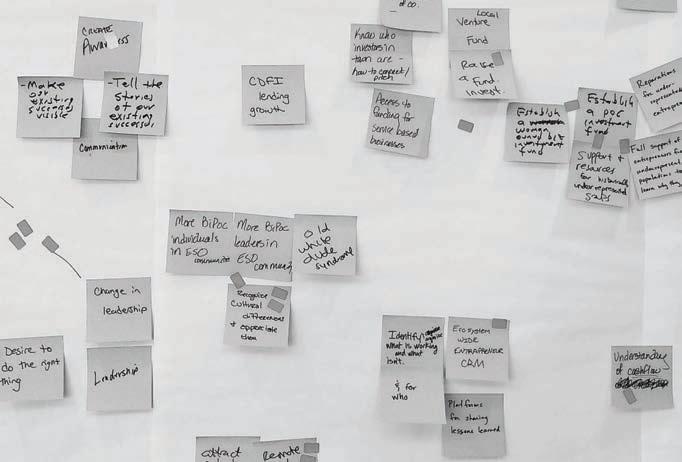
Recognized by Niche.com as the #1 U.S. city with the lowest cost of living relative to income, Fort Wayne offers an environment where entrepreneurship can continue to thrive, with a history of classic American companies like General Electric. “Fort Wayne was built on innovation and has a rich history of supporting entrepreneurial endeavors,” says John Urbahns, president and CEO of Greater Fort Wayne Inc. “The innovative past in conjunction with the investments that have led to Fort Wayne being the fastest growing metro in the Great Lakes region position Fort Wayne to be an attractive place to launch your dream.”
Enterprise District (SEED) and Director of the City of Fort Wayne’s Community Development Division. “No one organization has all the answers, resources, or programs to help every entrepreneur out there, but there are resources for all entrepreneurs.”
Collaboration will be key among Fort Wayne community stakeholders as they seek to remove barriers for new business founders. “All of us working in concert ensures that all types of entrepreneurs—small and medium enterprises as well as innovationdriven enterprises—are successful,” says Dan Meek, entrepreneurin-residence at Elevate Ventures. “We can create a crystal-clear on-ramp process that not only provides the entrepreneur with the best possible resources but also encourages connectivity between investors, entrepreneurial support organizations, regional stakeholders, government officials, and more.”
In addition to connecting entrepreneurs with the capital and resources they need, the committee will support the businesses born in Fort Wayne with workforce training and grant funding. “We can fund training in manufacturing that prepares the next generation of workers for high-wage, high-skill, industry 4.0 jobs,” says Laura M. Macknick, executive director of the Don Wood Foundation. “We also can convene interested stakeholders in the various areas of industrial, machine tool, and engineering technologies, as well as entrepreneurship, sales, and leadership, to foster dynamic and successful programmatic outcomes through our ability to fund grants.”
The task at hand is ensuring that entrepreneurs understand— and have access to—available help. “The beauty of the ecosystem in Fort Wayne is the wealth of support available to entrepreneurs,” says Nancy Townsend, Board Chair of the Summit City Entrepreneur and
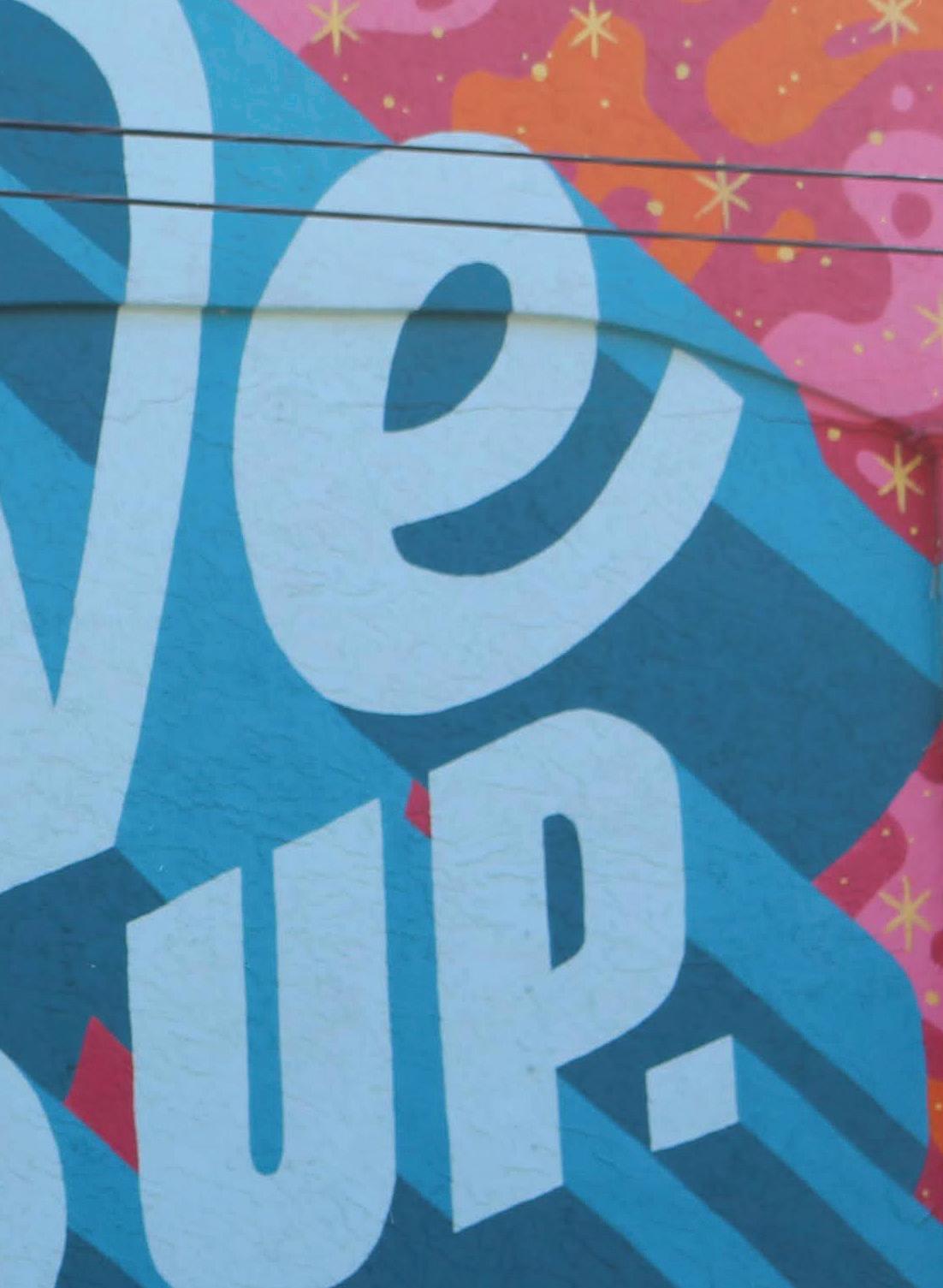
Philanthropic support, both at the onset of the endeavor and throughout the 10-year plan, is essential for growing Fort Wayne’s entrepreneurship ecosystem. “I believe philanthropy and entrepreneurship go hand in hand,” says Kristin Marcuccilli, president of STAR Financial Group. “You can contribute financially to an entrepreneur’s business and serve as a role model for them in the process. As that new business grows, hopefully they are then positioned to give back and invest in someone else.”

“THE beauty OF THE ECOSYSTEM IN FORT WAYNE IS THE WEALTH OF support AVAILABLE TO ENTREPRENEURS,”
NANCY TOWNSEND
I was out there listening to growers, hearing about their pain points, and I learned about this mummy removal process that needs to happen.''
“The assignment was to create a self-sufficient object that stimulates plant growth,” says Haldewang, whose research made her aware of declining pollinator populations.
Haldewang responded to this agricultural problem with Plan Bee, a small pollinating drone. The innovative technology was featured by CNN, Teen Vogue, and Time, and in 2015, won an International Design Award.
Forbes later invited Haldewang to demonstrate Plan Bee at its AgTech Summit, where she discovered a new market segment: almond growers. “I was out there listening to growers, hearing about their pain points, and I learned about this mummy removal process that needs to happen,” says Haldewang.

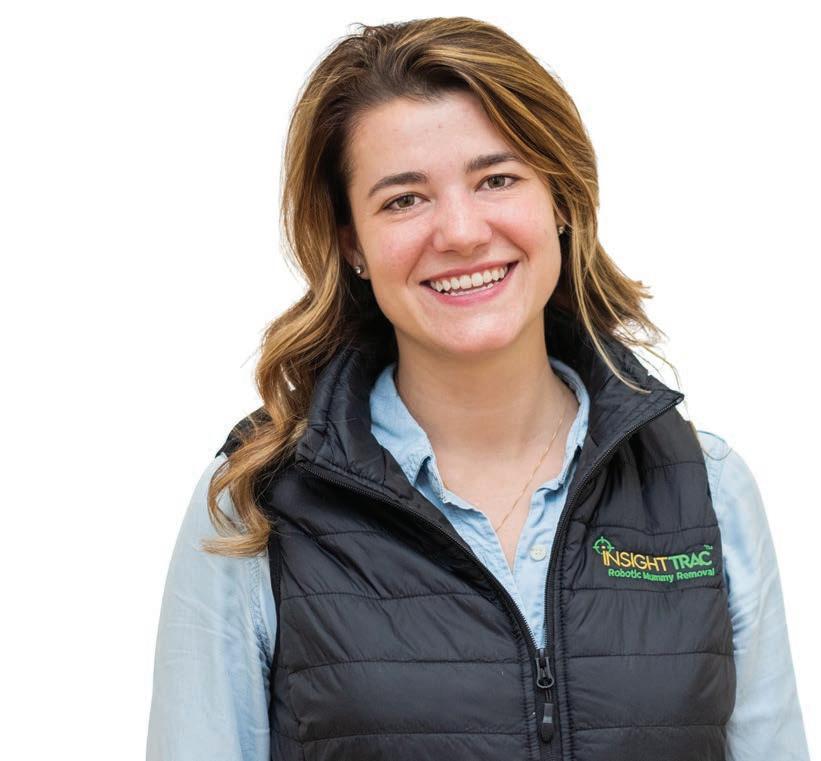
After every harvest, a few almonds are left behind. Known as mummies, the stray almonds harbor pests that hibernate over winter. Almond growers typically depend on optimal weather conditions and manual labor to remove mummies. “It’s the number one pest problem for almond growers because [the larvae] emerge in the spring as moths that can damage the yield,” she says.
Buoyed by growers’ enthusiasm for Plan Bee, Haldewang was convinced she could find an automated way to solve the mummy problem. A few months after graduating from SCAD in 2017, she started InsightTRAC. The company designs robots that seek and destroy mummies by shooting biodegradable pellets into almond trees.
Haldewang credits the Purdue Foundry with helping her conquer start-up challenges. “I had no idea how to start a company,” she says. “I took this six-week course that’s open to any entrepreneur in Indiana, and it set me on a path of figuring out my market. I just started building it from there.”
The company’s next big milestone is California’s 2022-23 mummy removal season, when InsightTRAC will deliver the newest prototypes to its first customers.
InsightTRAC InsightTRAC’s Founder and CEO Anna Haldewang got the idea for her Syracuse-based robotics company while studying industrial design at Savannah College of Art and Design (SCAD)
ANNA HALDEWANG
“I TOOK THIS SIX-WEEK COURSE THAT’S OPEN TO ANY entrepreneur IN INDIANA, AND IT SET ME ON A PATH OF FIGURING OUT MY MARKET. I JUST STARTED BUILDING IT FROM THERE.”
The idea is to deploy our microparticle technology, wherever grain is consolidated, distributed, or processed. That’s where we want to be.”
To the average observer, a handful of corn—grown for everything from tortilla chips to ethanol looks the same as every other.
But on the genetic level, it can be drastically different. Use the wrong variety and the result is mushy tortilla chips. Or worse, if different varieties get inadvertently mixed together into the wrong silo or truckload, the whole load may be rejected by a buyer in order to comply with the USDA’s Bioengineered Food Disclosure Standard.
Ryan Skaar, chief operating officer of NanoBio Designs, is tackling this problem with a novel rapid genetic detection system that provides transgenic trait identification on grain samples in minutes instead of days. The offsite delays of current testing means a truckload of grain might have to sit at a storage facility for days awaiting analysis. “The idea is to deploy our microparticle technology, wherever grain is consolidated, distributed, or processed,” says Skaar. “That’s where we want to be.”
NanoBio Designs moved here from Iowa with the support of Agrinovus, and if pilot testing goes well, NanoBio aims to commercialized its technology by the end of 2023 or early 2024. Purdue University’s AgCelerator innovation fund recently invested $100,000 in the company, which provided NanoBio with critical startup support. NanoBio also received investment through Elevate Ventures Nexus Regional and State pitch competitions and was awarded Indiana’s 2022 Innovative Small Business of the Year by the Indiana Small Business Development Center (SBDC).
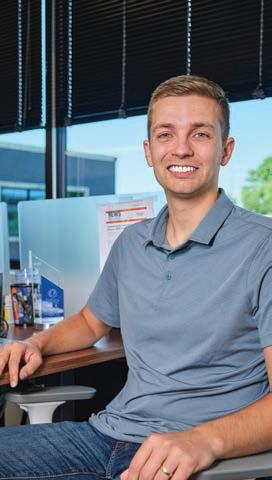
Once the technology hits the market, there are other potential uses for it, including tracking food pathogens in supply chains, detecting corrosive molds on aircrafts, and even determining the gender of chickens while still in the egg. In all cases, testing is geared to happen quickly and on-site.
“Our mission is to take DNA testing out of the lab and give it to grain distributors who need to make fast, onsite, and cost-effective data driven decisions.”
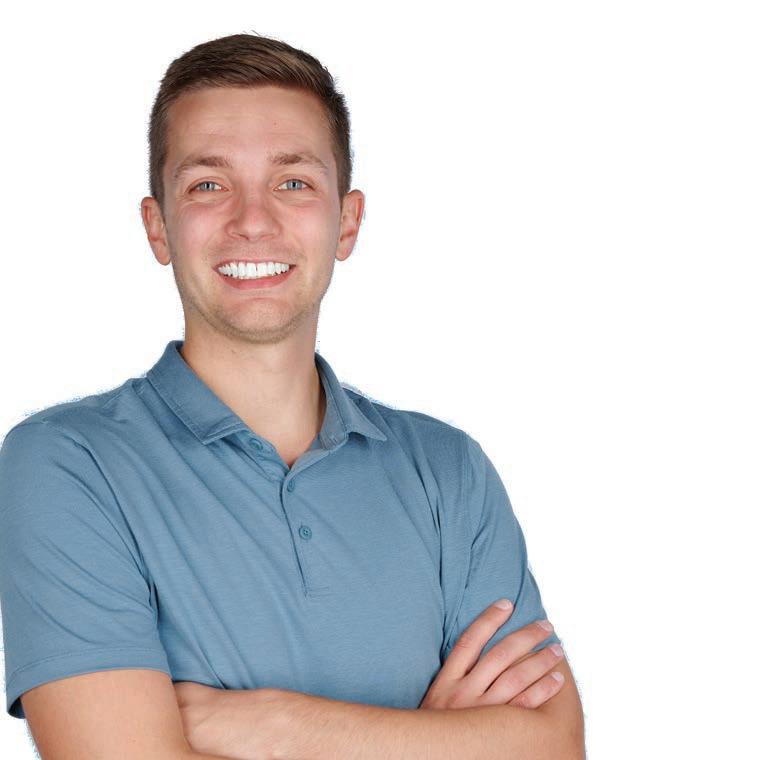
“OUR MISSION IS TO TAKE DNA TESTING OUT OF THE LAB AND GIVE IT TO GRAIN DISTRIBUTORS WHO NEED TO MAKE FAST, ONSITE, AND COSTEFFECTIVE DATA DRIVEN DECISIONS.”
That’s a tenet embedded in the mission of the Indiana Arts Commission (IAC). With a focus on training, supporting, and developing artists in various disciplines, IAC’s statewide On-Ramp Creative Entrepreneur Accelerator Program was established in 2018 to support arts-and-culture-based businesses. Participants are eligible to receive fellowship funds upon completing the accelerator to help put their plan into action.
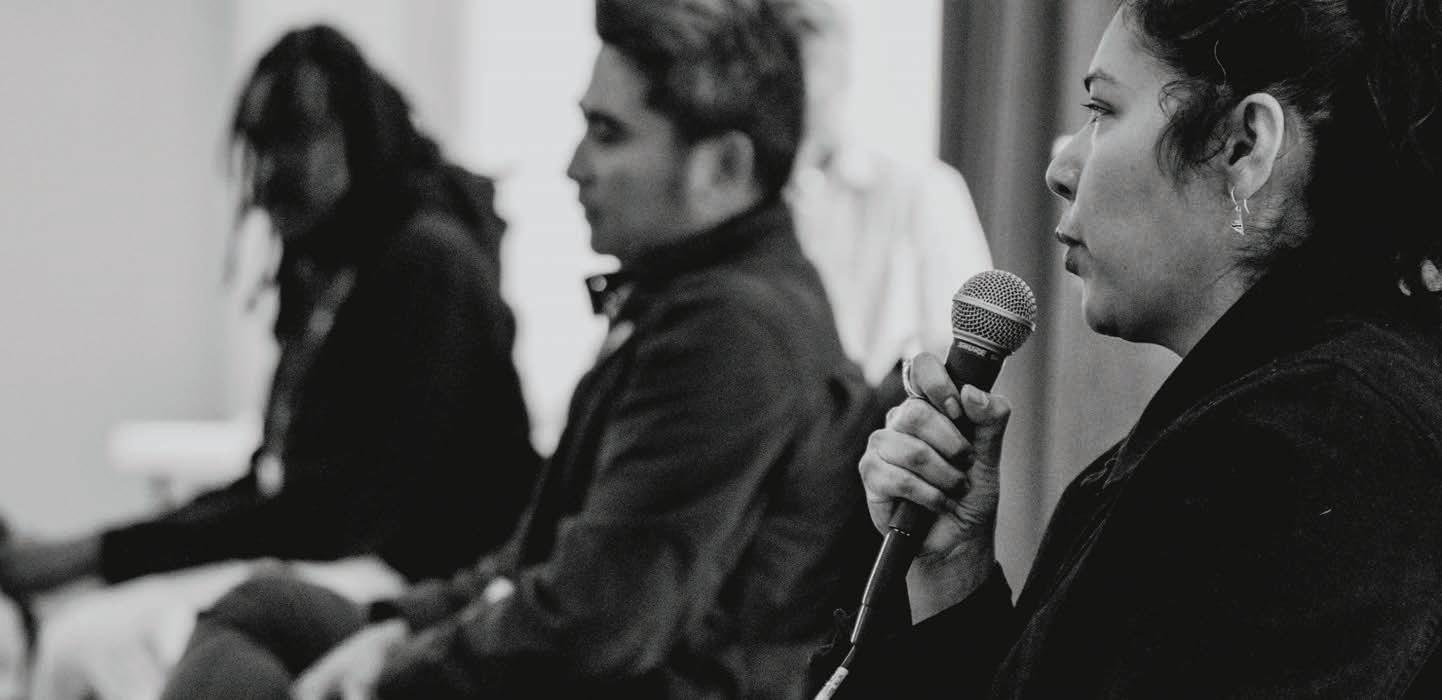
“Indiana is a really attractive place to be a creative entrepreneur, but they need more support,” says IAC Executive Director Miah Michaelson. “We know that training is important, but what’s also important is follow-up funding to help them achieve their small business development goals.” Illustrators, music producers, art therapists, screenwriters, and ceramicists are just a few of the creatives turning artistic talent into full-time business. To date, 150 artists from across the state have participated in On-Ramp, resulting in an ever-expanding network of creative entrepreneurs.
One musician from the program recently received his first royalty check after scoring a film. Others use the On-Ramp fellowship funds to get training to launch new initiatives. “Their business might have been a side hustle or something they thought they’d like to do,” says Michaelson. “But they either didn’t have a plan or weren’t feeling confident. With training and support, they were able to take it full-time.”
Support from the Indiana Small Business Development Center (SBDC) has been crucial in showing that creative entrepreneurs are an important part of our communities. By designating cultural districts across the state, the Arts

“INDIANA IS A REALLY ATTRACTIVE PLACE TO BE A creative ENTREPRENEUR, BUT THEY NEED MORE support.”
Growing the creative entrepreneur sector in Indiana builds stronger communities. 2018
Fueling the Creative Economy
Commission also hopes to enhance the many positive impacts creative assets have on communities. “We recognize the power of creative activity and encourage folks to think about it not just from a quality-of-life perspective, but also for the economic benefit,” says Michaelson. “We’re about building stronger communities through art, creativity, and creative entrepreneurship programs, and of that, we’re really proud.”

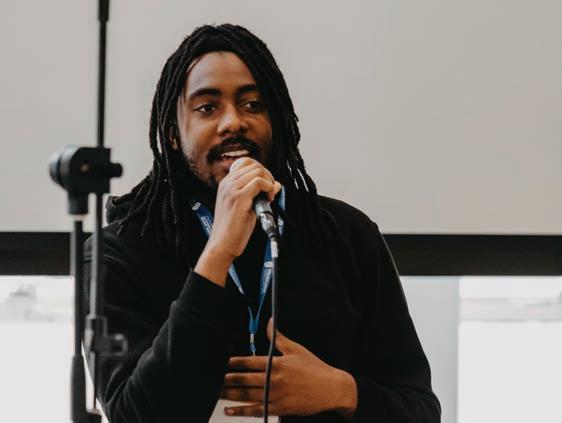
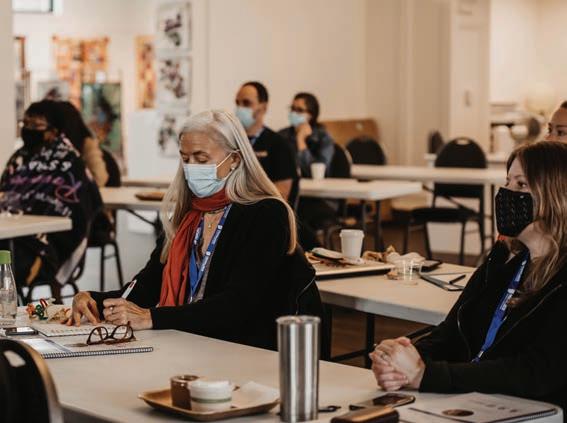

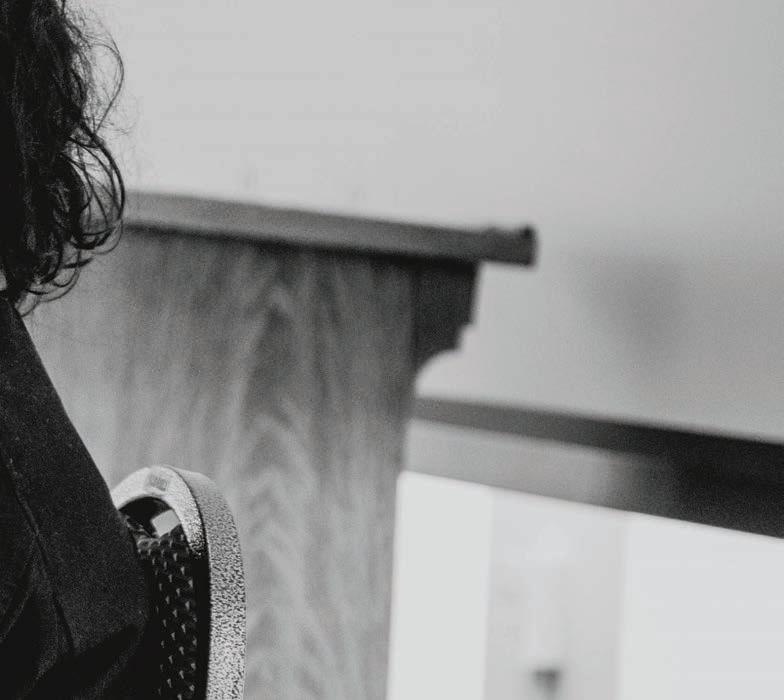
“WE’RE
WE’RE
"Indiana is indeed an entrepreneurial state! I have the privilege of seeing innovation firsthand at my job and I am awed by the level of creativity and innovation in our state. We need to continue to enable innovators, create more pathways for our young people to be entrepreneurial, help aspiring entrepreneurs find resources, and increase access to capital for all."
 TITI OBASANYA , Entrepreneur-in-Residence, Elevate Ventures
INDIANA ECONOMIC DEVELOPMENT CORP
TITI OBASANYA , Entrepreneur-in-Residence, Elevate Ventures
INDIANA ECONOMIC DEVELOPMENT CORP
RISE–Regional Innovation & Startup Education–can be found at nine different Ivy Tech campuses or at 60 high schools across the state. It’s great for anyone in the idea stage who would like to systematically work to launch over the course of one school year.
— IRIS HAMMEL, SENIOR VICE PRESIDENT, GARATONI FAMILY FOUNDATIONAt ideation, I recommend participating in the Firestarter program run at Westgate by Samantha Nelson. It’s a great program to stress-test ideas. From there, when they’re more at the pre-seed stage, I encourage them to participate in our own Mill Cohorts program. It helps get them ready to apply for programs like gBETA and really accelerate their growth. This summer we ran a program for collegiate founders at the pre-seed level called Startup Summer — it was a paid internship at The Mill where these founders got to work on their startup in our space over eight weeks. We provided a framework of programming and a demo day for them. Additionally, I connect entrepreneurs to founders at The Mill for support and as many mentors and advisors specific to their needs as possible.
— ANDY LEHMAN, HEAD OF ACCELERATOR PROGRAMMING, THE MILL
Bunker Labs, Veterans In Residence program.
—COURTNEY ZAUGG, ECONOMIC DEVELOPER, SERIAL ENTREPRENEUR
Indiana has a variety of programs to support entrepreneurs. For women entrepreneurs, I highly recommend StartUp Ladies. They provide one-on-one mentoring to regular educational programs. For tech business owners, I suggest being involved with TechPoint and Venture Club of Indiana.
The Indiana Small Business Development Center as well as our local Revolving Loan Fund. —BRIANNE JERRELS, EXECUTIVE DIRECTOR, GREENE COUNTY ECONOMIC DEVELOPMENT CORPORATION
My business partner, Michael Cloran, co-authored the book Titanic Effect with Todd and Kim Saxton. I give away free copies to many first-time founders.
—MICHAEL KELLY, MANAGING PARTNER, DEVELOPERTOWN
Product Development for Non-Technical Founders https://elevateventures.com/productdevelopment-for-non-technical-founders/
—DR. LANDON YOUNG, EXECUTIVE DIRECTOR OF ENTREPRENEURIAL PROGRAMMING, ELEVATE VENTURES
AG+BIO+SCIENCE podcast episode 150 https://agrinovusindiana.com/2021/11/22/podcastgbeta-agbioscience-a-really-impressive-groupof-founders/
—DOUG APPLEGATE, INDIANA DIRECTOR, GENER8TOR
Is there an expertise-ondemand or help-on-demand resource in your community for business founders, entrepreneurs, or aspiring entrepreneurs?
SCORE, WBC, and Legal Line at https://www.allencountybar.org/legal-line/ —LESLEE HILL, WEOC WOMEN’S BUSINESS CENTER PROGRAM DIRECTOR, THE NORTHEAST INDIANA INNOVATION CENTER
Endeavor has a free web platform called Edge - https://edge.endeavor.org/. It holds all of our resources, recommendations, information, and best practices on raising capital in Middle America across all funding stages.
-JAKE BUDLER, MANAGER OF ENTREPRENEUR SELECTION & GROWTH, ENDEAVOR
MatchBOX Office Hours: legal, HR, accounting, shared services, etc. https://mbx.studio/officehours
—AMANDA FINDLAY, MANAGING DIRECTOR, MATCHBOX COWORKING STUDIO
We have a one-stop shop for small businesses or new businesses, staffed by SCORE mentors, ISBDC, Chamber and our Velocities ecosystem manager. There is almost always someone ready to help at the Columbus Chamber.
A business isn’t a business without customers. What do you wish more entrepreneurs knew about validating their product/service with their earliest customers?
Customer validation is EVERYTHING! Do that EARLY and OFTEN! Without proven, clearly identified customers who are happy to spend money with your business, and bring friends/family to do the same, there is no business—there is just an idea (and likely debt and headaches).
—EMILY M. HAWK, GENERAL COUNSEL/BUSINESS COACH, INDY CHAMBER/BOI
Focus on customer problems that are valuable and that not a lot of other people are solving.
—ROB WILEY, CEO, EDGE MENTORING
—CINDY FREY, PRESIDENT COLUMBUS AREA CHAMBER OF COMMERCE
Is there one piece of advice you find yourself repeatedly giving to aspiring entrepreneurs?
Ask for help, it’s out there.
—HEATHER ENNIS, PRESIDENT & CEO NWI FORUM
What is a local resource or program that you recommend to business founders or aspiring entrepreneurs?
Have you written an entrepreneurship-related article, blog, or done a podcast that we may highlight?
The overarching issue that we’re looking to solve is bridging the health/wealth divide.''
Many of us have loose ideas floating around in our heads, the kind of "what if” notions that get jotted down in a notebook or hastily dictated into a voice memo, only to languish. Nimish Bhat’s idea wasn’t one of those.
OmegaSkin’s founder and CEO, who’s entering her sophomore year at the Kelley School of Business at Indiana University, is developing a “biological band-aid” to provide affordable and effective treatment for burns and wounds, using skin cells from invasive fish species. This incredible concept started as just a few words, tucked away in the Notes app on her phone.
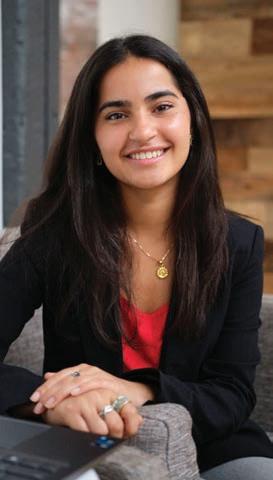

“I wanted to draw a line between two problems,” she explains. “On one hand, you have the health/wealth divide that impacts wellness for people in lower-income areas. And on the other, there’s Asian carp.” These fish, originally imported to the U.S. to help aquaculture and wastewater facilities keep retention ponds clean, have become something of a menace. Using their inadvertent abundance to heal human wounds is a stroke of genius.
Now in the R&D/grantseeking stage, Bhat is already setting her sights for OmegaSkin higher. “The overarching issue that we’re looking to solve is bridging the health/wealth divide,” Bhat says. “Especially those who fall in the gap between not being far enough below the poverty line to receive help, but also not far enough above it to be able to sustain on their own.”
With obvious intelligence, contagious enthusiasm, and a dynamite idea, Bhat is enjoying a bounty of support. She heartily thanks her Indiana Small Business Development Center (SBDC) advisor, and brims with praise for The STARTedUP Foundation's Innovate with IN Competition, whose help has been “immeasurable in supplying the network and connections you need to move something like this forward.”
But she reserves a special thanks to her parents, who have given her the unending encouragement — and helpful pushes at opportune moments — needed to continue realizing each step in her dream. Surely they, like the rest of us, are wondering what else might be buried in her Notes app, just waiting to become a reality.
I thought it would be helpful to find a tutor at my own high school but no resources existed. That is when I started thinking about Tutor Us.''
So Llyod turned a school assignment into a solution. In 2022, he founded Tutor Us, an app that helps high school students find the right in-school peer tutor for their learning needs—quickly and at no cost.
“After moving here from Mexico, I was having problems in my English class since I did not understand or speak the language fluently," says Lloyd. "I thought it would be helpful to find a tutor at my own high school but no resources existed. That is when I started thinking about Tutor Us.”

When asked to design a business plan in his entrepreneurship class, Lloyd developed the Tutor Us concept. Lloyd credits his teacher, John Moore, with coaching him toward success. Expanding on the initial business plan, Lloyd has won multiple entrepreneurship competitions, including the Westfield Chamber of Commerce Shark Tank, the Innovate WithIN State Finals, and won best Latin Start Up competition.

Tutor Us helps struggling students with various subject areas and has the added benefit of bringing classmates together. Rather than having an adult tutor, users learn from peers who have taken the same classes and done well. The app is free for all users, and student tutors are "paid" in service hours that they can include on college applications.
Passionate about making a difference in the high school experience, Lloyd developed Tutor Us to help others after his own struggles. Lloyd hopes to introduce Tutor Us to more high schools, and to inspire other Hispanic people who come to the U.S. to turn their ideas into businesses.
Tutor Us Westfield High School student Liam Lloyd needed help learning English and saw classmates struggling as well.
"LLOYD HOPES TO INTRODUCE TUTOR US TO MORE HIGH SCHOOLS, AND TO INSPIRE OTHER HISPANIC PEOPLE WHO COME TO THE U.S. TO TURN THEIR IDEAS INTO BUSINESSES."
Indiana
At the age of 17, he was able to launch his first software company. “Don opened my eyes to what’s possible when you understand how to connect value to people in your community,” Stone says. “This experience taught me a ton and made me want to understand how we could bring the type of education that Don was passionate about to others.”
While still a student at Indiana University, Stone approached his former teacher with the idea of developing a course design for state high school educators and the two launched the non-profit STARTedUp Foundation to help students develop an entrepreneurial mindset. Through a partnership with the Indiana Economic Development Corp (IEDC), the organization eventually absorbed the Innovate Within Pitch competition. “When student entrepreneurs see problems as opportunities and recognize the importance of quickly picking themselves up upon encountering roadblocks with their businesses, they prepare themselves to begin their journey down the road to having a successful business,” says Daniel Abbott, Innovation & Entrepreneurship Education Manager, IEDC. “It is crucial for young minds to develop curiosity, create value and most importantly build connections to get their business successfully to the finish line.”
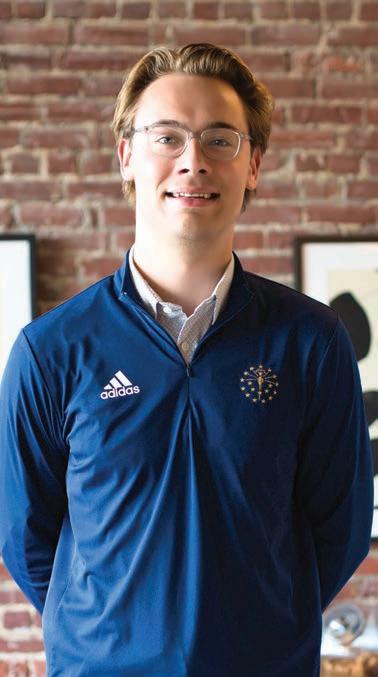
Stone has seen student entrepreneur ideas go through acquisitions, obtain venture capital funding, and expand into international sales. Through bi-partisan support from state and local governments, schools are becoming more progressive and forward-thinking in regards to innovation and entrepreneurship because they recognize there are opportunities for students to excel. “We’re testing an innovation curriculum that’s centered on community connectedness,” Stone says. “We’re empowering educators to build those connections in order to get their students involved not just in case studies, but by having them make an economic impact.”
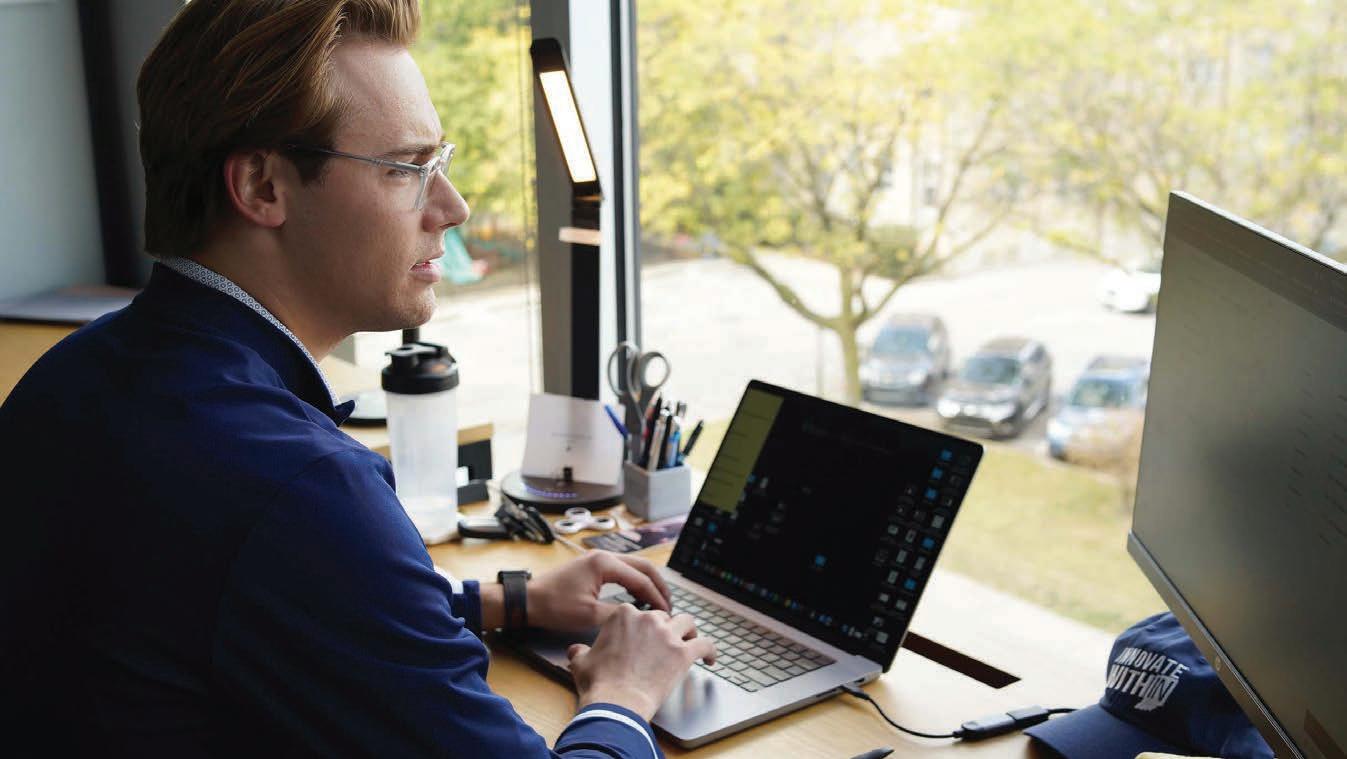
We’re empowering educators to build those connections in order to get their students involved not just in case studies, but by having them make an economic impact.”
As a student at Noblesville High School, Hunter Stone learned how to develop a business goal and connect it to the local community from teacher Don Wettrick.
Entrepreneurial MindsetHUNTER STONE
Verility was established in 2018 to develop the technology and is close to going to market, having recently closed a $3.5 million Series A funding round and an additional $100,000 through the Purdue AgCelerator in January 2022.''
Liane Hart, CEO and co-founder of Verility Inc., wants to make it easier to find out if livestock are ready to breed. Because she understands the costs of inaccuracy.
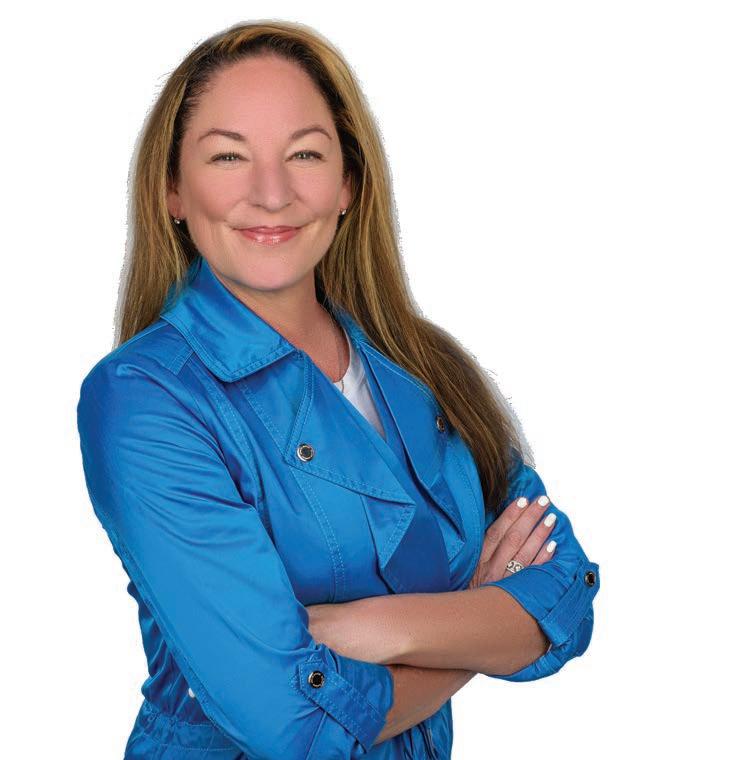
Hart, who has worked in animal breeding and genetics all her entire career, also breeds Thoroughbred Racehorses. More than once she’s driven an allegedly ovulating mare to Kentucky for a rendezvous with a thoroughbred stud, only to find out later that the fertility tests were wrong, leading to a wasted trip.

“There are huge cost implications to this,” Hart says. “As a fellow breeder, I understand the pain [breeders] can feel in these situations.”
That pain is much worse for farmers raising pigs, beef, or dairy cattle on an industrial scale. Current methods for determining livestock fertility are expensive, slow, and can be inaccurate, leading to losses of potential revenue and a diminished food supply.
Hart wants to solve that problem with a new system called FertileEyez. Instead of running a fertility test by a large, expensive machine or in a lab, Fertile-Eyez uses an affordable handheld device coupled with image recognition and AI technology (developed by Brigham & Women’s Hospital in Boston) to provide a detailed fertility report that can be reviewed on a cell phone.
“The technology can take a biological sample read it, and provide results in seconds,” Hart says.
The technology could vastly increase the success rate of breeding programs. Verility was established in 2018 to develop the technology and is close to going to market, having recently closed a $3.5 million Series A funding round and an additional $100,000 through the Purdue AgCelerator in January 2022. While Verility will enter the swine market first, it is just the beginning. Verility wants to apply Fertile-Eyez to cattle, horses, dogs, cats, and perhaps even fish.".
And because the technology was originally developed for potential at-home sperm quality tests for couples struggling with infertility, humans may stand to benefit as well some day.
LIANE HART
"CURRENT METHODS FOR DETERMINING LIVESTOCK FERTILITY ARE EXPENSIVE, SLOW, AND CAN BE INACCURATE, LEADING TO LOSSES OF POTENTIAL REVENUE AND A DIMINISHED FOOD SUPPLY. HART WANTS TO solve THAT PROBLEM WITH A NEW SYSTEM CALLED FERTILE-EYEZ."
Central Indiana
I’m very passionate about students having access to these opportunities. I believe that regardless of gender, race, or socioeconomic status, they should have the opportunity to choose a STEM career.”
FIRST Indiana Robotics
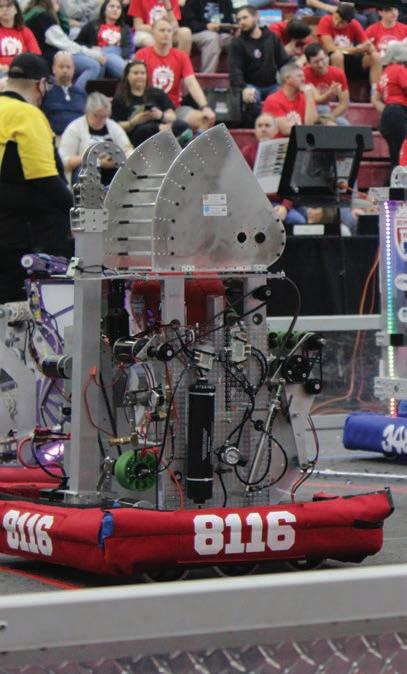
Many see a big future for Indiana in robotics, but Renee Becker-Blau sees an equally big future in the field for Indiana’s students.
As president of the nonprofit FIRST Indiana Robotics, she’s helped develop a roster of programs designed to guide young Hoosiers into STEM careers. The organization’s showpiece is its FIRST Robotics Competition, in which over 100 students from high schools across the state build and program four-foottall, 125-pound robots to play games or perform specific tasks. This year’s championship included 32 teams and drew 3,000 spectators.
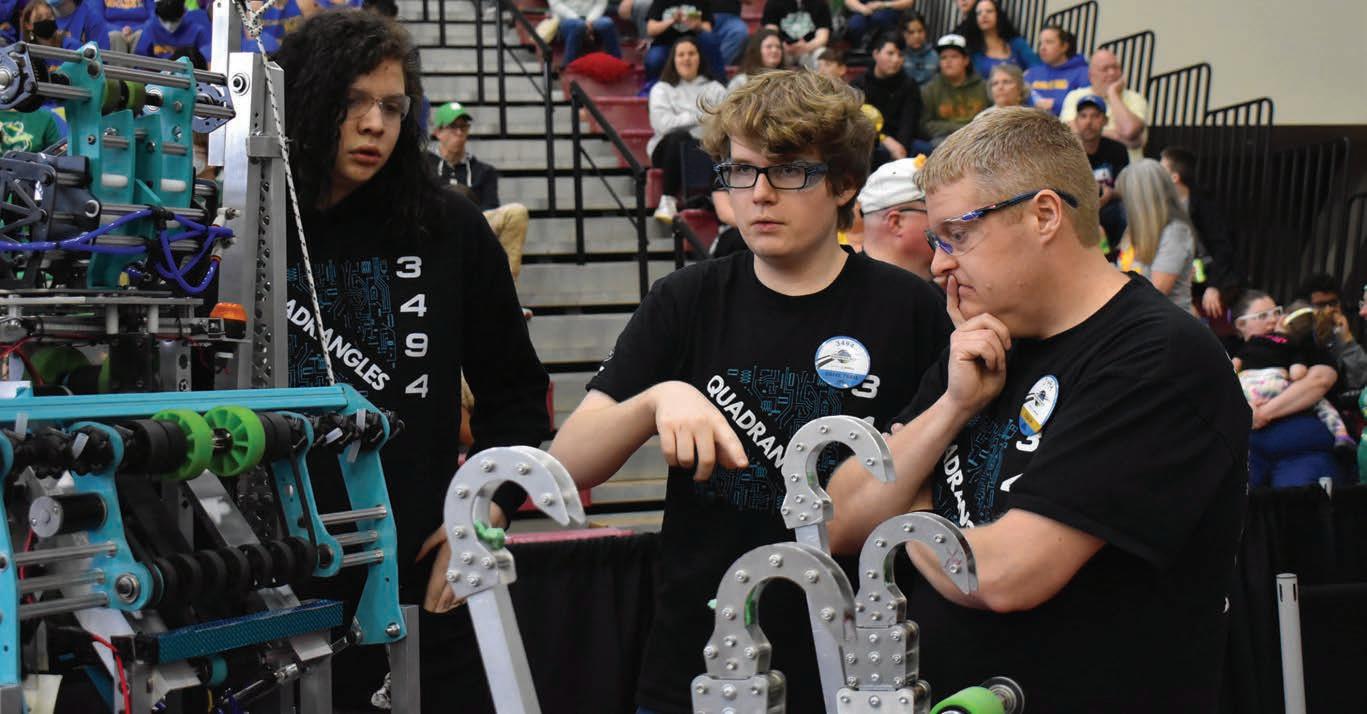
The robotics competitions are exciting, but they’re very much a means to an end—introducing STEM to kids.
“I’m very passionate about students having access to these opportunities,” Becker-Blau says. “I believe that regardless of gender, race, or socioeconomic status, they should have the opportunity to choose a STEM career.”
She got involved with FIRST Robotics (a national program) in 2003 as a member of her Wisconsin high school team. She then founded a FIRST alumni student group, and became President of FIRST Indiana Robotics in 2014. The Indiana chapter of FIRST emphasizes the development of teamwork, leadership skills, and entrepreneurship.
“We’re not just working on building robots,” Becker-Blau says. “We’re building a generation of leaders who will become, and lead, the future workforce.”
She wants to immerse children in robotics and entrepreneurship as early as possible. The organization’s FIRST Lego League is targeted at kids as young as four, while the FIRST Tech Challenge allows middle and high school students (guided by adult mentors) to design and build robots for the FIRST Robotics Competition. Youth not only make a robot, they also raise their own funds, design and market their team brand, and
do community outreach.
“They learn all of the skills necessary to succeed in entrepreneurship,” Becker-Blau says. “The technical skills, and the social and business aspects.”
Ideally, she also wants her program graduates to keep their skills in Indiana.
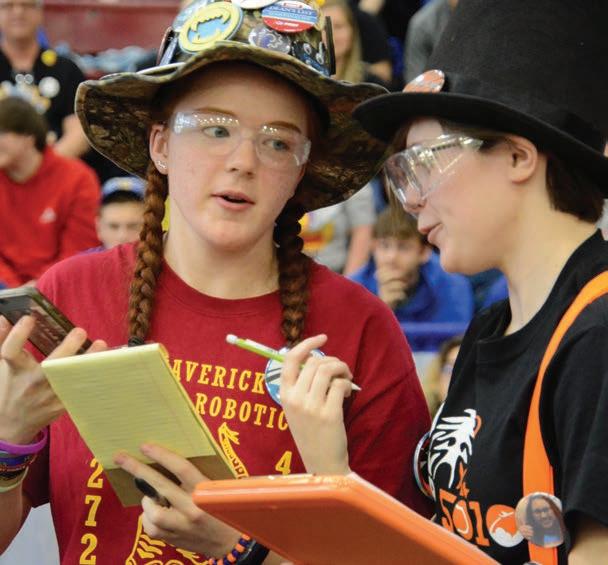


“I want them to understand that they don’t need to go to the west coast to find a booming technology hub,” Becker-Blau says. “They can find that right here.”
RENEE BECKER-BLAU“WE’RE NOT JUST WORKING ON BUILDING ROBOTS. WE’RE BUILDING A GENERATION OF leaders WHO WILL BECOME, AND LEAD, THE FUTURE WORKFORCE.”

Every Wednesday morning, aspiring entrepreneurs in 160 communities across the country stand in collaborative workspaces, conference rooms, and local restaurants to deliver what for many of them is the first pitch of their careers. It’s the beginning of an exhilarating, daunting entrepreneurial journey, but it’s a crucial first step in realizing dreams.
After their six-minute pitches, presenters take questions and receive feedback from the audience. The dialogue that follows can change the course of an entrepreneur’s life: through refinement of a concept, an introduction to a new collaborator, or a resource connection that will help bring an idea to life.
This is 1 Million Cups, a free nationwide, volunteerdriven program designed to educate, engage, and inspire entrepreneurs. Based on the notion that entrepreneurs discover solutions and engage with their communities over a million cups of coffee, the Ewing Marion Kauffman Foundation launched the 1 Million Cups network in 2012.
“1 Million Cups is by entrepreneurs, for entrepreneurs,” says Jason Williams, one of the leaders of the Northwest Indiana chapter. “We’re providing a place for people to share their stories and get help from the entrepreneurial community.”
Lorri Feldt, regional director of the Northwest Indiana Small Business Development Center, has been an organizer with the Northwest Indiana chapter since it started in 2016. “If you talk to presenters afterwards, they typically mention how valuable the feedback was and how it gave them an idea or connection they can run with,” Feldt says. “That’s what we want. We want the presenters to feel like, ‘wow, this is an important milestone.’”
“I always make notes when there’s something I can help a presenter out with,” Williams adds. “That’s the culture of 1 Million Cups: how can the community help you?”
Emily Edwards can attest to the power of 1 Million Cups. Three years ago, Edwards pitched her idea for Paradise Spreads, a line of organic, plant-based protein treats. “I was nervous at first, but 1 Million Cups is such an inviting environment,” Edwards remembers. “It was an opportunity to see what it’s like to present, reduce some of my fears, build relationships within that community, and grow.”
And grow she did. Edwards used the feedback from peers at 1 Million Cups to hone her pitch, finishing runner-up in The Purdue Northwest Big Sell competition and qualifying as a state finalist at the Elevate Nexus competition in 2022. She’s also successfully launched Emily’s Foods, the umbrella brand for Paradise Spreads.
Now Edwards is paying back the 1 Million Cups community, serving as a community organizer alongside Feldt and Williams. “It’s been great being able to expand the circle, connect with like-minded entrepreneurs in the region, and help others avoid the mistakes I made early on in my journey,” Edwards says.
Paradise Spreads is one of many success stories that have originated in the Northwest Indiana chapter of 1 Million Cups. Another is BNutty, a peanut butter company that started out selling to youth sports fundraisers and at farmers markets, is now producing over a million jars a year and is selling in 12 different countries.
“Entrepreneurialism really is palpable in Northwest Indiana,” says Williams. “You can feel it bubbling up throughout the region. We look at 1 Million Cups as one cog in the landscape as we’re building this entrepreneurship ecosystem in Indiana.”
“Starting a new business can be a lonely pursuit,” Feldt says. “Entrepreneurial support organizations are part of what helps people along the way. We let them know they’re not alone.”
As an entrepreneur, Jacob is focused on making space for future STEM graduates in their hometowns.''

American Evidence is a Vincennes-based software development company dedicated to making case management of evidence easier.
Lack of efficiency and a shortage of police officers called for an automated solution to the sensitive administrative task of processing evidence, from a swab of blood to surveillance recordings.
CEO and Founder Mike Jacob started American Evidence to improve efficiency for law enforcement, cyber labs, prosecutors, and crime labs—with law enforcement as the target audience. Once evidence is collected, American Evidence’s product helps maintain the integrity and accessibility of it, in an easier, less costly fashion.

The advanced software allows officers to do more hands-on work and less desk work. American Evidence is “automating vast portions of the administrative process, creating accountability, and forcing policies and procedures to be followed,” Jacob said. When one potential customer saw a demo, he said: “we could use that for everything we do.”
The Midwest is known for agriculture and manufacturing, but Jacob wants to make it a place that exports homegrown tech solutions. Jacob is also the owner of Veritas Engineering Labs. He understands that tech can thrive in Indiana—and not only in urban centers, but in smaller rural communities as well.
“All too often, the high schoolers that graduate at the top of their classes go off to college and take STEM jobs in faraway places, never to return or contribute to the community that prepared them,” Jacob said. As an entrepreneur, Jacob is focused on making space for future STEM graduates in their hometowns.
“...TECH CAN thrive IN INDIANA—AND NOT ONLY IN URBAN CENTERS, BUT IN smaller rural COMMUNITIES, AS WELL.”
Aspire Group Media now has 30 clients with consistent needs.'' 2020
Trey Nebergall is a Ball State University freshman studying entrepreneurship and corporate innovation .
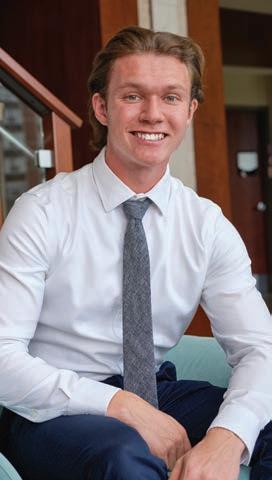
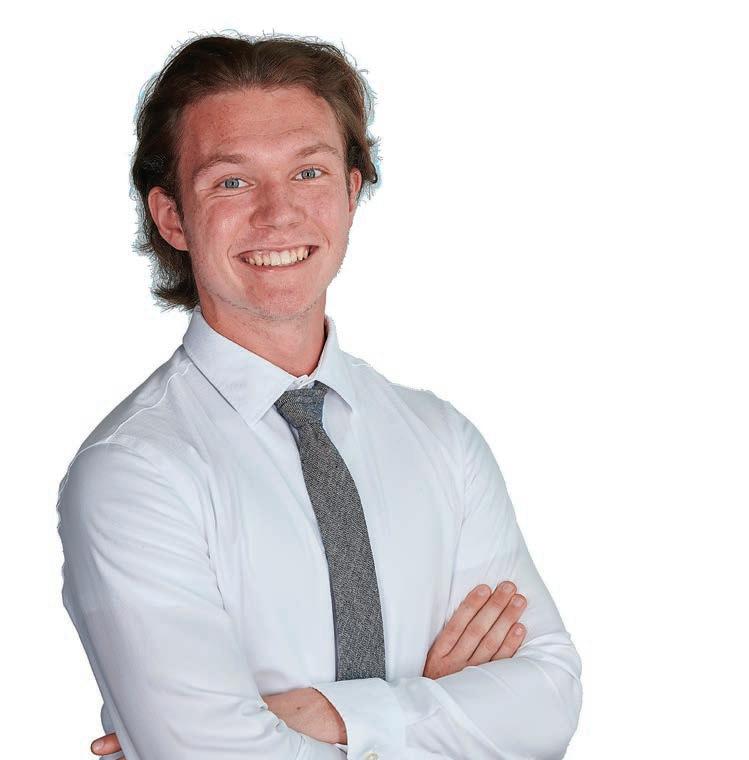
He’s no novice in the startup world, though. And he’s found his latest passion for entrepreneurship through real estate. His company, Aspire Group LLC, provides full service digital media for the real estate market under the name Aspire Group Media.
In 2020, Nebergall was entering his junior year of high school. Due to the COVID-19 shutdowns, he was no longer able to work at his part-time job. Already owning a drone, he figured he could make some money with it. Nebergall relied heavily on social media and YouTube to begin Aspire Group Media. And he entered two business plan competitions—the Maverick Challenge and Innovate WithIN high school business pitch competition. He also received some helpful business coaching from the Indiana Small Business Development Center (SBDC).
Aspire Group Media now has 30 clients with consistent needs. About half of clients seek him out for services—professional photography, video, drone, and 3D tours. He shoots the content himself, then sends it out to two editing and graphic design freelancers he works with.
Before Aspire Group LLC, Nebergall had started a few different businesses; none stuck. “I really found an interest in and a fit with the real estate space and the media side of things, and I think that’s what really allowed me to succeed and stay focused on this one opportunity for so long,” Nebergall said.
Leaving Columbus and beginning college in Muncie, Nebergall hopes to sell Aspire Group Media so he can focus on getting his newest venture up and running: Aspire Agent, helping buyers and sellers connect with agents.
Aspire Group LLC
"I REALLY FOUND AN INTEREST IN AND A FIT WITH THE real estate SPACE AND THE MEDIA SIDE OF THINGS, AND I THINK THAT’S WHAT REALLY ALLOWED ME TO SUCCEED AND stay focused ON THIS ONE OPPORTUNITY FOR SO LONG." Southern Indiana
Once a business or nonprofit decides to apply, it’s imperative to track budgets and outcomes. Ansley Fender believes this administrative load holds organizations back. She started Atlas Solutions in 2019 to streamline and simplify the process—and to begin the race to an AI solution for grant management.
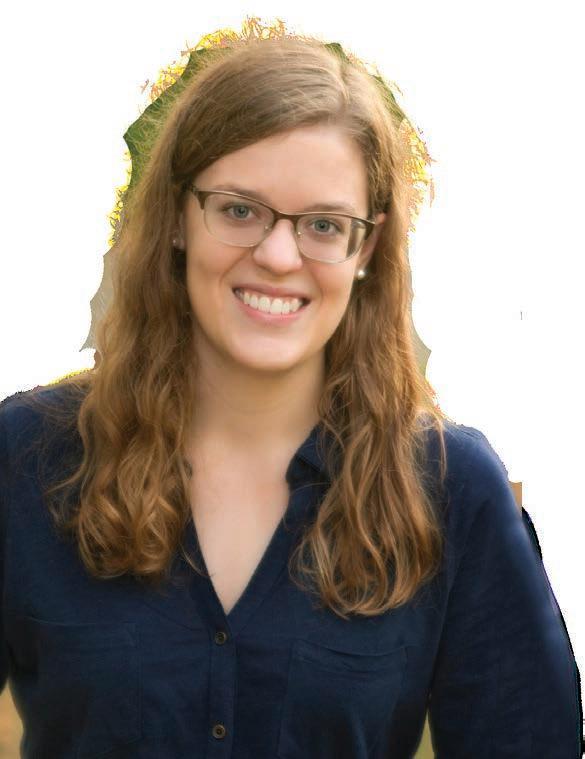
Fender was doing financial consulting and bookkeeping for nonprofits. She had those clients in mind when she got the idea for Atlas Solutions, a grant management software company that helps business owners and nonprofits organize their grant searching and grant management.
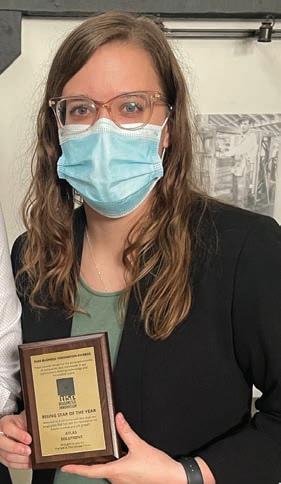
Fender is a team of one, and has made this business work because of her love of problem solving and understanding of the grant world. A huge resource for Fender was gener8tor, an accelerator that funds and guides entrepreneurs. NEXT Studios has helped troubleshoot marketing strategy, and Courtney Zaugg of Plaka + Associates has been an expert voice as well.
Fender is aiming to even the playing field for grassroots nonprofits and businesses. “Grants were never designed to keep a business or nonprofit operating—they’re best used to fund innovation,” she says. Simplifying grant management not only makes life easier for entrepreneurs and organizations in need of funding; it could also raise the chances of getting a grant, since organizations with the most time and money are typically able to land grants more easily.
Atlas Solutions is a useful product as well for those who do the giving. Grantmakers want to know their money is going to a financially sound entity. If grantmakers have data that show historical financial and performance outcomes, they can make unbiased decisions that will benefit innovation.
Grants are a gamble. Finding them involves searching many databases, assessing eligibility, and then analyzing alignment.
Grants were never designed to keep a business or nonprofit operating—they’re best used to fund innovation.''
Indiana
"IF GRANTMAKERS HAVE DATA THAT SHOW historical, financial, AND performance OUTCOMES, THEY CAN MAKE UNBIASED DECISIONS THAT WILL benefit INNOVATION."
We offer big-city, quality marketing services to small businesses who do not have the budgets large agencies require.''
Bo Turner is a woman of action. The 20something Terre Haute native co-founded a marketing agency in the midst of COVID-19 and is now planning to launch food truck parks throughout Indiana.
Turner, born in China and brought to the U.S. by adoptive parents when she was one year old, has always loved marketing. She studied it at Indiana State University (ISU), earning a bachelor’s degree in the subject and working in the marketing department. After a couple years, she felt restless. When she discovered a TikTok video that used the phrase “digital nomad,” Turner knew what she wanted to do: start something that would allow her to meet interesting people and explore new places.
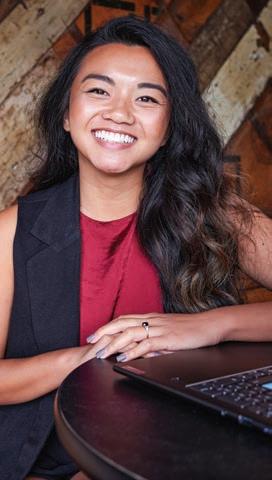

Turner soon connected with Courtney Cook, a graphic designer and fellow ISU graduate. The two realized they had complementary skills and, in 2020, co-launched BoCo Collective, a marketing agency specializing in tourism and food and beverage brands.
“Many of our clients are startups and, like BoCo Collective, women-owned businesses,” says Turner. “It is rewarding to see them succeed and say, ‘I want to expand.’ We offer big-city, quality marketing services to small businesses who do not have the budgets large agencies require.”
In addition to BoCo Collective, Turner is cooking up an outdoor dining concept called The Truckstop. Inspired by food truck parks in Austin, Texas and Portland, Oregon, The Truckstop will be a home base for five to 10 food trucks, providing communities and customers an opportunity to try different cuisines in family-friendly settings.
“I want to encourage people to experience culture through food,” says Turner, an avid traveler and foodie.
The first Truckstop is opening in Terre Haute in 2022, with a second location coming to Indianapolis in 2023. Turner plans on expanding to other locations and growing BoCo Collective ... while traveling and exploring as a digital nomad.
Indiana
TURNER KNEW WHAT SHE WANTED TO DO: start something THAT WOULD ALLOW HER TO MEET interesting people AND EXPLORE new places.

You can feel the “Columbus Way” as soon as you walk into the Columbus Area Chamber of Commerce. The immediate sense of community, connection, and innovation - that is the Columbus Way. Under Cindy Frey’s leadership, the Chamber has offered education, coaching, and mentoring to help founders reach their business goals, partnered with the Indiana Small Business Development Center and Service Core of Retired Executives (SCORE), and created a co-working space for founders. The Columbus Area Chamber of Commerce has become a one-stop-shop to access the ecosystem of support resources available to entrepreneurs in Bartholomew County.
Building upon local success, in 2018, Elevate Ventures, an early-stage venture capital firm, presented a unique opportunity for Columbus to partner with the City of Bloomington, its neighbor 37 miles to the west. The collaboration would marry Columbus’s manufacturing and engineering talents with Bloomington’s creative vibe. After successfully raising the funds for the partnership, the two communities formed Velocities to accelerate business growth and entrepreneurial success in their respective areas and the region.
Columbus consistently ranks in the Top 10 Best Performing Small Cities for high-tech GDP and job growth. The city’s entrepreneurs tend to be in the later stages of their careers with extensive business skills, client lists, and industry connections. While the Columbus business culture tends toward the cautious and tried-and-true, Bloomington leans into a more daring and youth-oriented approach, thanks in part to talent from Indiana University. The Velocities Region collaboration puts the Columbus Way into action and has led to tangible results.
“We have very innovative and advanced manufacturing companies in Columbus, and it is a hotbed for discovery and engineering talent, but we are more risk-averse,” says Frey. “Because Bloomington has many more risk-takers, it is a good fit for both of us to learn from one another, because our different styles help uncover what works best in various situations.”
Columbus’s investment in entrepreneurship didn’t stop there. When a 9,000-square-foot engine test facility became available at the Columbus airport, the Chamber joined local organizations in transforming it into the Columbus Propeller Community Innovation Center. The makerspace offers 3D printing and prototyping, laser cutters, woodworking, metalwork, and screen printing. The project was made possible as part of a READI project, which provided nearly $600,000 to sustain and staff the facility over the next three years.
The Columbus Chamber also has an initiative underway to support business founders of color, partnering with Cummins Cares to address racial inequality. Thanks to a $150,000 seed grant from Cummins, specifically for Black-owned businesses, the Chamber was able to deploy funding directly to 19 companies. An additional $160,000 was raised from various Chamber partners to assist local Hispanic business owners.
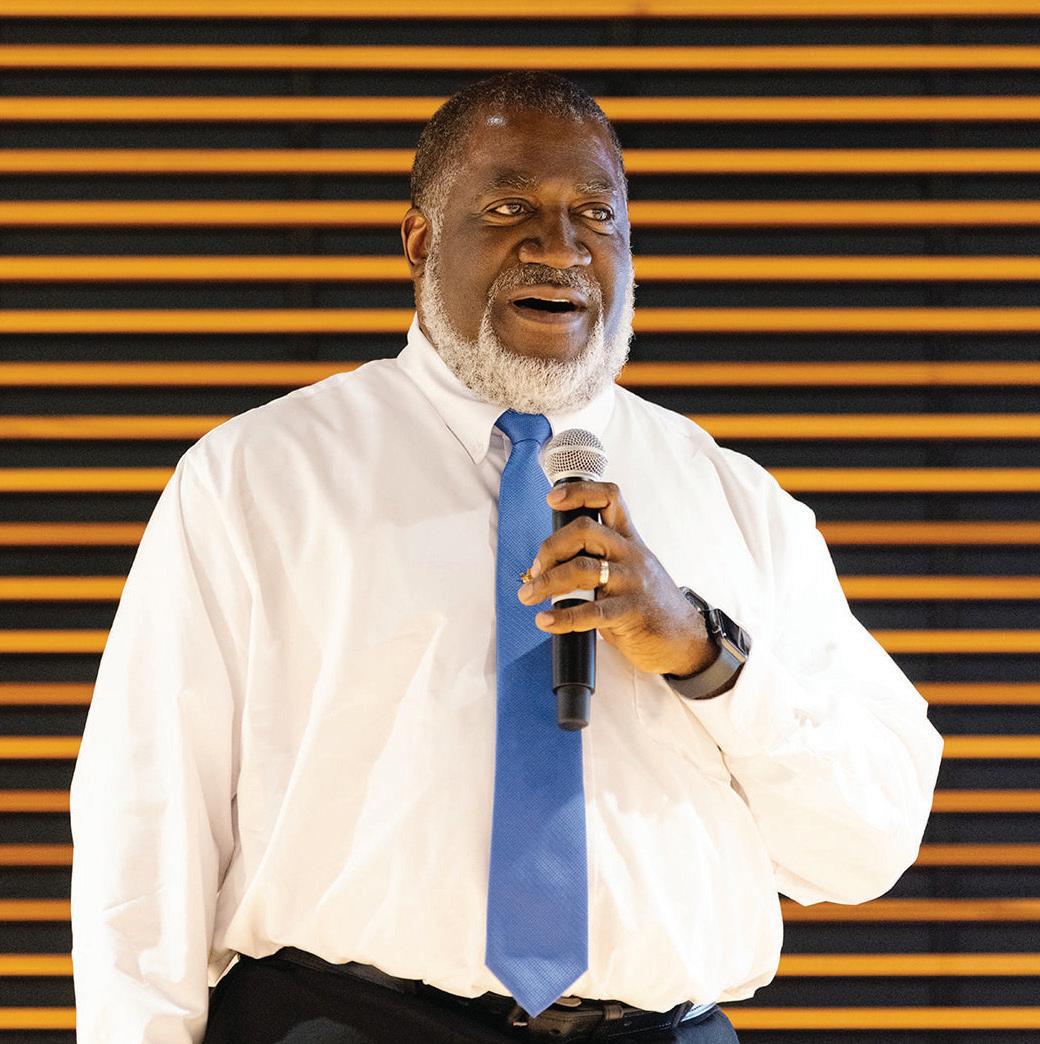
“When I talk about investing directly into Columbus and its entrepreneurial ecosystem, it’s about what we are spending in the city to drive entrepreneurship forward,” says Frey. When she took the leadership post at the Chamber, annual spending to support entrepreneurship was less than $50,000. Today, the budget is nearly triple that number and momentum continues to build as the Chamber and city see greater interest in business development initiatives. Frey considers the Velocities partnership the beginning of collaborative efforts in shaping the future of private enterprise in the region.
“Velocities helped us come together to connect entrepreneurs with great ideas to mentorship, programming, services, and early-stage capital,” says Frey. “We are using the resources we have to make a stronger and more productive entrepreneurial community.” That’s the power of the Columbus Way.
There are a lot of people who have barriers to entry into the workforce. You could put one of these [ factories] in a community and have a lot more people working and getting back into society.”
Solar panel factories are typically gigantic buildings that crank out massive amounts of product.
S outh Bend-based Crossroads Solar strives not only to produce green energy, but also to provide jobs for former inmates trying to restart their lives.
“I wouldn’t be doing this if it wasn’t for the social mission,” said Crossroads co-founder and President Patrick Regan.
Formerly a tenured professor of political science and peace studies at the University of Notre Dame, Regan became interested in re-entry programs when he taught classes at a local penal institution. He also wrote a book about the politics of green energy, and the two interests fused to form an unlikely idea: starting a solar panel factory staffed by (at present) 17 people re-entering society after incarceration.
The concept seems to be working. Crossroads started producing panels in October 2021, and now manufacturers over 100 solar panels a day. Their panels are in such high demand that they have had to turn away orders. Regan is already talking about franchising the concept to a group in San Diego.
“There are a lot of people who have barriers to entry into the workforce,” Regan said. “You could put one of these [factories] in a community and have a lot more people working and getting back into society.”
Regan, who had to borrow a considerable amount of money to start the business, knows he can’t match the per-panel prices of his larger competitors. But often he doesn’t need to. When solar panel installation companies present the Crossroads option to customers, and share the company’s backstory, that often seals the deal.
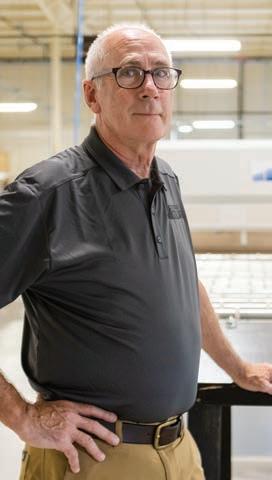
One customer was so enthralled that he actually stopped by the Crossroads factory. “He wanted to see that we were doing what we said we were doing,” Regan recalled. “He came in and he just said, ‘Wow, this is unbelievable. I’m getting your panels.’”
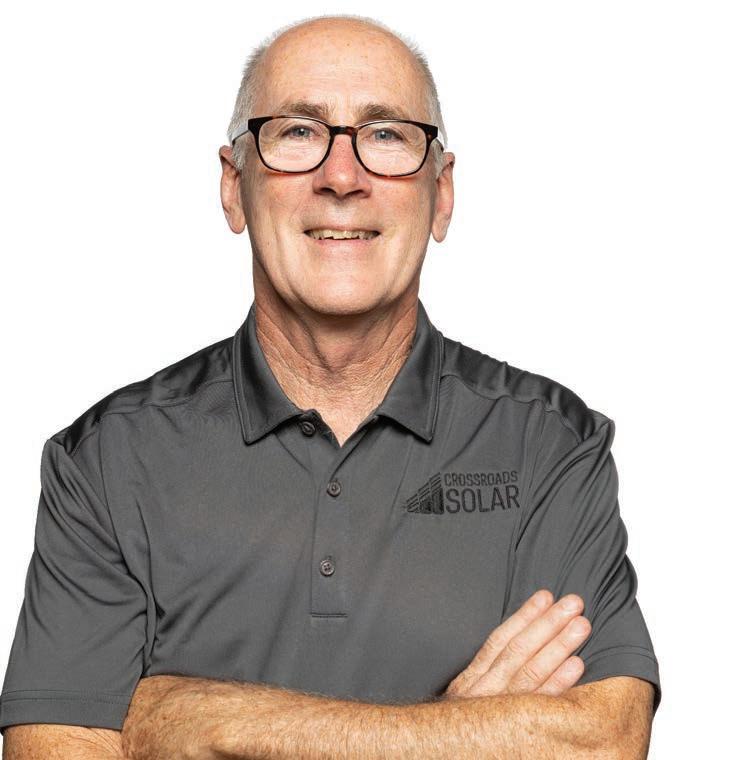
"I WOULDN’T BE DOING THIS IF IT WASN’T FOR THE social mission.”
Seeing a necessity within the Black community, she created Face Finances in 2020. “People know about tax preparers, but outside of that they don’t have knowledge in regard to the business side of things,” Warren says. “I saw a big need for financial literacy, where business owners get empowered to make informed decisions.”
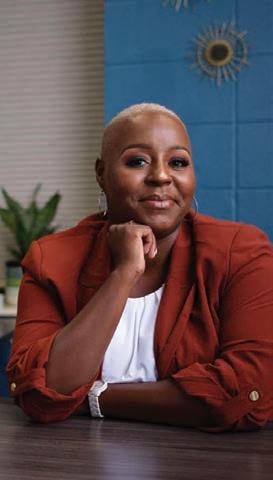
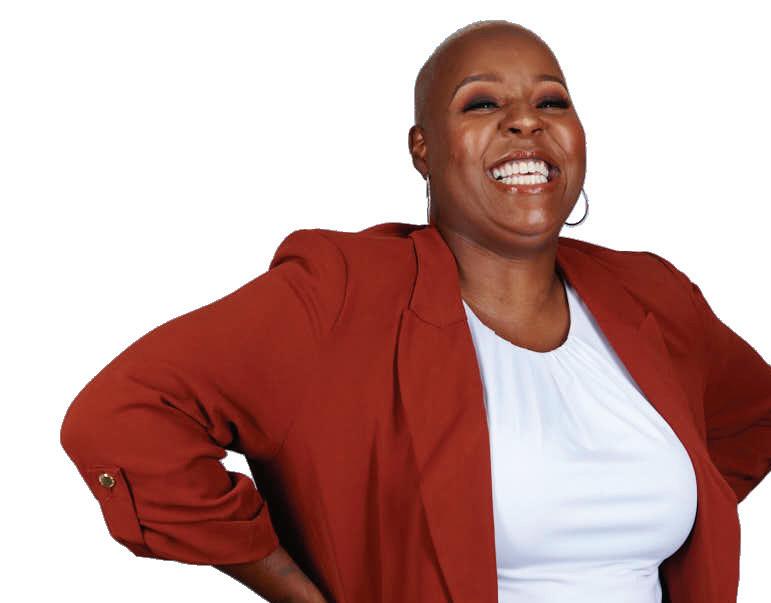
Face Finances gained momentum in May 2022 when Warren placed second at Pitch Feast and was awarded seed money aimed at business owners of color. She was then asked to speak at Pitch Feast’s Founder’s Group. A Butler University student felt so passionate about Warren’s mission, she asked to intern for the company. The Speak Easy, a coworking space, has also been a networking boon for Warren.
The fruits of Warren’s labor are clear. A single mom in a low-paying job came to her as a customer. After working with Face Finances for a short time, the client accumulated $1,000 in savings and became debt-free. “It’s a night and day story,” Warren says. “She now owns her own fitness business. Her credit score is going up and she was able to purchase a car.”
Warren’s next business goal is to establish a planner and journal to assist entrepreneurs in tracking information, and to offer local workshops. Her advice for future entrepreneurs is to be consistent and don’t fall in love with ideals. ”Focus on good customer service and products and you will be successful,” she says.
Accountant Monica Warren worked in a corporate role for 15 years, but always had entrepreneurial aspirations on her mind.
Focus on good customer service and products and you will be successful.''
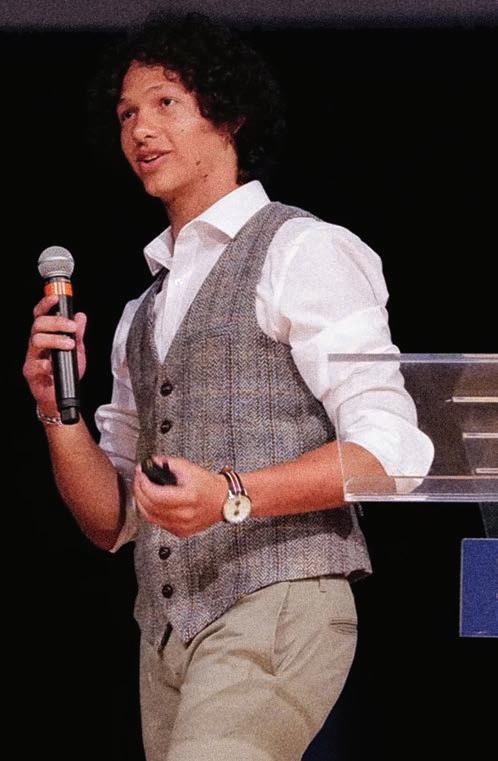
Anxiety and depression are fairly high, and a lot of times it stems from comparing yourself to other people and watching other people do stuff. So, you do stuff.”
It’s Round One of Innovate WithIN, a statewide competition that awards high school students $25,000 in scholarships and start-up resources to convert an idea, product or service into a reality.
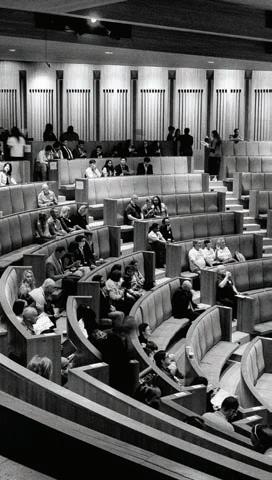
A student at Indianapolis Public Schools is making his pitch in a three-minute video. “I’ve been listening to people complain about things,” he says, “and I think I’m onto something.”

The pitch doesn’t advance to the next round, but Don Wettrick, founder and CEO of the STARTedUP Foundation, couldn’t be prouder of the high school student. “That’s why we do what we do,” Wettrick says. “He was listening, and he knew that there was an opportunity because people were complaining. He did not say ‘I’m going to make a million dollars.’ He said, ‘I’m going to solve a problem.’ I love that.”
The world is teeming with problems, and in Indiana, students are learning how to solve them before they graduate from high school, thanks to the STARTedUP Foundation. Wettrick is a former teacher who started an innovation and open-source learning class at Noblesville High School in 2014. The 21-year education veteran’s course laid the groundwork for one of Indiana’s most promising efforts to spur innovation and retain talent, Innovate WithIN.
Beginning in 2018 with just 100 students, Innovate WithIN blossomed to 2,300 students and dozens of teachers across the state in the 2021/2022 school year, and has a goal to quadruple in 2023. The format and approach are as attractive to teachers as they are to students, which is why the foundation and its innovation competition found a natural ally in the Indiana Department of Education (IDOE).
Central Indiana
“There are stories everywhere about the challenge of retaining teacher talent,” says IDOE Senior Director of Educator Talent Rebecca Estes, Ph.D., one of the foundation’s many champions. “STARTedUP gives teachers an opportunity to find passion in the classroom and step onto a career ladder. They are not just teaching in the classroom, but engaging in networks and finding like-minded individuals outside the classroom.”
Innovate WithIN is a winning initiative for Indiana, Estes says, because it supports teachers and prepares them to keep students engaged and passionate about solving problems. In the 2022 Innovate WithIN competition, all 10 finalists were from schools that had a teacher engaged as an Indiana Innovation Educator Fellow. The program thrives with enthusiastic teachers like Sarah Ackerman, a business and information technology teacher at Speedway Junior High School and Speedway High School.
Ackerman was among the first group of teachers to participate as an Indiana Innovation Educator Fellow. This summer she joined a group of Innovate WithIN alumni students and educators who went to Italy as part of a week-long talent exchange between STARTedUP and Italian race car manufacturer Dallara. The exchange, which involved other Italian companies as well, originated through Dallara Founder and President Gian Paolo Dallara, whose interests include improving education and innovation.
“Everything was consistent with relationships, building those with your students, clients and anybody else you come in contact with,” Ackerman says of the Italy experience. “That’s 100 percent my takeaway and how I’m going to use that in my classroom.” In 2022, Ackerman plans to partner with Dallara on projects that involve her students in the manufacturer’s Speedway facility.
To be clear, the STARTedUP Foundation isn’t specifically bent on fostering for-profit businesses; its focus is getting young people to see the world through a lens of innovation and connecting them with people and resources in their communities, according to Wettrick. “If you’re merely thinking about making money, you’re thinking of yourself, and not about solving problems for others,” he says.
Having an innovation mindset encourages students to complain less and do more, to be producers rather than consumers. It’s also a way to reverse the negative impact of social media. “How many hours are spent watching other people succeed?” he asks. “How many hours are spent TikToking? We’re not trying to say that we’re the answer to everything, but anxiety and depression are fairly high, and a lot of times it stems from comparing yourself to other people and watching other people do stuff. So, you do stuff.”
The STARTedUP Foundation offers content teachers can use in classrooms to help students build various skills, such as articulating a problem, identifying key performance indicators, and understanding how to form teams, expand networks or get questions answered. Some schools liked the effect on students and teachers so much that they asked for a semester-long curriculum. The foundation will offer a beta version of the expanded course during the 2022/2023 academic year.
While Wettrick is excited to see the program grow in popularity, what he really wants is for the annual Innovate WithIN pitch competition to retain its practical approach to innovation, leadership and problem-solving. “We’re not going to abandon the art of integration—the 10-minute lessons for the teacher who teaches home economics and can’t give it more time,” he says. “That’s why we really appreciate that the state is saying, ‘How can this live outside the classroom?’ [Indiana] has incubators, and co-working sites, and launch sites—and that’s great, but we have a tax-funded innovation center in every town in Indiana. If you give students time to work on a problem, it’s already paid for.”
In addition to its partnership with IDOE, the STARTedUP Foundation draws support from the Indiana Economic Development Corp (IEDC), and numerous corporations and individual donors who like what they see: an ecosystem that’s energizing a diverse mix of students from every part of the state. That includes rural communities in Southern Indiana and urban cities like Gary, Fort Wayne, and Indianapolis.
“If you want to progress past the regional competition,” Wettrick says, “you almost have to beat a team from Hobart. That’s tough to do.” Case in point: two 15-year-old girls from Hobart were concerned about fast fashion and its effect on the environment. Their winning Innovate WithIN pitch helped them start Patchables Dog Toys, a profitable company that employs people with disabilities and prevents clothing from ending up in landfills. The company uses 100 percent recycled fabrics to make toys for pets. The founders are dog lovers who recently presented their local Human Society with a donation for $1,000.
Wettrick notes that nine of the 10 finalists from the 2021 Innovate WithIN competition stayed in Indiana after graduating from high school. The only student to leave returned this summer and served as a summer intern at the STARTedUP Foundation.
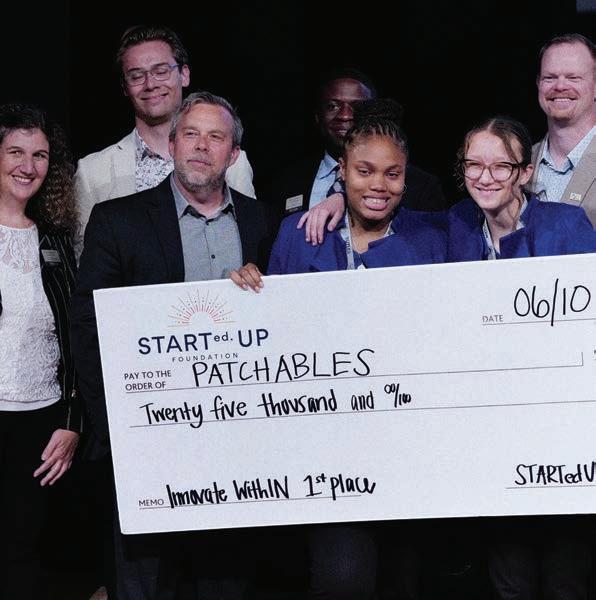
“IF YOU’RE MERELY THINKING ABOUT making money, YOU’RE THINKING OF YOURSELF, AND NOT ABOUT solving problems FOR OTHERS.”—Don Wettrick
I always liked that saying by naturalist John Burroughs: 'Leap and the net will appear.’ I did that, and I keep on doing it.''
Our lightning-fast ability to read genetic code has generated a vast quantity of genome sequence data that helps scientists create new products.
This abundance of data poses a common problem for scientists, according to Rajesh Perianayagam, Ph.D., a molecular geneticist with nearly three decades of research and development (R&D) experience in academia and the bio-agritech industry. “Even for the simplest task, it can take a long time to get information without an in-house platform,” says founder and CEO of Karyosoft, Rajesh Perianaysgam.

Karyosoft’s genesis came when Perianayagam began pondering how to make it easier for scientists to quickly gather insights from data. Perianayagam formed a team and built a secure platform for in-house genomics data management, analytics, and visualization.
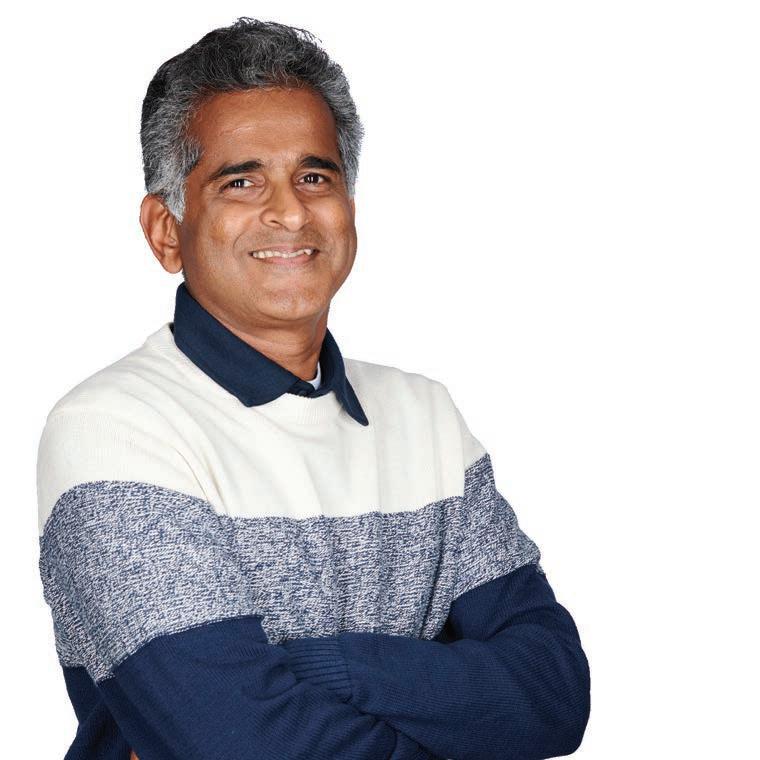
The company’s initial prototype was meant for microbial genomics data but Karyosoft pivoted after they identified a market among scientists doing genomic research on plants and animals. The team went back to the drawing board and redesigned an easy-to-use genomic software solution to accommodate those needs. “If we had not taken that turn, we would not be where we are today,” says Perianayagam. Karyosoft’s clients are primarily scientists who are passionate about improving R&D efficiency and accelerating innovation in agriculture, but he expects that the company will move toward solving global health problems for humans, too.
"Karyosoft has raised $300,000+ and received guidance from a myriad of resources like the Indiana Small Business Development Center (SBDC), Elevate Ventures, Purdue Ag-Celerator, gBETA Indiana, and more to help on their entrepreneurial journey. Perianayagam compares his path as an entrepreneur to hiking the Amazon rainforest, “I always liked that saying by naturalist John Burroughs: ‘Leap and the net will appear.’ I did that, and I keep on doing it. Every time I jump, I’ve been fortunate to find a net in the form of funding, mentoring, and customers."
"WE STARTED WITH AN IDEA THAT WOULD CREATE efficiency, BUT THE IDEA WAS ONLY HYPOTHETICAL UNTIL WE STARTED INTERVIEWING POTENTIAL CUSTOMERS."
Karyosoft Next-generation genome sequencing technology has brought improvements in nearly every aspect of life, from agriculture to healthcare.
Ramsdell moved his startup from Boston to Bloomington for two primary reasons - the entrepreneurial community and affordability.''
"Industry disruptor” is an accurate term to describe Kupros Inc, an early-stage startup in Loogootee.
Its all-metal, highly conductive copper filament prototype, Cu-29, will soon be shaking up the 3D-printed antenna and electronic market by offering 80 times more conductivity than filaments currently available. Cu-29 is not only more cost-effective, versatile, and efficient than other existing solutions. It can be embedded in plastic parts, woven into fibers, and produced using relatively inexpensive desktop printers.
“You don’t need a $250,000 printer to create a conductive circuit,” says Ian Ramsdell, founder and CEO of Kupros. “It creates the capability for innovation at a lower cost than what’s currently available.”
The Cu-29 filament, licensed from a Department of Defense national laboratory, is stirring up interest from the military and aerospace communities. Kupros is working on versions of the product that are radiation-resistant and able to function in space.
Ramsdell moved his startup from Boston to Bloomington for two primary reasons - the entrepreneurial community and affordability. Kupros was one of five startups accepted into the gBeta BloomingtonColumbus to connect with mentors and peers, and prepare to pitch investors. Radius Indiana helped Ramsdell secure a manufacturing facility, with room for growth, to launch his operations.
"With the recent economic downturn and increase in inflation, we would have only had nine months of runway if we built the company on the east coast. Since we worked with Radius Indiana and they helped us find the location in Loogootee, our runway for our initial investment extended out to 18 months"
Ramsdell, a disabled military veteran, plans to use his success to help other vets start their own companies. He wants to help as many as 1,000 vet-owned businesses over the next decade, by assembling a “business in a box” hardware and software package designed to allow smoother entry into additive manufacturing.
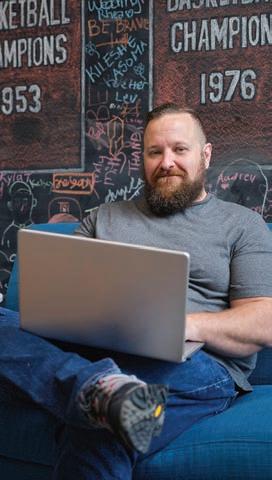
Says Ramsdell: “We’re a very young company, but we have big dreams.”
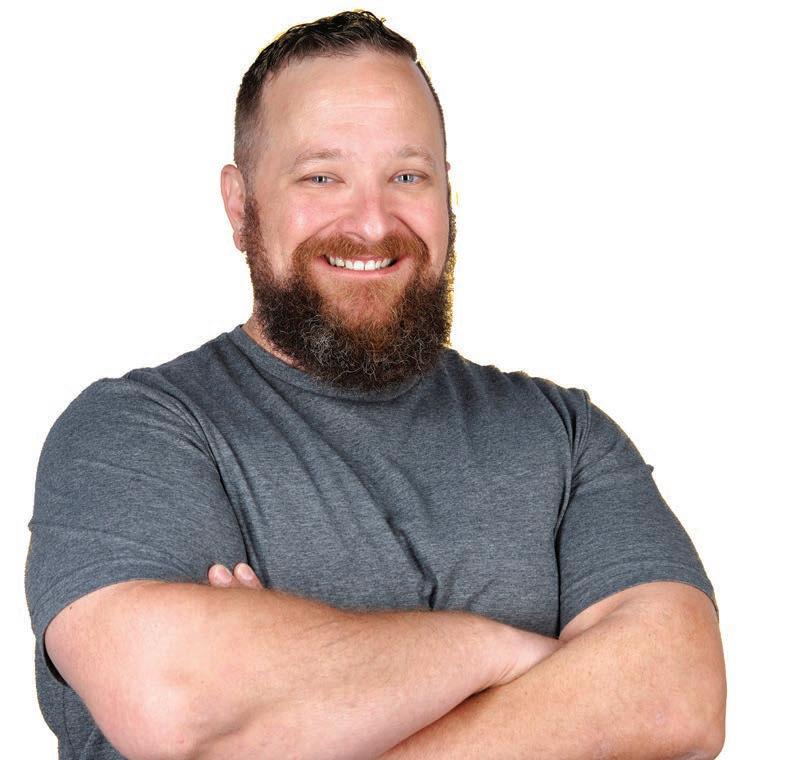
“WE’RE A VERY YOUNG COMPANY, BUT WE HAVE big DREAMS.”
Indiana
The company’s market is any industry that strives for supply chain improvements, sustainable design, and efficiency.”
For the last decade or so, manufacturers have been trying to learn how to scale and use graphene, a natural material discovered when two UK scientists applied the equivalent of Scotch tape to pencil lead.
Without its top layer, graphite becomes graphene: the thinnest compound known to humanity. It’s also light, stronger than steel, and a great conductor of heat.
But graphene remained an underdog until a team at Oklahoma State University (OSU) developed a patented technology that makes it possible to blend graphene with other substances to create various polymers.
Elkhart-native Haley Marie Keith was an MBA student at OSU who adopted the technology for her class project in 2016. Her subsequent research and analysis gave birth to MITO Material Solutions. The company’s market is any industry that strives for supply chain improvements, sustainable design, and efficiency.
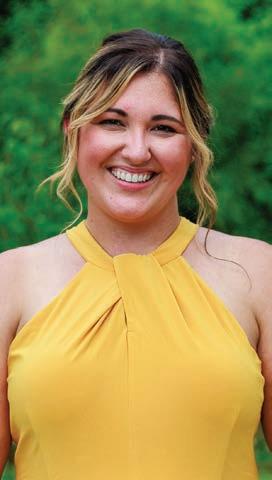
“Our process is pretty plug-and-play,” Keith says. “We can swap out graphene for different substances and use the process to make hybrid polymer modifiers for any industry. Hybrid composite polymers can transform processes at the raw material level and solve some of the biggest problems with graphene adoption. For the sake of our planet, we are redesigning a lot of materials to make sure they are longer-lasting.”
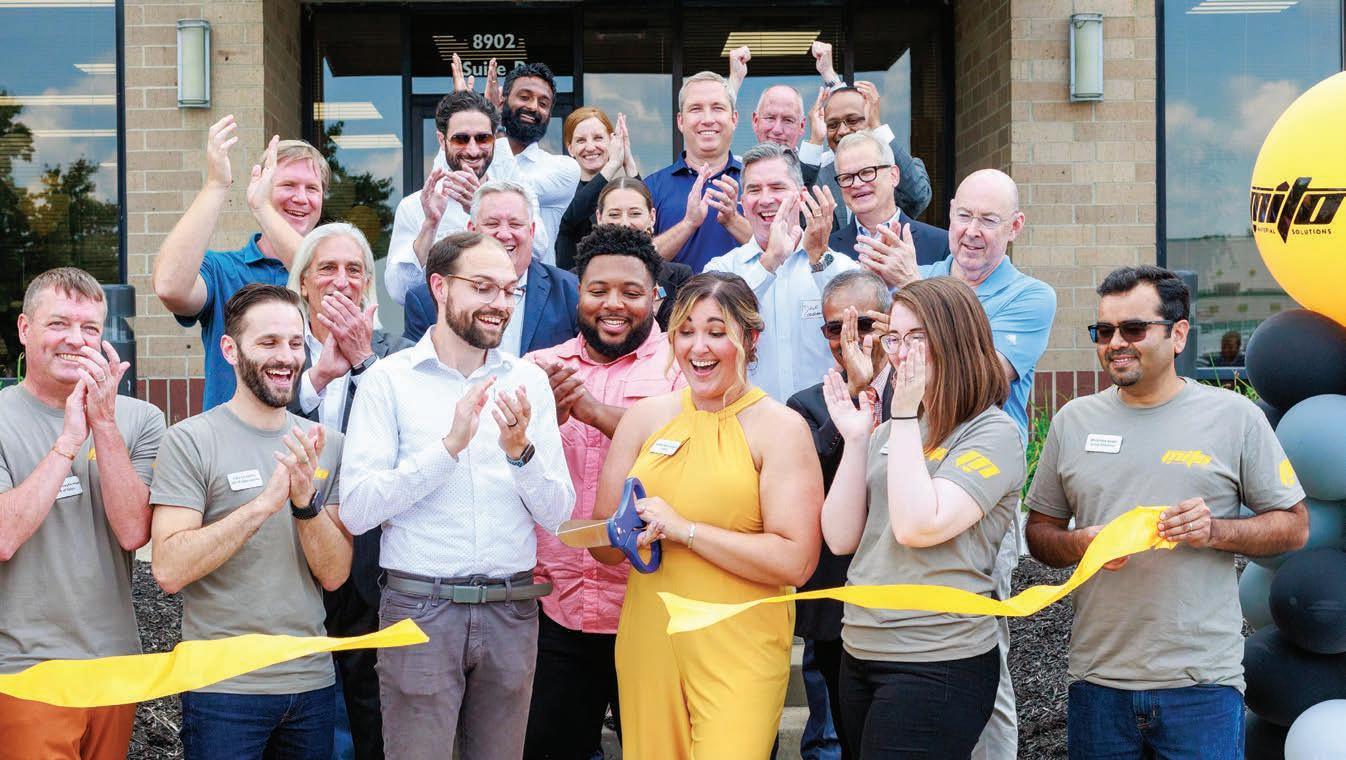
Haley and her husband Kevin, a mechanical engineer and now chief technology officer, started the company in Stillwater, Oklahoma with support from angel investors plus a $1.5 million Small Business Innovation Research grant from the National Science Foundation. The company relocated to Indianapolis after MITO Materials won several business and innovation awards and Haley was recruited for the inaugural class of The Heritage Group Accelerator powered by Techstars.
The Keiths were outliers in 2020, a year that made mere survival look heroic. They raised $1 million, made the Forbes 30 Under 30 list, and received a Conexus Indiana Rising 30 Award for leadership and innovation.
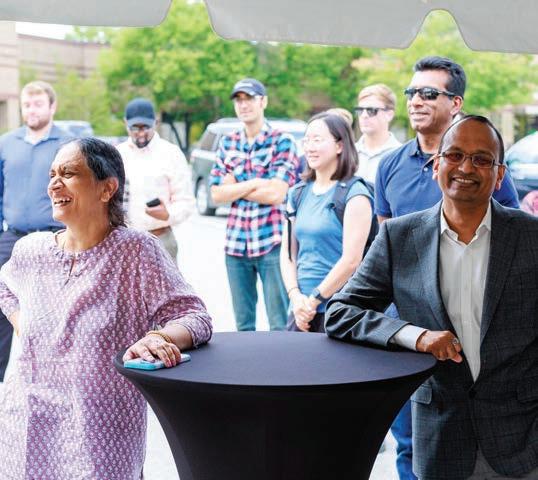
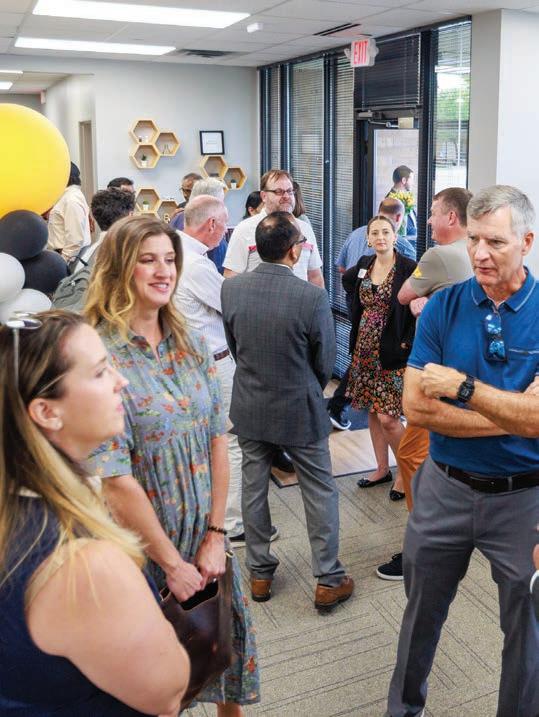
 HALEY MARIE KEITH
HALEY MARIE KEITH
Privately-held and family-owned, The Heritage Group has been in business for 90 years and lists more than 30 companies underneath its umbrella specializing in construction materials, environmental services, and specialty chemicals.
In 2018, the company created The Heritage Group Accelerator program to mentor and grow startup companies, primarily in the circular economy, hard tech, and SaaS for hard tech.
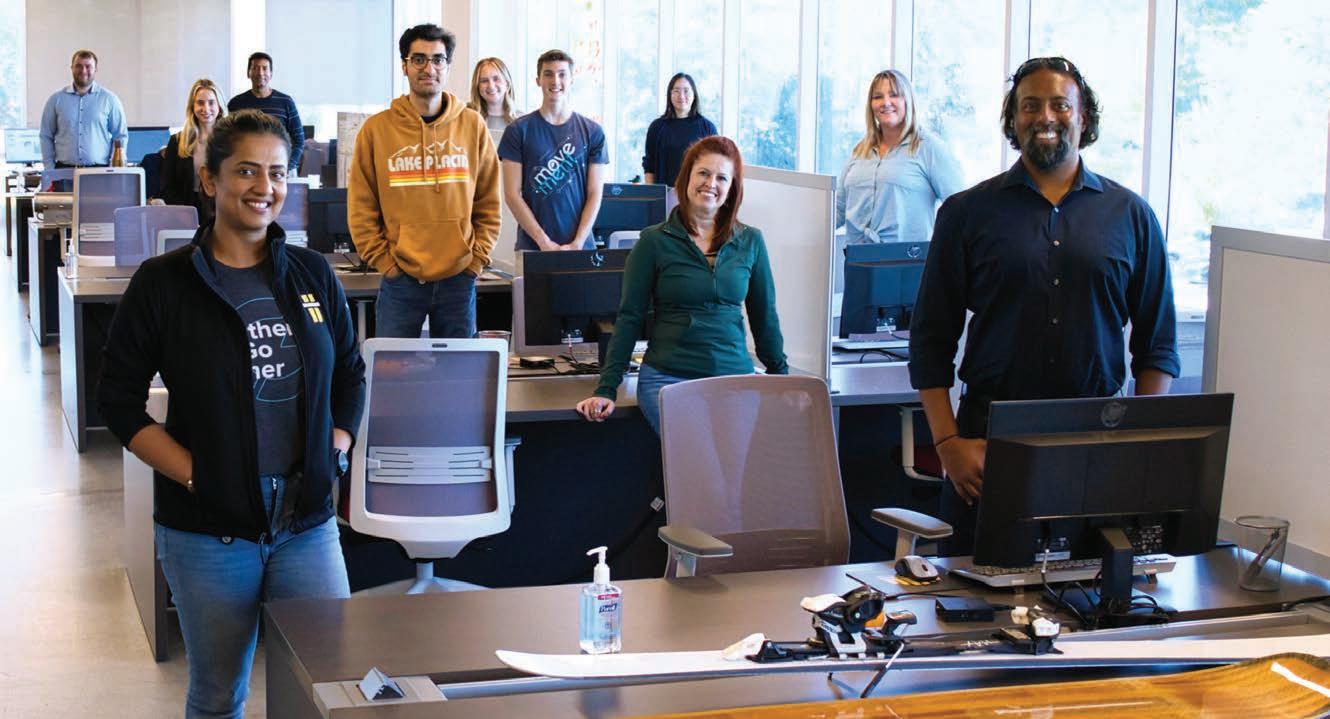
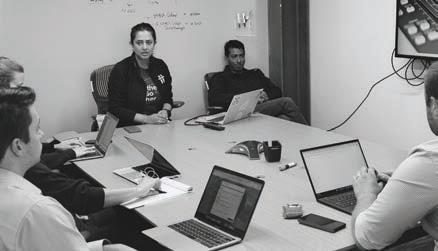
“Our goal is to make founders investible by the end of the program,” says Managing Director Nida Ansari. “We introduce them to investors and help in areas such as storytelling, financial modeling, scaling, and prototyping.”
After a rigorous selection process, the company’s venture capital group ultimately selects the program participants. Between six and ten founders from the U.S. and around the world are brought in for a 13-week program, where they have the opportunity to interact with scientists, analysts, and technicians, tour hard tech manufacturing companies, and access the company’s expansive internal and external network of mentors. “It’s a very symbiotic relationship for corporations to get a view into the leading edge of our verticals,” says Ansari. “They also have a unique opportunity to receive inspiration at a very micro and professional level.”
Data show that the first four cohorts of accelerator participants have collectively raised over $30 million in funding. The Heritage Group has become a brand ambassador for the state of Indiana and the unique ecosystem it has to offer. After participating in the Accelerator, companies Mito Materials and Ateios opted to relocate their headquarters from Oklahoma and California here to the Hoosier state. “That’s a testament to the expansion and resources that they’ve taken advantage of here,” says Ansari. “That in and of itself brings investment dollars, great minds, and great talent to the state of Indiana.”
“OUR GOAL IS TO MAKE FOUNDERS investible BY THE END OF THE PROGRAM. WE INTRODUCE THEM TO INVESTORS AND HELP IN AREAS SUCH AS STORYTELLING, FINANCIAL MODELING, SCALING, AND PROTOTYPING.”
The former communications professional was not in what he would call ideal shape. “I was overweight with several different health issues,” he says. Finding traditional medical paths to be unsuccessful, Wiese decided to research new wellness methods which eventually led to the creation of the Viesa method—a non-invasive approach he developed to aid those suffering from osteopathic and chronic pain conditions, focused on posture and gait analysis: structural qualities of the body that can lead to friction and inflammation when uncorrected.
After testing out the viability of his methods at home, and earning certifications in functional training and human biomechanics, Wiese decided to officially launch Move 2 Train.

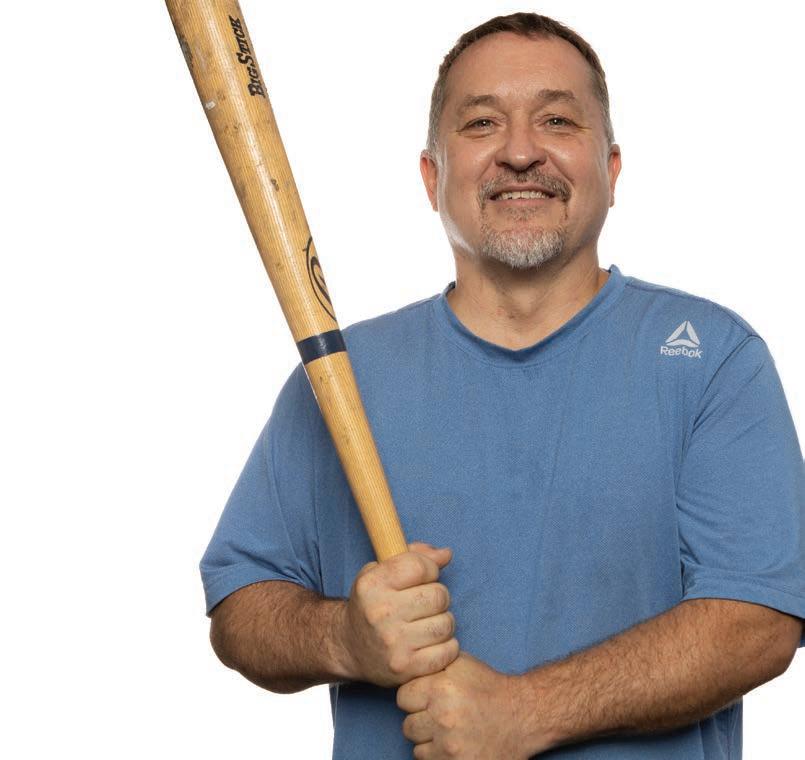
The COVID-19 pandemic hit a few years into operations, and it brought Move 2 Train grinding to a halt. Wiese says, “I dealt with depression through comfort eating which led to more aches and pains.” But a moment of clarity inspired him to get back to taking care of his health and his business. Following his recommitment, the Kokomo Tribune ran a story about Move 2 Train and support from the Hoosier Heartland Indiana Small Business Development Center (SBDC) both offered a major morale boost for Wiese.
Ultimately, though, it’s the human impact that keeps Wiese motivated. Being able to help an injured senior learn to stand up and sit down in a chair without pain, and assisting a woman who could not play with her small children due to body pain are two highlights in his career as a business owner. “That’s when I decided this is what I want to do,” says Wiese.
In his mid-30s, Christopher Wiese was at a personal crossroads.
Wiese decided to research new wellness methods which eventually led to the creation of the Viesa method...''

Plenty of people switch careers, but few make as radical a change as Emily D. Edwards. A social worker for 15 years, she left the field in 2018 to start her own food company, Paradise Spreads.
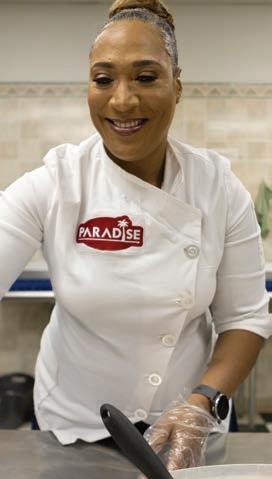
“I had gotten burned out with social work, but I still wanted to find a way to help people,” Edwards says.
She set out to make a kids’ treat that reminded her of the sweets her mom baked for her when she was a child, but was also healthy and nutritious. Edwards spent 18 months (first by herself, then with the help of the Department of Food Science at Purdue University) developing her fledgling company’s namesake product, Paradise Spread—a spread that’s plant-based, organic, preservative-free, and available in chocolate, strawberry, and caramel sea salt vanilla flavors. Sort of like Nutella, if Nutella were good for you.
Edwards financed her venture with personal savings, contributions from family members, and cash prizes from various entrepreneurial events. For instance, in July 2022, she won $20,000 in pre-seed money from Elevate Ventures’ Elevate Nexus Northern Indiana regional pitch competition.
Paradise Spread comes in eight-ounce jars and two-ounce snack packs, Paradise Snax Pax, and is available online and at select retailers around the country. Marketing the product is the bailiwick of her co-founder, David C. Glenn. Though still in its early stages, Paradise Spreads produced about $45,000 in revenue in 2021, and projects up to $85,000 for 2022. The company contributes to various social initiatives, and a percentage of profits go to help female military veterans.
Not that it’s all about money. It’s also about the joy of enthusiastic customer feedback. For instance, Edwards recently got a note from a mother whose child looked forward every day to his snack of apple slices dunked in Strawberry Paradise Spread.
“It was a delight to see that,” she says. “I think the biggest joy for me comes from little kids eating it, and asking for it more and more.”

I think the biggest joy for me comes from little kids eating it, and asking for it more and more.''
EMILY D. EDWARDS Northern Indiana
FROM DAY ONE, EDWARDS WANTED TO MAKE SOME SORT OF PRODUCT THAT WAS healthy, YET APPEALED TO CHILDREN.


The itch for entrepreneurship does not discriminate based on age. Isis Fleming and Kayla Davis, both sophomores at Hobart High School, founded and are running a sustainable business with a mission to make the world a better place. Their company, Patchables, uses recycled clothing to make fun toys for pups of all ages and sizes.
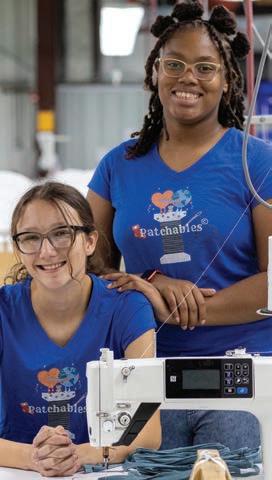
Fleming and Davis came up with the idea when they were preparing for the Innovate WithIN statewide pitch competition. They pivoted from their original concept twice, but pulled everything together only a few days before the end of the competition with help from their Indiana Small Business Development Center (SBDC) advisor. Even though they say the last-minute switch was exhausting, they view the whole process as a valuable learning experience.
“Once we agreed on Patchables, we were in love with it," says Davis. "The idea went from being a challenge to becoming a milestone."
Fleming and Davis are committed to reducing waste and pollution on the planet, and decreasing the unemployment rate among people living with a disability. They have teamed up with Merrillville-based TradeWinds Services, a nonprofit agency providing services for children of all abilities and adults with physical and developmental disabilities to help them reach their full potential.
TradeWinds has aided Davis and Fleming by acting as a resource and material supplier. The agency donates clothing scraps to Patchables to upcycle as dog toy stuffing.

“Everyone at TradeWinds is genuinely supportive of our cause," says Fleming. "We could feel it as soon as we walked in.”
The duo realized they needed even more raw material. Donation boxes did not work for myriad reasons, so they decided to peruse local garage sales and pitch their business idea to neighborhood sellers. People have loved the Patchables concept and donated enough merchandise from garage sales—be it a raggedy Chicago Bears winter scarf or worn out pajamas—to make over 1,500 dog toys. Their main source of sales has been the Hobart Summer Market. The next priority is transitioning the Patchables website to a more efficient e-commerce sales site, utilizing Shopify, and exploring the idea of adding cat toys to the company portfolio.
Everyone at TradeWinds is genuinely supportive of our cause. We could feel it as soon as we walked in.”
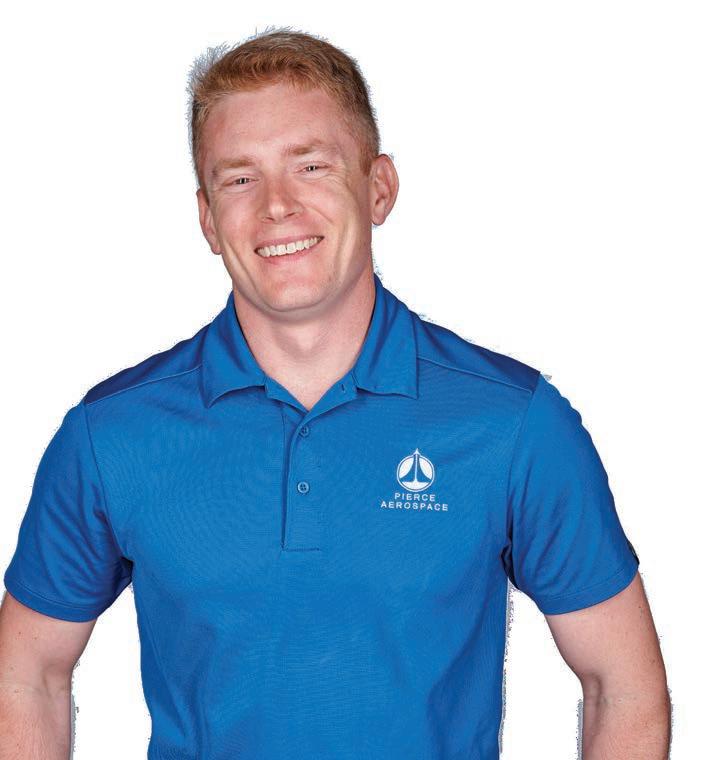
Five years from now, I'd like Pierce Aerospace to be the one providing this important infrastructure.''
And authorities need a way to keep track of them. Aaron Pierce, co-founder of Indianapolis-based Pierce Aerospace, thinks his company has the answer.
“We provide a means to identify who is piloting a drone,” says Pierce. “Think of it as a digital version of your car’s license plate.”
Funds from the U.S. Air Force help support the development of Pierce Aerospace’s Remote ID technology, which was nominated as the state's Innovation of the Year by Techpoint. Pierce Aerospace has worked with numerous agencies to refine its product, including the U.S. Air Force and the Federal Aviation Administration (FAA).
Pierce got the inspiration for the company straight out of grad school.
“I was helping IUPUI write policy and operations manuals for the university’s drone research center,” he says. "I saw the industry was taking off, pun intended, and decided to dive in.”
The company's work helped inform the industry standards and protocols that the FAA adopted for the drone Remote Identification rule. Pierce wants to take the lead in developing related software while offering important hardware, such as onboard equipment to broadcast a drone’s ID and ground-based monitors to pick up the data.
There is still a lot of work to be done before a full drone ID system can be deployed and integrated into airspace management. However, Pierce thinks his company will find military and civilian as well as national and international markets for its products and services. He plans to use the company's success to bootstrap more high-tech opportunities in Indiana.
“Five years from now, I'd like Pierce Aerospace to be the one providing this important infrastructure,” says Pierce. “I look forward to helping our partners, the FAA, and other agencies that provide security and management for our airspace.”
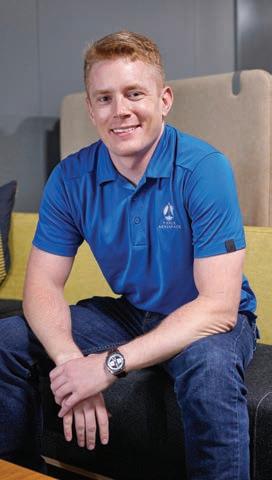
The number of drones in the sky—doing everything from delivering packages to monitoring agricultural yields—increases daily.
"I SAW THE INDUSTRY WAS TAKING OFF, PUN INTENDED, AND DECIDED TO dive IN.”
Indiana
Plantennas is a solution that helps them realize significant labor cost savings and increase supply chain transparency.''
Plantennas
Plantennas may be a startup, but co-founders Mont Handley and Alexandra (AJ) Moran are not new to entrepreneurship.
Handley, a previous “Shark Tank” winner, is also the entrepreneur-inresidence at the Purdue University Northwest (PNW) Commercialization and Manufacturing Excellence Center. Moran, a fellow agri-entrepreneur, also works at PNW as a clinical instructor of entrepreneurship. The two collaborated on projects for years before Handley approached Moran about Plantennas. The rest, as they say, is history.
Invented by Handley in 2020, Plantennas is an automated solution for plant propagation, life cycle inventory, and data management, based in Chesterton. Sensor-enabled, biodegradable fiber pots are embedded with Radio Frequency Identification (RFID), providing each plant with a unique ID number. Plants—much like merchandise from an online big box retailer— can then be categorized, handled, and tracked. As a result, consumers have more information about their plants and commercial horticulture operators can be more efficient and profitable. Hadley and Moran knew they had a winner when a nursery owner came up with more uses for the application than they themselves had come to pitch.
“There are second-, third-, and fourth-generation greenhouses closing up shop because they do not have automated systems and cannot afford the necessary labor,” says Moran. “Plantennas is a solution that helps them realize significant labor cost savings and increase supply chain transparency."
The company works with clients in Indiana and Illinois, but Handley and Moran have plans to expand. Next year, they want to help clients integrate more software and robotics into their operations. They also plan to raise Series A funding. Fortunately, they already have the support of Purdue University, AgriNovus Indiana, and Elevate Ventures.

“When you look at Mont and me, together, we have unique backgrounds and the combined experience it takes to be successful,” says Moran. “Now we are ready to use our knowledge and Plantennas to transform horticulture through automation."

My hope for other entrepreneurs is that no matter how little support they receive, they remember to believe it's possible.''
Laken Richardson knows fun. The former Etsypreneur first got into the "celebration business” by selling custom birthday party ensembles for children online.
When COVID-19 struck, thwarting families' ability to host large gatherings, she shifted into her next venture: Yard Carding Fairies, one of the first yard sign companies of its kind in the Terre Haute area.
Next, Richardson sold the business and started a selfie studio, Snapped, in a downtown storefront with the help of the West Central Indiana Small Business Development Center (SBDC). “People can’t believe this exists in Terre Haute,” says Richardson.
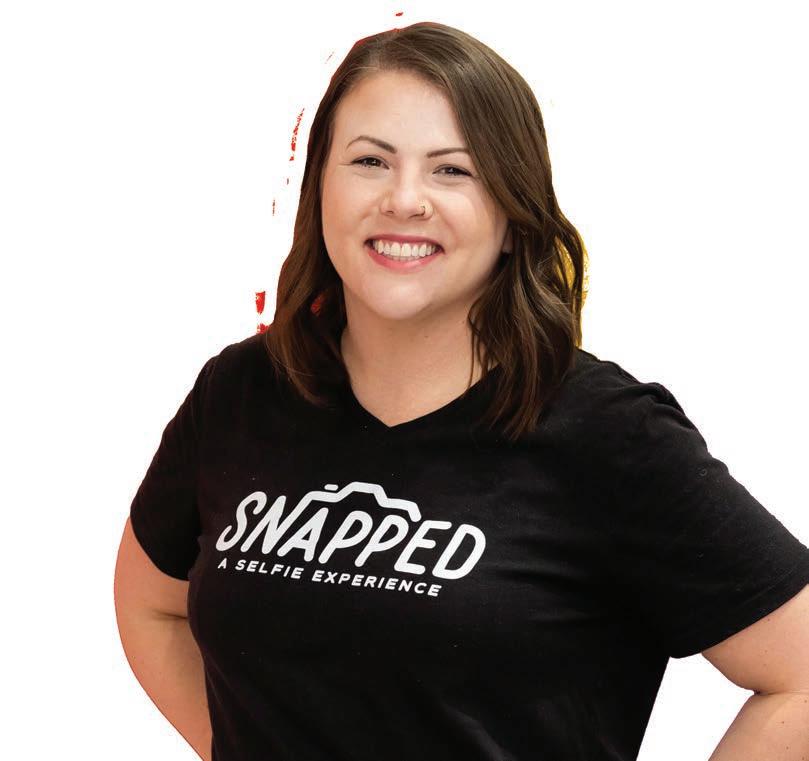
But Richardson didn’t stop there. “There was a need for birthday entertainment,” she says. “I have four kids and have done every party idea imaginable. I wanted to do multiple parties in one but make it an ageappropriate experience. Everyone loves bubbles so I turned to foam parties.”
Foam Homies, Richardson’s mobile foam party business, has proven to be a success but it didn’t come without risk. In lieu of traditional funding, she front-loaded the business by pre-selling party packages at a discount and using those funds to purchase inventory. When gas prices began to skyrocket in the summer of 2022, it ate into the profits. So Richardson procured sponsorships to cover the cost of the foam solution, and she called the supplier with an offer to teach her methods to his other customers in exchange for more foam. He was so impressed that he offered to fly Richardson out to speak at an industry conference in Las Vegas.
“My hope for other entrepreneurs is that no matter how little support they receive, they remember to believe it's possible,” she says. “You have to believe in yourself and never give up. If you get creative enough, you can find the money.”
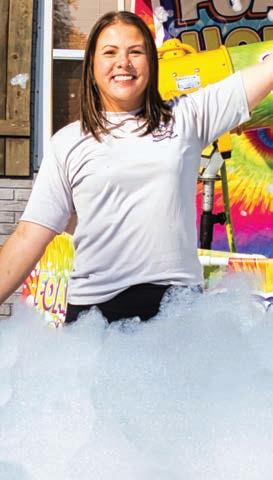
“YOU
never give up.
YOU
CREATIVE
In 2021, Courtney Richey-Chipol, regional director at the West Central Indiana Small Business Development Center (SBDC) , was serving businesses across seven counties with a staff of two.
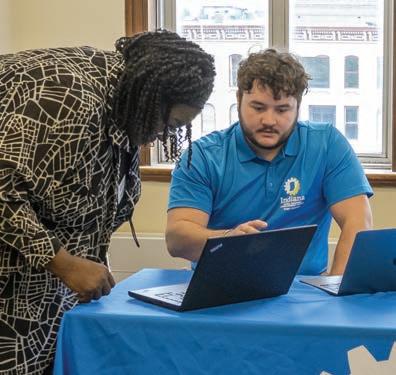
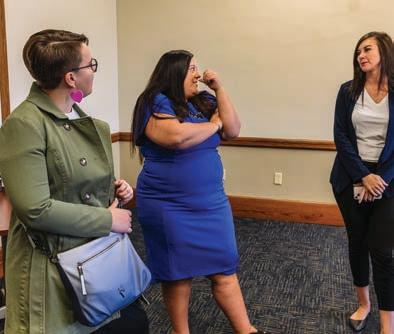
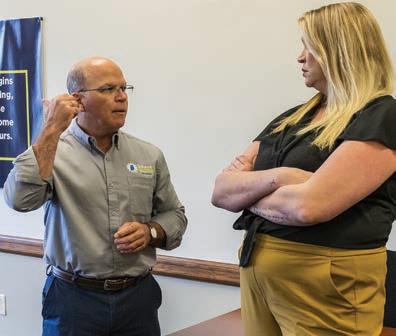

“We were able to help those who came to us, but we didn’t have the staff to do targeted outreach,” Richey-Chipol says.
In November 2021, the West Central Indiana SBDC, hosted at Indiana State University’s Scott College of Business, received a $1 million grant from the U.S. Small Business Administration’s Community Navigator Pilot Program. The money was used to create an Intentional Outreach Network (ION) to support businesses impacted by COVID-19 and underserved populations including rural, LGBTQIA+, veteran and Black-owned businesses.
“The funding allowed us to hire six business advisors dedicated to serving those populations,” Richey-Chipol says. “If you have a business and it’s struggling, it takes a lot to pick up the phone. If you don’t see people who represent you, it’s even harder. We have business advisors who are part of the communities we’re serving, and they’re able to talk not only about business challenges,
but about their experience as members of those communities.”
The impact has been immediate. The funding has already enabled the West Central Indiana SBDC to host a Black-owned business pitch competition in celebration of Juneteenth, during which six entrepreneurs were able to present their ideas. They’ve also helped a rural Parke County couple grow their herbal remedy business.
In addition to conducting targeted outreach, Richey-Chipol is excited about the accumulation of expertise the business advisors bring to challenges facing all businesses. “We had a couple in Sullivan that bought a bowling alley,” Richey-Chipol notes.
“We gathered as a team to help them think through their challenges. Our veteran-owned advisor runs a brewery and is weighing in on the bowling alley’s bar; our Black-owned advisor is an engineer and is giving insight into the mechanics of the lanes; our LGBTQIA+ advisor, a restauranteur, is consulting on the bowling alley’s restaurant; and our COVID-19 advisor is helping with marketing. We were really able to wrap our arms around this couple to make sure they’re successful.”
That’s the one thing that keeps me going is getting those pictures back to me, 'Hey, I caught my biggest fish ever on your baits.’''
Southern Indiana Bait Co.
Brothers Zion and Xavier Dunaway were members of the Salem High School bass fishing team when they began making their own custom fishing bait.
Xavier started painting hard baits using an airbrush, and the brothers soon saw a business opportunity. “I started posting our baits online and people kept wanting to place orders,” Zion says. In 2020, the brothers went in 50/50 to fund and launch Southern Indiana Bait Company, Co.
Traditional baits are made with salt, but through research, the brothers discovered that while the salt doesn’t necessarily attract more fish, it does cause the baits to tear up more quickly. They opted to eliminate salt to develop a more durable product. The second facet of their business is customization. Customers can select specific colors, glitter, and size to make their own unique bait. “We’re targeting young people just because I like to see youth continue to grow the sport.”
A high school teacher signed the Dunaways up for Innovate WithIN’s 2021 pitch competition, which they wound up winning. “Doing that competition and talking with business professionals and CEOs opened my eyes to this being more than a hobby and that it was scalable,” Zion says. “Innovate WithIN’s Startup Foundation gave us a $20,000 grant, which tripled our production. We cover the whole fishing segment from saltwater to freshwater, and a wide variety of species.”
Zion, now a Purdue freshman, and Xavier, a high school junior, continue to grow Southern Indiana Bait Company. The brothers have shows and expos planned for the upcoming year to spread awareness. The next goal is to expand the retail base, so that eventually their Washington County made baits will be available across the U.S.
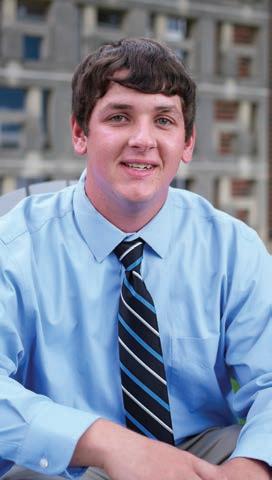

“WE’RE TARGETING YOUNG PEOPLE JUST BECAUSE I LIKE TO SEE youth CONTINUE TO GROW THE SPORT.”
Because of all the people who have helped me, I want to try and give back to the community as much as humanly possible.''
With the goal of spreading the gospel of cheese, Hoehn had the idea to launch a high-end food truck to sell unique varieties at locations such as area farmers’ markets and brewery parking lots.
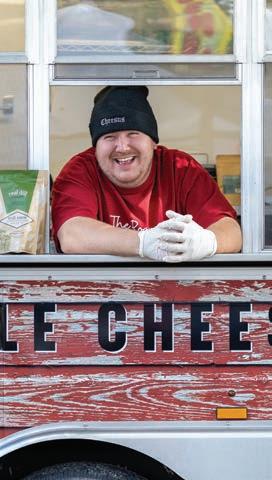
Hoehn’s trailer, The Roaming Wedge, carries 20 to 30 small-batch cheeses and he regularly updates the inventory so the selection stays interesting. Through a partnership with Tulip Tree Creamery in Indianapolis, Hoehn created his own custom-made cheese that can only be found on The Roaming Wedge. When picking products, his main focus is American artisanal producers with the mission of promoting small dairy farms.
“In Northwest Indiana, there’s a lack of good cheese available,” Hoehn says. “The products I’m bringing in, you can’t find them anywhere else in Indiana.” As a mobile cheesemonger, Hoehn works in partnership with brewers and coffee shops for pop-up pairings that he promotes on social media.
Hoehn’s next plan is to create monthly cheese subscription boxes to be delivered to customers’ doors. He is also placing standalone refrigerators in various businesses, such as coffee shops and wineries, in the hopes of supporting other independent owners.
An army veteran, Hoehn is passionate about community service and uses The Roaming Wedge as a way to help organizations like the Wounded Warrior Foundation, No Kid Hungry, and Toys for Tots. “Because of all the people who have helped me, I want to try and give back to the community as much as humanly possible.”
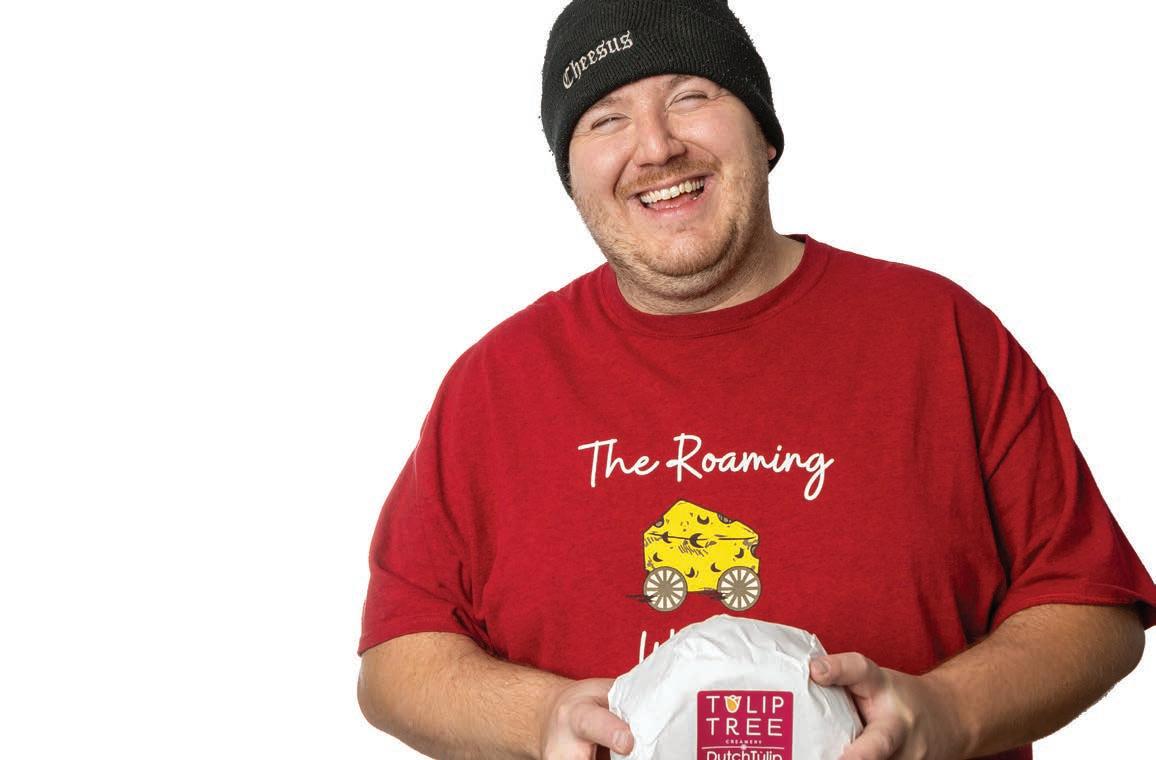
Nick Hoehn fell in love with the universe of cheese varieties while working at Whole Foods and attending the company’s training sessions.
“THE PRODUCTS I’M BRINGING IN, YOU CAN’T FIND THEM anywhere ELSE IN INDIANA.”
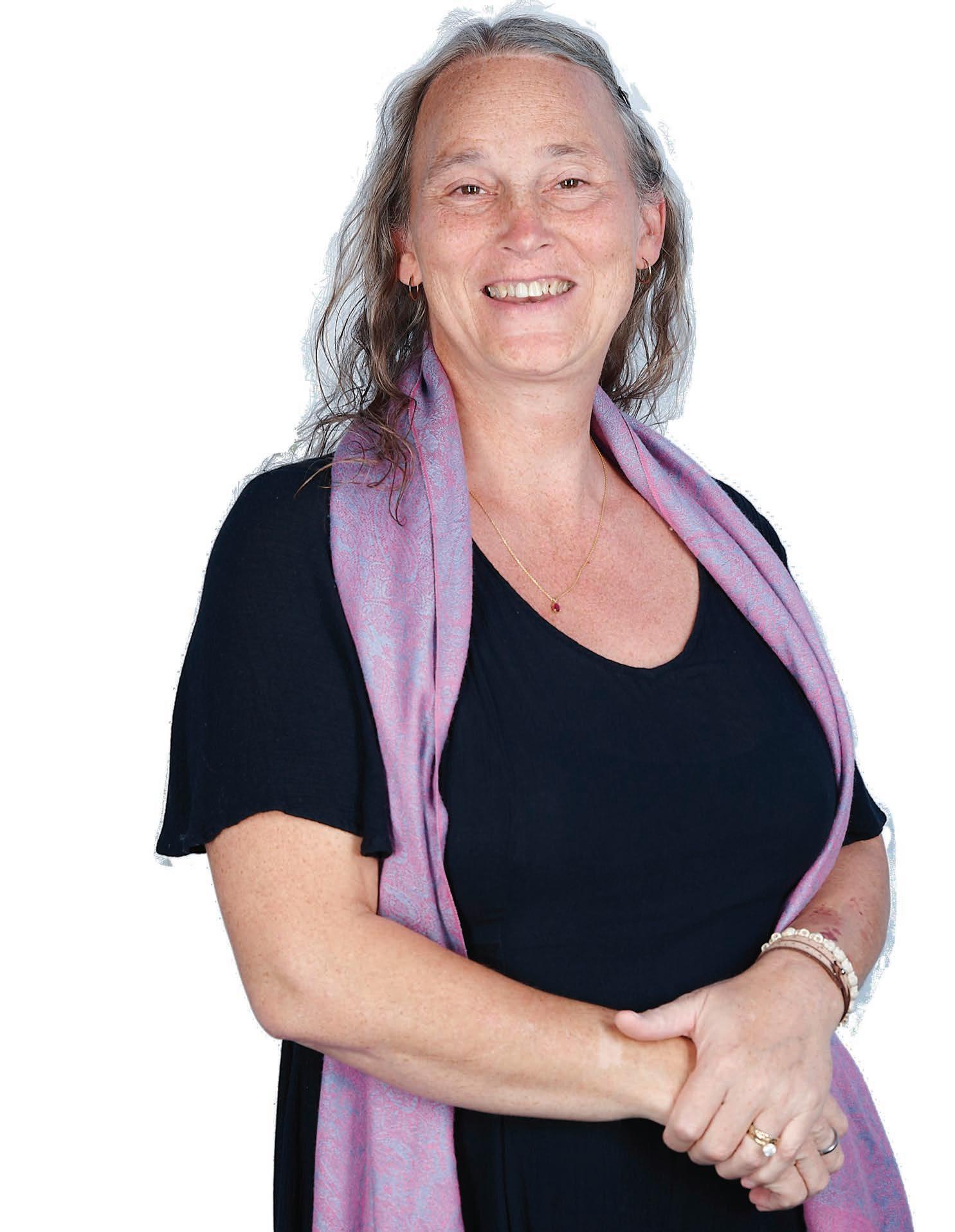
Bedsores claim more lives than car accidents each year. And they cost medical facilities—whose bedridden and wheelchair-bound patients are prone to infection—approximately $27 billion annually. Registered Nurse Jessica Bussert, founder, president, and CEO of Nashville, Indiana-based Wave Therapeutics, thinks the company's wheelchair cushion is the answer. Using rolling, wave-like motions to improve circulation, the product stops sores from forming.
“Every other product on the market focuses on treating bedsores,” says Bussert. “We are building a technology that prevents them.”
She recently signed a contract with the Veterans Health Administration, which serves about 85,000 wheelchair-bound patients, to evaluate the cushion. It’s poetic justice, since the device was inspired by a veteran.
“As a nurse, I cared for a veteran who was suffering from the worst bedsores I had ever seen,” she says. “His doctor prescribed a $4,000 wheelchair cushion, which he could not afford. It broke my heart that we were not able to take care of someone in need—particularly a veteran.”
Bussert sprung into action, estimating that the $4,000 cushion required only about $100 worth of parts. She created a more sophisticated version that could be sold for about a tenth of the price. In the backroom of her Nashville art gallery, she tinkered with eight prototypes, soldering circuit boards and making air bladders out of bicycle inner tubes. Her biggest challenge wasn't designing the cushion, but fundraising.
Her small team, scattered across the state from Goshen to Franklin, is on the verge of moving into manufacturing. The product has a list of potential customers, with calls and emails from organizations and individuals asking when they can purchase it.
Says Bussert: “We are going to become the standard of care and dominate the market with an affordable, effective solution.”

Ironically, Bussert likely wouldn’t have founded Wave had it not been for a seismic change in her own life. Formerly a global computer consultant, her career was torpedoed by discrimination when she came out as transgender 17 years ago. She became a nurse, which led her down her current path. She hopes others facing similar issues might one day find a home at Wave.
“Wave Therapeutics isn’t just about protecting people from bed sores,” Bussert said. “It’s to help me, my family and other members of our community find one more opportunity for discrimination-free employment.”
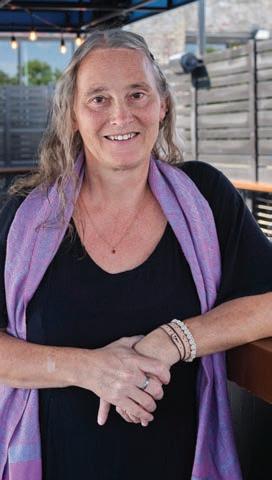
“WE ARE GOING TO BECOME THE standard OF CARE AND DOMINATE THE MARKET WITH AN AFFORDABLE, EFFECTIVE SOLUTION.”
isn’t
people
It’s to help
and other
of
community find
I had this epiphany that if I didn’t do something to make a name for myself, I was going to wake up old and bitter, wishing I had done something with my life.”
Employed as a graphic designer for over 18 years for the Chicago Tribune and other publications, Rockland Page grew tired of working for other people.
“I had this epiphany that if I didn’t do something to make a name for myself, I was going to wake up old and bitter, wishing I had done something with my life,” he says. In 2017, after researching and purchasing equipment to make T-shirts and clothing, he launched [ROCKaBLOCK] in Merrilville.
Then came Wakandacon 2018, Page’s first in-person vending event. Folks at the three-day comic con couldn’t get enough of his shirts; even other T-shirt vendors were donning them, embracing their wry, fun, subtly political take on Black history, Black identity, and 80s culture.
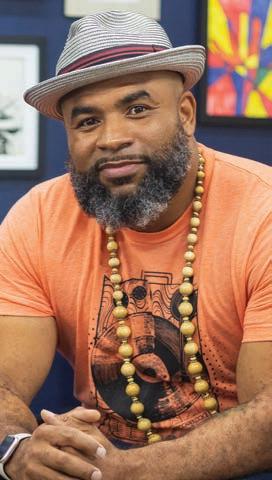
When Page’s work hours were cut at the start of the pandemic, he knew he needed to make a change. “I was forced out of my comfort zone and into survival mode,” he says. “If this was going to work, I had to put my all into it.”
That year, when people were looking to support more Black-owned businesses, [ROCKaBLOCK]’s SEO soared and Page began receiving orders from across the country. He was soon featured on Chicago news stations and in the local newspaper, winning raves for his attention to quality and detail and distinct visual/ graphic style.
1 Million Cups introduced Page to the Indiana Small Business Development Center (SBDC) where he was named Indiana’s minority-owned business of the year, and in 2021, he won Purdue Northwest’s Big Sale Pitch Competition. Page’s next goals are to make [ROCKaBLOCK] a national brand and roll out new products, including an augmented reality T-shirt. By growing the company, he hopes to provide opportunities within the community including jobs, and a design studio ecosystem where people can go to learn and create.
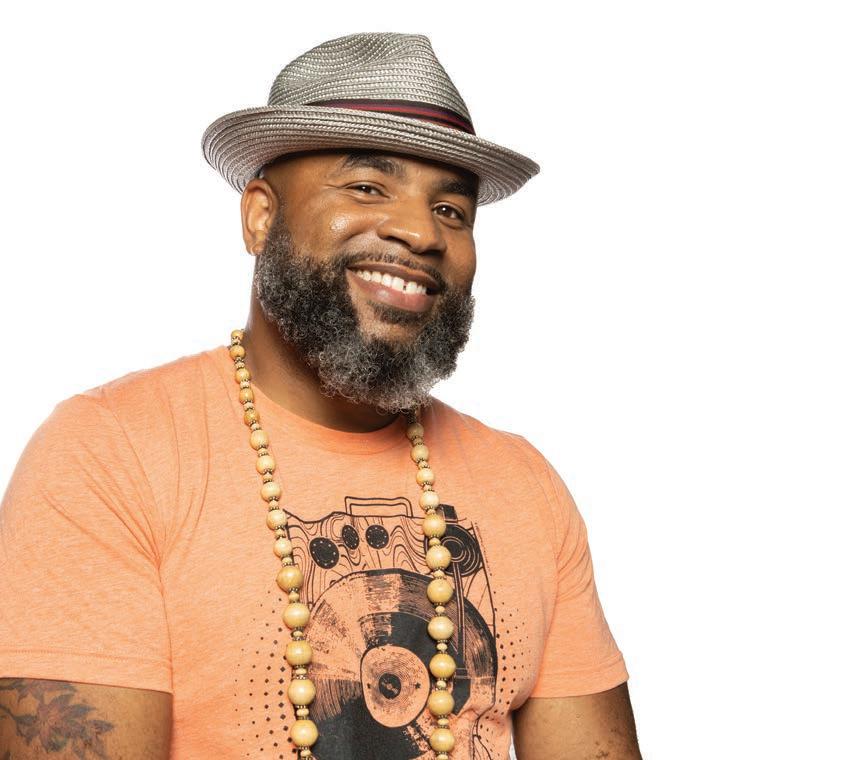
Indiana
"IT’S THE REACTIONS THAT PEOPLE HAVE THAT BRING ME A LOT OF JOY. IT SHOWS ME WHAT I’M DOING HERE IS making a difference. "
My dream for (other entrepreneurs) is that they have the willingness to take the risk. Come and try to explore the opportunity,”
Justin Gillespie, founder of 950 Speakeasy Bistro, leveraged the timely completion of improvements to the adjacent Wabash River Trail to open his riverside restaurant, with a focus on cocktails and live music but in a family-friendly environment. “We provide a quality establishment,” says Gillespie. “Lagro is a small town in the middle of some larger towns and when people are looking for something different, we can provide that destination. At this time, we are pretty much the only place like us in town.”
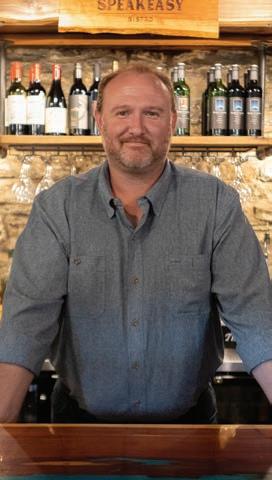
Gillespie shared that though the project was primarily self-funded with investments from friends and relatives, his local town board helped a lot with permitting issues and approvals needed to push things forward.
Shortly after opening, 950 got a boost due to a viral post from a customer on social media.
“A customer’s post got, like, 800 shares and it blew up across the state,” he says. “I was coming into work and the entire downtown of Lagro was packed full of cars. I thought the town was having an event but it turned out everyone was coming to the bistro. I walked in and the whole place was packed… that was a sign that we were doing something right.”
The early success has caused some adjustments in the business including a redesigned kitchen layout to meet the demand of customers.
“My dream for (other entrepreneurs) is that they have the willingness to take the risk. Come and try to explore the opportunity,” says Gillespie. “I hope they're successful and they have an idea that's able to take root and blossom.”
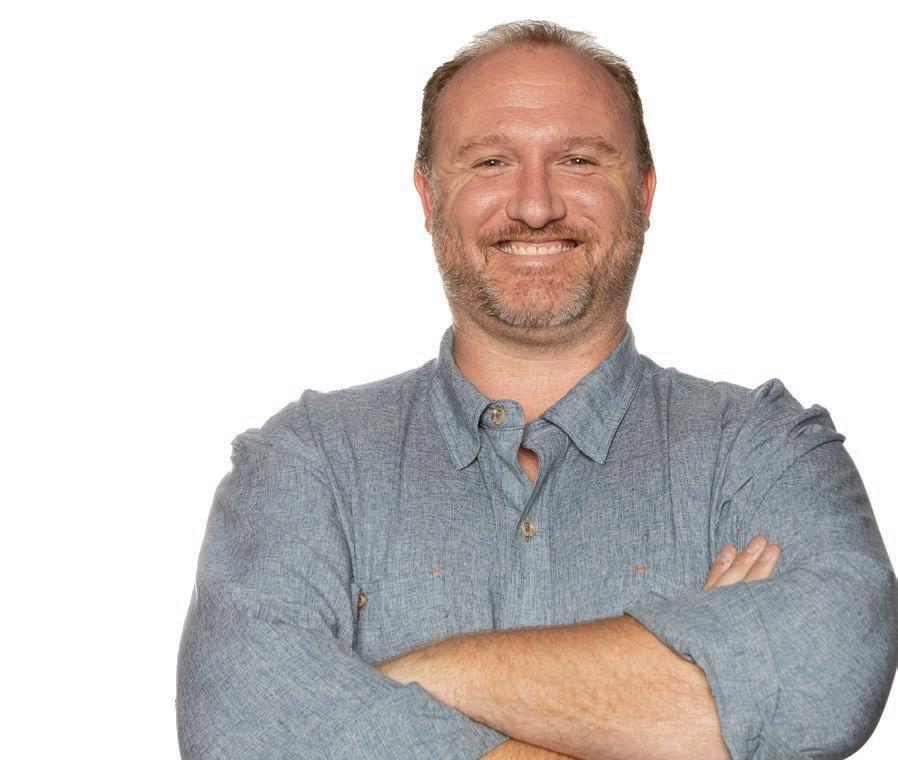
950 Speakeasy Bistro
One key to success in business is timing.
"AT THIS time, WE ARE
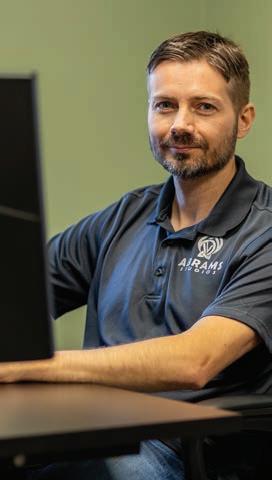
We all have kids now, and we want our kids to be able to play games that teach them the value of nature.''
“Even now, we go mushroom hunting and bring our phones so we can photograph all the wildlife,” says Wesley Abrams, one of the founders of Abrams Studios.
In 2017, the four brothers began creating a family-friendly video game that unites their enthusiasm for nature, mushroom hunting, and wildlife photography. “We all have kids now, and we want our kids to be able to play games that teach them the value of nature.”
Dubbed Morels: The Hunt, their game got a warm reception from gaming enthusiasts eager for non-violent alternatives. When the trailer released in 2019, top gaming sites, social media influencers, and magazines such as PC Gamer gave them generous coverage, which ultimately caught the eye of Oculus, a virtual reality platform owned by a little company called Facebook.
Two days after the release, the Abrams brothers were talking with the biggest virtual reality company in the world. “I remember that day clearly,” says Wesley Abrams. “[Oculus] reached out and said they wanted to chat. I didn’t believe it was really them.” Morels: The Hunt was exactly the type of game Oculus wanted for its virtual reality platform. With those auspicious prospects, the four siblings formalized their partnership as Abrams Studios LLC.
Oculus later greenlighted Abrams Studios to create a related virtual reality game and provided development funding for Morels: Homestead, which was released in December 2021. Looking ahead, Abrams says their company has “a lot of opportunity for income for a long time in these games because we can keep adding new content people can buy to expand the game.”

“
Two days AFTER THE RELEASE, THE ABRAMS BROTHERS WERE TALKING WITH THE biggest VIRTUAL REALITY COMPANY in the world.”
Abrams Studios LLC
Growing up in North Judson, Indiana, Wesley, Jason, Derek, and David Abrams loved exploring the outdoors.
Ateios ... is now on its way to being a global leader in advanced battery production .”
Originally focused on scaling printable, flexible batteries for electronic textiles such as wearable devices, Ateios Systems pivoted when a potential customer made a big ask: a flexible battery that could be manufactured en masse and mounted onto devices.
Ateios rose to the challenge and soon became the exclusive vendor for the customer, and is now on its way to being a global leader in advanced battery production.
Thin-film batteries are still a relatively new technology. To accommodate market needs, manufacturers such as Ateios needed to find a way to simplify structures and improve production processes. Research led Ateios to an alternative manufacturing method for electrodes based on the radiation curing of polymers—a method widely adopted in other sectors for its energy saving benefits, facility with ultra-high-speed coating applications, and ability to reduce the manufacturing footprint.
A turning point came in 2019 when Ateios was accepted into the prestigious Techstars program. “This gave us the tools to raise a series seed fund, which was a major milestone for the company to hire talent, acquire customers, and purchase the right equipment,” says CEO Dr. Rajan Kumar.
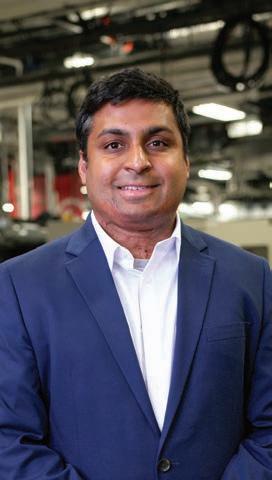
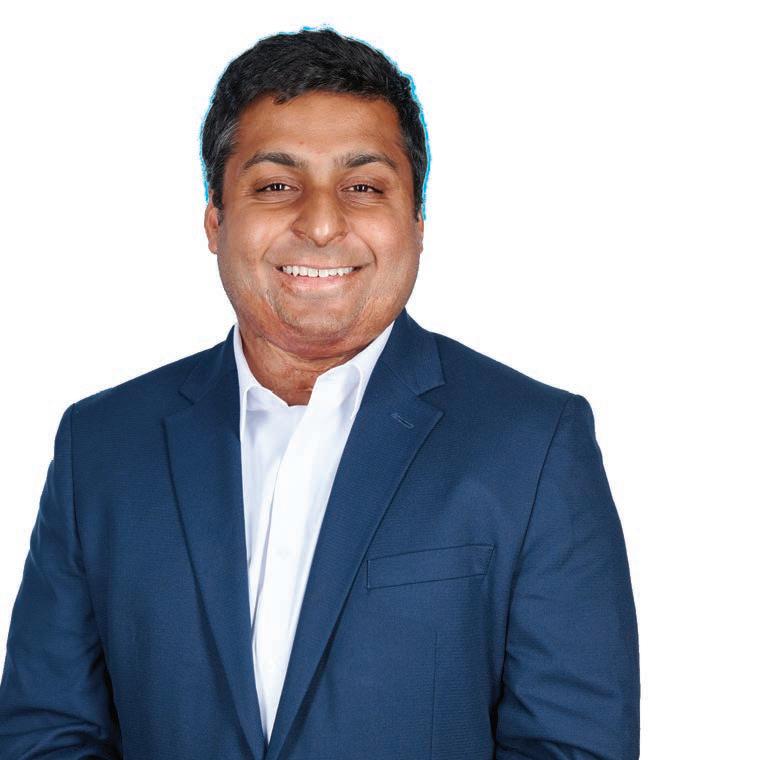
Based at the Battery Innovation Center (BIC), Ateios expects to open a lean manufacturing facility in Indiana after closing a Series A round by December 2023. Then Ateios can provide the world with customizable, flexible batteries that can be integrated into electronics manufacturing.
“Ateios is one of the pioneering companies establishing Indiana as the technology leader in batteries and energy storage,” says Ben Wrightsman, president, Battery Innovation Center. “They demonstrate how federal and state support alongside private capital can help supercharge entrepreneurs to drive innovation, domestic manufacturing, and economic opportunity.”
Indiana
"[THE TECHSTAR PROGRAM] GAVE US THE TOOLS TO RAISE A SERIES SEED FUND, WHICH WAS A major milestone FOR THE COMPANY TO HIRE talent, ACQUIRE customers, AND PURCHASE THE RIGHT equipment.”
Sam Centellas was working with La Casa De Amistad, a center serving the Hispanic community in South Bend, when he realized the dire need for Community Development Financial Institutions (CDFIs) in the area.
“Ten years ago, I saw homes around La Casa selling for $25,000 to $30,000, and residents could not get a loan to buy them,” says Centellas. “I thought to myself, ‘This is not right. Someone has to fix this.’”
CDFIs provide financing and expertise to people and communities outside the economic mainstream. They are private financial institutions working for public purposes, using flexible, affordable financing to produce inclusive, equitable, and sustainable opportunities.
When Centellas realized it would be more efficient to connect local borrowers with pre-existing CDFIs, CDFI Friendly South Bend was formed. Its mission is to increase the flow of capital to the region in support of affordable housing, small business, and nonprofits.
CDFI Friendly scored a big win in May 2022 when it helped Property Bros, founded by equitable housing advocate and real estate investor Jordan Richardson, secure a $500,000 line of credit from Cinnaire, a low-income housing-focused CDFI headquartered in Lansing, Michigan.
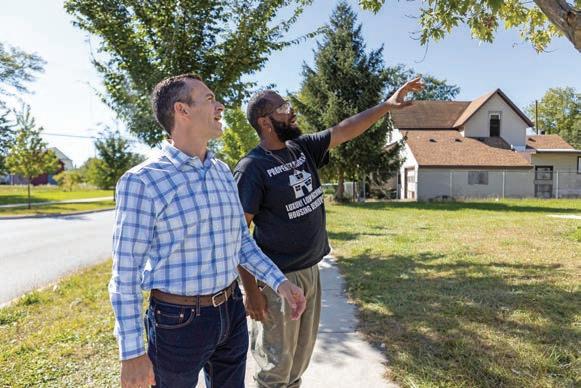
Launched in 2020, Property Bros LLC buys vacant homes otherwise ignored in the housing market and renovates them into multi-unit properties with a luxury touch accessible to renters of all backgrounds.
While Richardson acquired a few units with his own funding, he wanted to do even more to increase housing options in his hometown, where more than 300 people are on the waitlist for affordable units. When he could not secure funding from local banks, he turned to CDFI Friendly.
“Every penny allocated to Jordan has made more money or been invested back into the community,” says Centellas. “He’s hired five people since he was awarded funding from Cinnaire. What a great way to create wealth for local people in the neighborhood who are staying to make this a better place to live.”
 JEANNIE MARRUGO
JEANNIE MARRUGO
My mom and I had always wanted to start a business together, so I took the idea to her.''

Architect Jeannie Marrugo wanted to make her daughter’s baby food, but simply didn’t have time.
Figuring other parents faced the same issue, she quit her job and started Café Baby. The Indianapolis-based company makes and ships high-quality baby food to customers across the U.S.
“ My mom and I had always wanted to start a business together, so I took the idea to her,” Marrugo says. Café Baby now operates out of a 1,200-square-foot storefront kitchen in the Castleton area. After about six months of tinkering, the duo came up with a menu geared toward eating stages. Offerings range from Perfect Plums for the four to six month set, to Baby Ratatouille & Quinoa for 10 months and up.
Every Café Baby meal uses fruits, vegetables, and proteins cooked on-location by Marrugo’s mother Sherri, and is sold at the shop, through select retailers, or by mail to customers in the eastern third of the U.S. “Our biggest business is online, because we started the company at the beginning of the pandemic,” Marrugo says.
Recently, Café Baby served its 12,000th customer, and opened a second, under-license kitchen in Sacramento, California. This will allow the company to ship its frozen foods, in insulated containers, nationwide.

“ I’m hoping our brand will become a household name,” Marrugo says. Though her Indy workforce currently consists of her, her mom, and a few part timers, she wants to hire more staff soon.
I n the beginning, taste testing was handled by Marrugo’s oldest daughter, a baby at the time of the company’s formation. But now both she and her three-year-old sister have aged out of Café Baby’s products. Which illustrates a conundrum the company faces: no matter how good their product, says Marrugo, “you have to bring in new customers constantly.”
"I’M
Its first products were designed to assist groups struggling to function in the midst of the COVID-19 outbreak.''
GENG WANGT he idea was to allow users to do quick, small acts of good around their community. The mission is to deliver the most intuitive and impactful volunteer management platform for nonprofits and their champions. Or another way to put it, our goal is to help volunteer managers save time while creating a more engaging experience for their volunteers.
“ We automate as much of that as possible,” Wang says, “moving it to the digital realm and making it easy for both the volunteer and the administrator.”
Wang founded the business (his third) in 2019, focusing on a concept with strong social impact. Its first products were designed to assist groups struggling to function in the midst of the COVID-19 outbreak, including an effort called Helping Hands. Originally piloted in Bloomington, Helping Hands facilitates the use of volunteer drivers to deliver food and other essentials to homes.
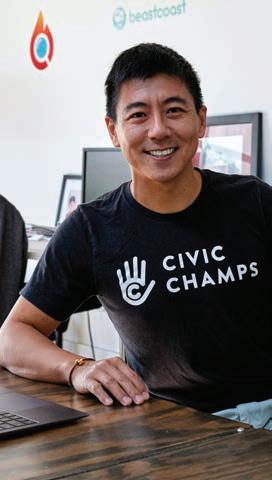

“ It’s a mobile app, and the volunteer drivers function kind of like Uber drivers,” Wang says. “The app helps them know where to pick up and drop off.”
N ow used by dozens of charities in no less than 24 states use Civic Champs’ technology, including Habitat for Humanity, United Way, and numerous homeless shelters and food pantries. Civic Champs is honing and expanding its software suite, and has so far raised about $1.6 million from backers such as Elevate Ventures, IU Angels, and The Richard King Mellon Foundation. Wang thinks Civic Champs, which is registered as a Benefit Corporation, will grow revenue by 50% this year.
“We’d love to really scale up, so we can have more impact,” he says. “I’d love to serve a thousand or more nonprofits in the next two years. I think that’s realistic.”
Southern IndianaSerial entrepreneur Geng Wang originally envisioned Civic Champs as a Pokémon Go for volunteerism.
Manufacturing Readiness Grants ( MRG) are designed for Indiana’s manufactur ers looking to make innovative capital investments in smart manufacturing— leveraging technologies from advanced communications to cobots to the Industrial Internet of Things and beyond.
It’s a critical support considering that manufacturing accounts for about 30 percent of Indiana’s GDP.
Buoyed by $4 million in recent funding and a partnership with Conexus Indiana, the MRG awards 1:1 matching grants up to $200,000 to Indiana manufacturers committed to improving capacity, speed, and quality by modernizing operations or integrating smart technologies.
As specific case studies on the Conexus Indiana website reveal, the impact of MRG can be felt across the state as technology budgets nearly doubled for participating advanced manufacturing and logistics companies in the past two years.
Mach Medical in Whitley County is one of those recipients, leading the way in producing orthopedic implants through high-velocity, single-piece flow manufacturing. In Q3 2021, Mach Medical was awarded $175,000 in MRG funding for developing a “digital twin” solution to significantly decrease the time it takes to scale a new orthopedic implant product.
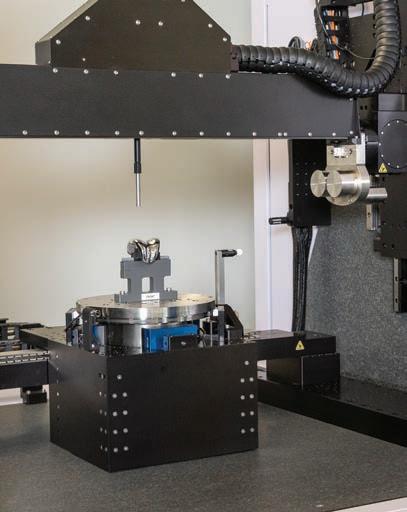
Mach Medical Co-Founder and General Manager Steve Rozow likens the challenges of orthopedic

production to the shoemaking process. “Each shoe is based on a single design that must be scaled to fit an entire population of different sizes, shapes and widths,” he says.
“Digital twin allows us to rapidly translate the design specification of an orthopedic product into executable manufacturing without compromising quality in a highly regulated healthcare industry,” Rozow says. The R&D and software development for the digital twin solution, largely made possible by MRG funding, allows the implementation phase to occur in a fraction of the time it previously took. “As we perfect the technology, Mach Medical will have a huge competitive advantage.”
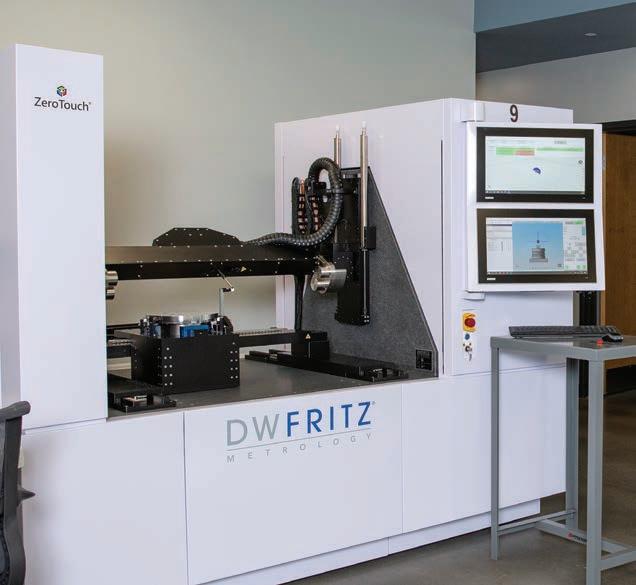
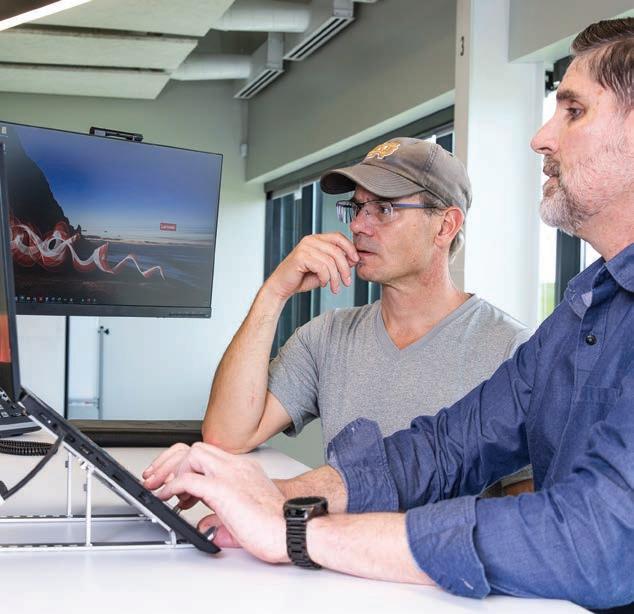
 STEVE ROZOW
STEVE ROZOW
MRG grant recipients, such as Mach Medical, almost universally attribute the grant to either enabling, expanding, or accelerating a technology investment. Allowing Indiana to stay competitive in a rapidly changing world.
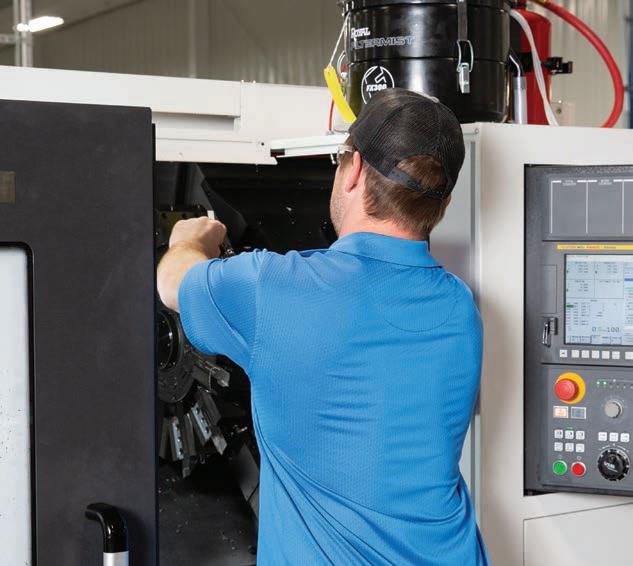
“AS WE PERFECT THE TECHNOLOGY, MACH MEDICAL WILL HAVE A HUGE COMPETITIVE ADVANTAGE.”
Grove says that when times have been tough, the community has had her back.”
J.D. Grove is an Indiana entrepreneur working to change the narrative of buying large.
She is the owner of Granola Girl Skincare, purveyor of zero-waste, “obsessively natural” soaps. And she owns two boutiques, Conspire: Contemporary Craft (opened in 2016) and Granola Girl Apothecary (opened in 2022). Part of her mission is to “reconnect consumers with makers.”
Originally based in Bloomington, Grove moved to Greencastle and opened Conspire as a source of handmade items by 130 local and regional artists, and a space where the local LGBTQ+ community can craft, game, or gather. “It was important to me to bring some of the fun, artistic, and progressive spirit of Bloomington with me,” Grove said.
Through Faire and Abound, two online wholesale markets, Grove sells her own Granola Girl Skincare and curates the independent brands Conspire carries: handmade health and beauty items, crystals, tarot cards, handmade candles, and other essentials and gifts. Everything in the store is made locally or regionally, or is from a certified fair-trade company.
Grove says that when times have been tough, the community has had her back. And when she ran into pandemic-related financial challenges after her Greencastle move, Grove worked with the Indiana Small Business Development Center to access resources.
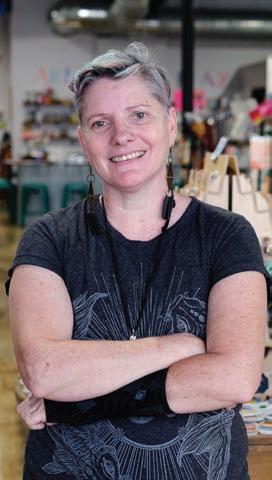
Grove’s experience traveling to festivals to sell her skincare line and meeting local and regional makers gives her a unique perspective as a business owner in a small city. Today, she strives to be the reason people buy goods from artists and makers in their own community.
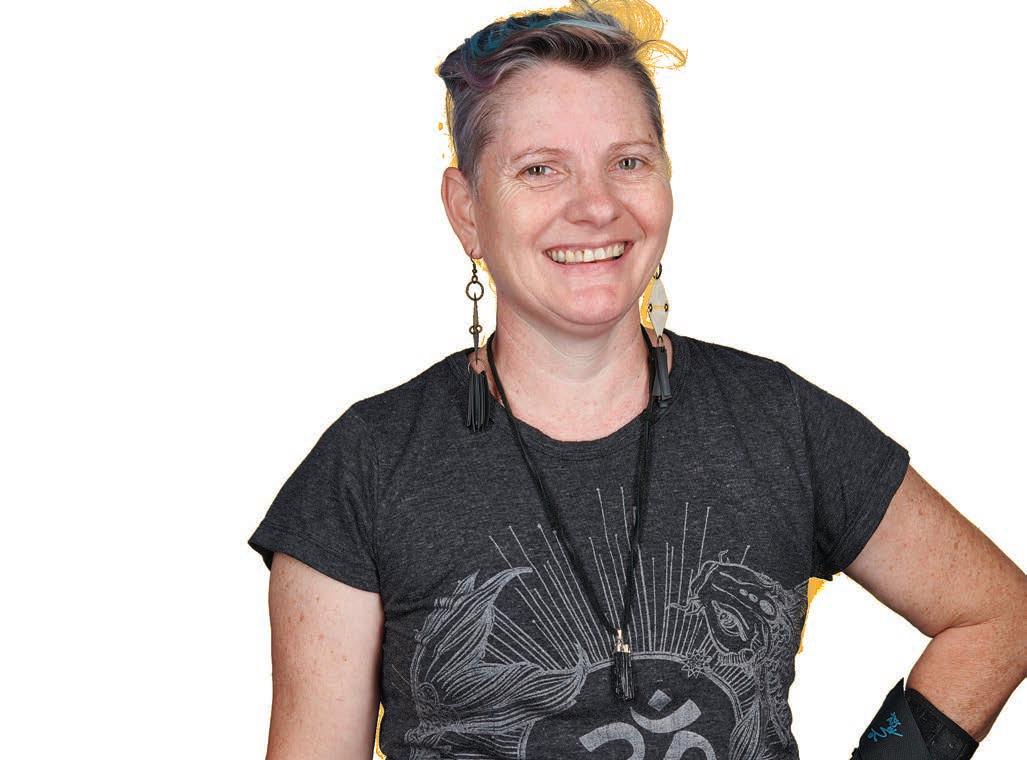
STRIVES TO BE the reason PEOPLE BUY GOODS FROM artists AND makers IN THEIR OWN community
[ConverSight] closed a $4 million Seed round, led by Elevate Venture, in January and became one of the first tenants of the 16 Tech Innovation District to be close to this hub of research, innovation, and entrepreneurship."
Every business collects data, but unless leaders extract, interpret and use that data to make timely decisions, how valuable is it?
Ganesh Gandhieswaran has been motivated by that question since 2017 when he co-founded ConverSight, a company that makes data analytics solutions instantly accessible to businesses.
The idea for ConverSight came from Gandhieswaran’s previous experience at a large IT consulting firm, where he led the firm’s data analytics practice. There he helped companies like Walmart, Ford Motor Company, and General Motors build powerful data analytic systems.

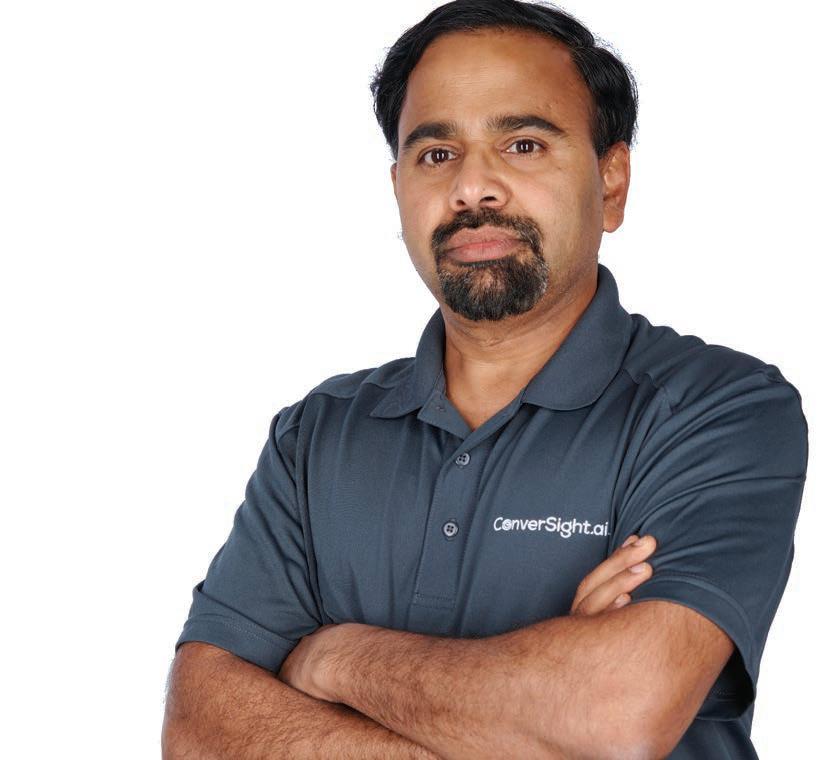
After one of their clients launched a new system, the firm returned six months later to see how things were working. “We discovered that only 10 people were using it,” Gandhieswaran says. “Most leaders didn’t even open the system. Instead, they would get on the phone and say, ‘Hey Mike, can you send me a report that shows the past six month’s sales by customer?’”
Gandhieswaran began to wonder if it might be possible to do for business leaders what Alexa and Siri have done for consumers. At an innovation conference, he met ConverSight co-founder Gopinath Jaganmohan. The duo started collaborating on an idea that would make data so accessible that all one needs to do is ask for it.
The result is Athena, an adaptive learning technology that lets business leaders get instant insights through simple voice commands. Athena has earned multiple accolades in the category of data analytics, including the Cool Vendor award by Gartner. The company closed a $4 million Seed round, led by Elevate Venture, in January and became one of the first tenants of the 16 Tech Innovation District to be close to this hub of research, innovation, and entrepreneurship.
“Any business leader needs a lot of accurate information every day to know whether they are selling enough, making a good profit, or meeting delivery challenges,” Gandhieswaran says. “What we’re doing is allowing them to just ask a question that connects them with the data.”
NEEDS A
KNOW WHETHER
ARE
OR
HAS REMOVED PHYSICAL AND PSYCHOLOGICAL WALLS FOR BUSINESS STARTUPS AND INNOVATORS BY PROMPTING ORGANIC INTERACTION WITH FELLOW ENTREPRENEURS.
THIS 21ST CENTURY WORK ENVIRONMENT HAS OFFERED ON-DEMAND PEER SUPPORT AND PROBLEM-SOLVING WHICH IN TURN HELPS ACCELERATE THE ENTREPRENEURIAL JOURNEY. THREE ORGANIZATIONS—START FORT WAYNE, THE SPEAK EASY, AND THE MILL—HAVE SEEN
THE GROWTH THESE SPACES HAVE SPURRED IN THE INDIANA BUSINESS ECOSYSTEM.

Co-working and resource sharing have always existed, but the new tradition of shared spaces has arisen in response to commercial real estate issues, access to capital, and affordability of office space in the middle market.
By eliminating barriers between people, these co-working spaces cultivate opportunity, education, and network sharing.

“A co-working space gives every member access to see others at various stages in the entrepre neurial journey,” says Swartz. “It’s that peer-to-peer modeling that you just don’t get in any other space.” Suddenly, members see others like themselves, naturally progress to the next step in their development, and end up mentoring the up-and-coming set.
A well-designed co-working space like Start Fort Wayne deepens the entrepreneurial journey by encouraging people to work together and support one another.
TJ Wright EXECUTIVE DIRECTOR/ THE SPEAK EASYCo-working spaces lean on what Indiana does best, which is Hoosier hospitality and the tendency toward collaboration over competition for competition’s sake.
“Co-working is built on trust,” says Wright. “That’s something incredibly impactful for entrepreneurs, and even more so for entrepreneurs of color, marginalized groups, and entrepreneurs who are LGBTQ+.”
The Speak Easy aims to help entrepreneurs gain the necessary skills and collab orative advantages to build an ecosystem that shortens the timeline to success. The entrepreneurial journey can be lonely, but co-working spaces provide that intangible boost. Such a support system creates more diverse thinkers and workers who uplift the community, which in turn gives much needed grounding. This kind of stability ultimately generates more net new jobs for the state.
Pat East EXECUTIVE DIRECTOR/ THE MILLThe ability to rent month-tomonth in spaces like The Mill eliminates risk to entrepreneurs and keeps costs affordable. With a three-year maximum stay-period, it motivates founders to incubate intelli gently and leverage the network of informal learning. “You need to create a rich ecosystem with other like-minded folks,” says East. “The more ideas that you exchange, the more innovation that happens.” Co-working spaces allow for over-theshoulder conversations and unplanned time to interact with other innovators. A startup company’s work is typically unique and finding someone with similar experiences is not always practical, but having mentors to advise and help problem-solve is crucial. Co-working provides ready cross-pollination among innovators: an invaluable resource for a startup company.
It clicked when I realized that I could make money doing something that I really liked and am really good at.''
He’s had admirable success just following his own instincts. The 29-year-old entrepreneur founded his first business when he was still in high school. Inspired by a principal who encouraged students to innovate and lead, Sheehan has been hooked on marketing since he earned $1,000 making a video that promoted his hometown’s Indy 500 spirit. That video not only won a statewide contest; it launched Sheehan’s career.
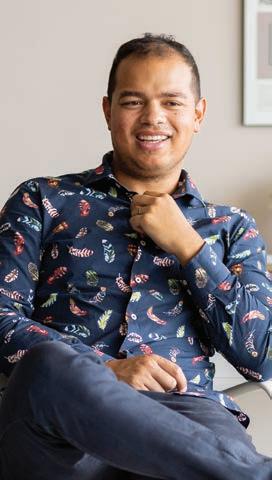
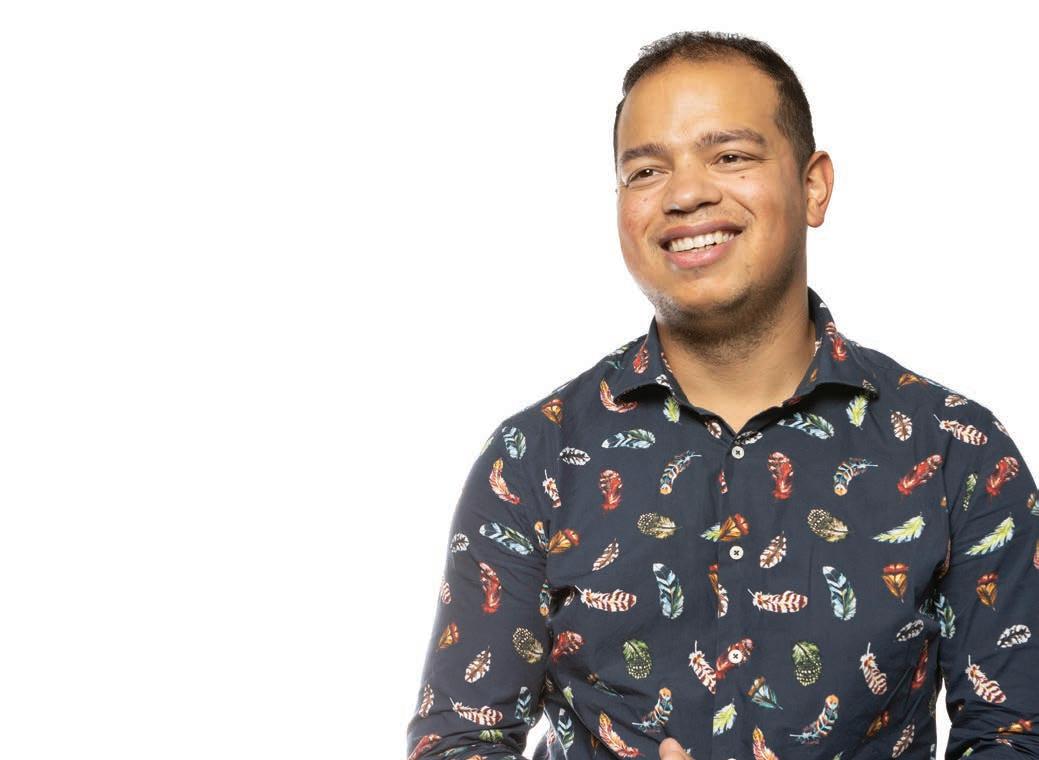
“It clicked when I realized that I could make money doing something that I really liked and am really good at,” says the founder and chief vision officer of Crown Jewel Marketing. Bypassing a full scholarship to college, Sheehan landed his first clients in the Fort Wayne market. Although he’s had a job and two other businesses, the boutique marketing agency has been his sole focus since 2015.
“Our market is not just Fort Wayne,” Sheehan says. “Our market is the world.” Eschewing formal programs, elaborate business plans, and networking groups, Crown Jewel Marketing focuses on making things happen organically and finding clients who believe in the power of storytelling.
The company is expanding its time-intensive professional services to serve a broader audience with an app that trains clients who may not be ready to hire a marketing agency. “I run into so many clients that are culture fits, but they can’t afford our services,” Sheehan says. “We are developing a process that allows them to use an app to learn and build the basics of marketing. It’s super early, but we are also trying to pioneer a way for companies to use non-fungible tokens (NFTs) and cryptocurrencies. Our clients are decision makers who are trying to disrupt and make an impact.”
If there’s a conventional path to any destination, don’t count on Justin Sheehan to choose it.
In early 2022, Indiana Black Expo (IBE) launched the Black Business Training Institute in partnership with Governor Holcomb’s Office, Indiana Economic Development Corp (IEDC) and Indiana Small Business Development Center (SBDC)
The Institute is geared to assist Black-owned businesses while creating awareness of statewide initiatives such as the Governor’s Fund, which provides support to employers and small business owners of color.
IBE sees the need for more professional training among entrepreneurs, particularly those who are underrepresented. “We talk about access to capital, but if a business can’t manage it or isn’t ready for capital, then it’s in vain,” says IBE President and CEO Tanya Mckinzie. “We want to get on the front end and work with these businesses in a more intense way, and that’s what the Black Business Training Institute is all about.”
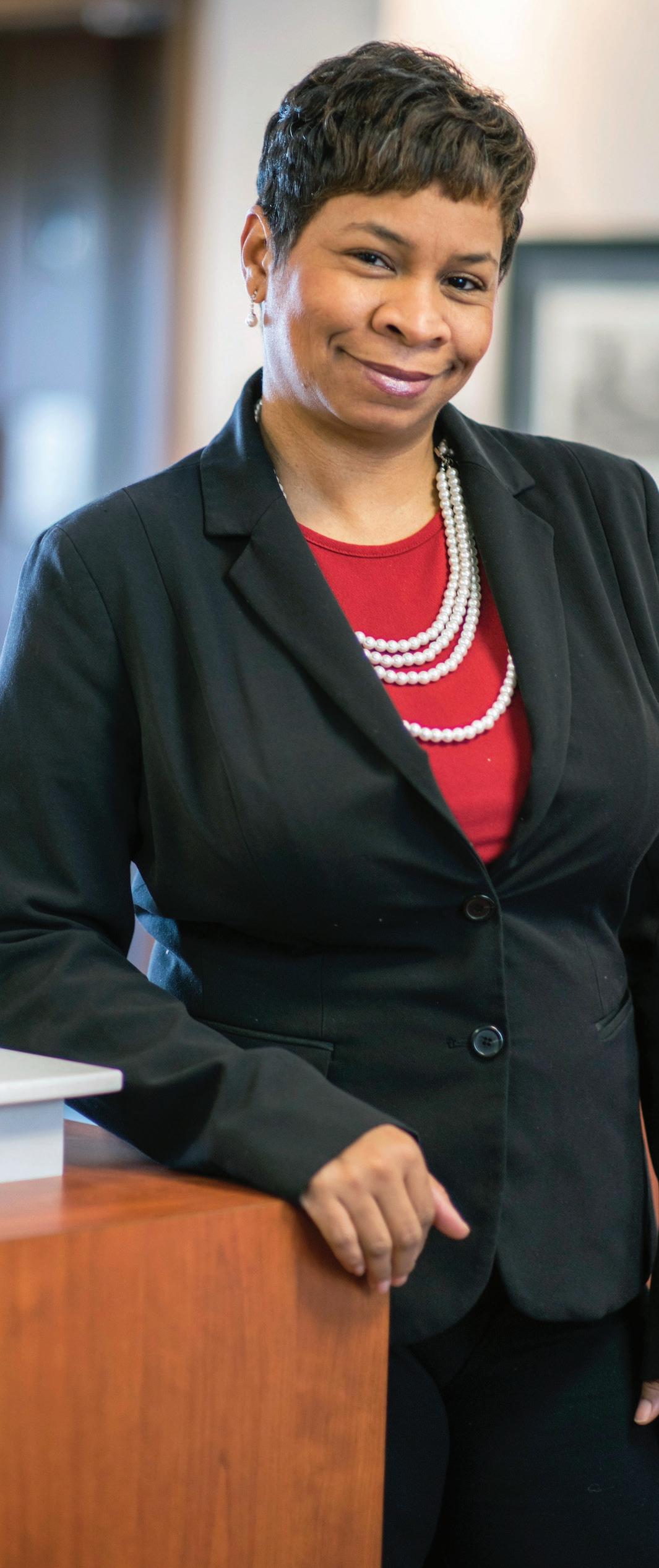
Participants in the first cohort of 120 businesses received financial guidance, business templates, and information on risk management and insurance during the 10 week program. In addition to coaching, the Indiana SBDC provided free advising, and IBE’s Networking and Investors Forum awarded growth grants to many of the participating businesses.
This first cohort will be reconvening for further business training as participants are working to articulate their company’s vision and to continue execution of their original business plans. On-site experts will be available to walk through contract negotiations and IBE will serve as a partner in the application process for the Minority Business Enterprise (MBE) certification.
“A lot of these businesses have had so much exposure from this program and received opportunities,” Mckinzie says. “We’ll be tracking their progress to make sure the grant dollars are used for their operations in a way that’s going to help them grow their businesses.”
“WE WANT TO GET ON THE FRONT END AND WORK WITH THESE BUSINESSES IN A MORE INTENSE WAY, AND THAT’S WHAT THE BLACK BUSINESS TRAINING INSTITUTE IS ALL ABOUT.”
IBE Business Accelerator
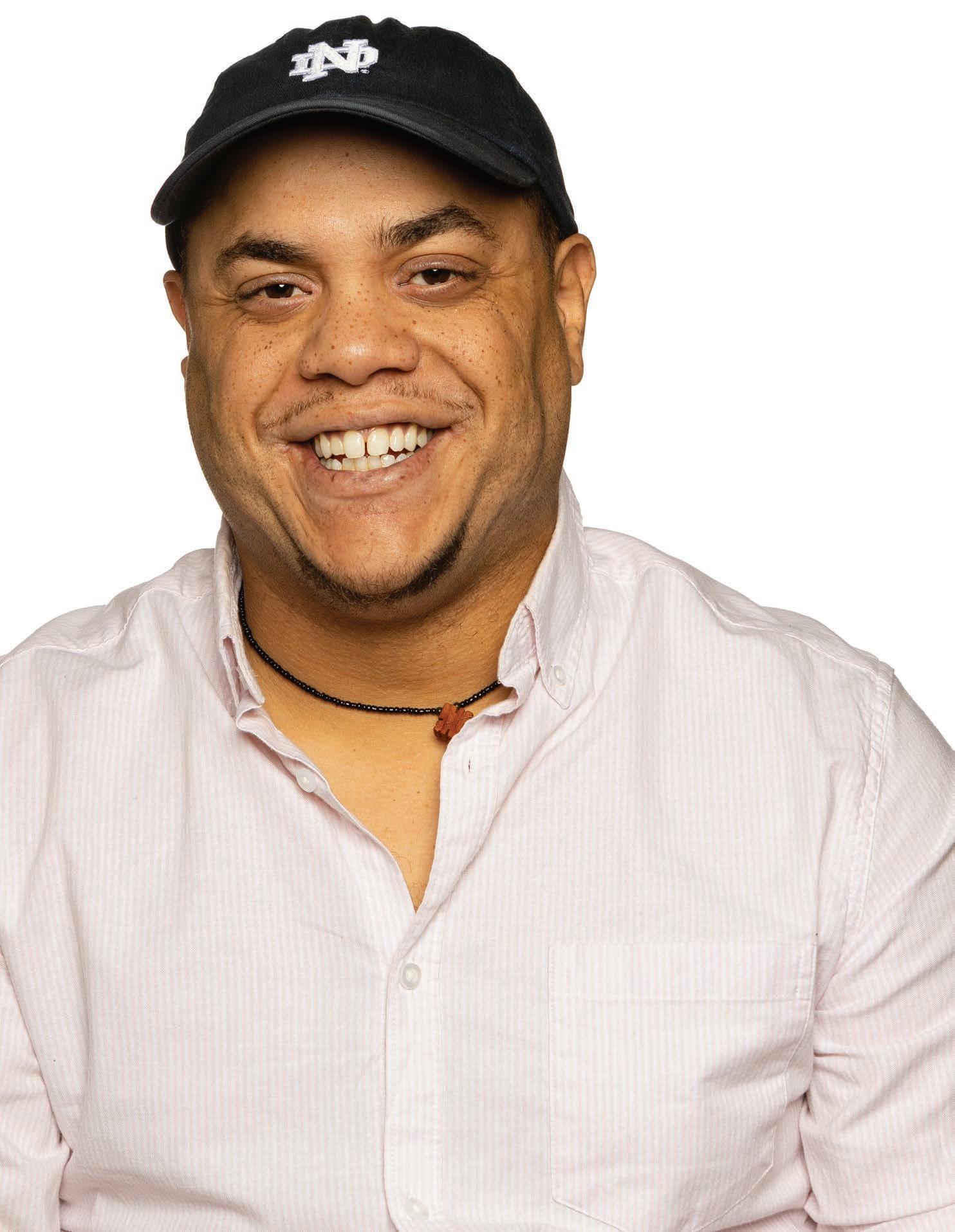
J oseph Luten had to overcome a lot in his quest to become an entrepreneur. Two cannabis-related felony convictions made it difficult to find work in the U.S. So Luten started studying to become a sommelier. Through his extensive travels of Europe, he perfected his craft of studying beverages, culture, and how they connect people through bartending. While visiting his then friend (and now wife) Afomia, he was introduced to coffee ceremonies in Ethiopia.
“When I had my first sip, I was taken aback by the earthy notes of the flavor and it changed my entire perspective,” he says. “I came home with some coffee and started asking people if they wanted to try it. We did a soft market push with 200 samples and our business card.”
The coffee was a huge hit and after working the farmer’s market circuit in north central Indiana, Luten leveraged that attention to build relationships with local media outlets and partners like Meijer and Notre Dame.
“We were invited on WSBT [the South Bend CBS affiliate TV station] on National Coffee Day to do a coffee ceremony because the host of the show loves our coffee. The South Bend Tribune also did a story when we were set to launch,” said Luten. “The story then got picked up in Ethiopia and in one day it got a quarter million views.” He estimates that the product will be in 60 stores by spring 2023.
Though Luten has enjoyed a lot of success, the ultimate goal is to change lives by building a community for homeless children and women in Ethiopia. Core to the entire business' existence, Joseph and Afomia dedicate 25 percent of their profits to the eradication of youth homelessness.
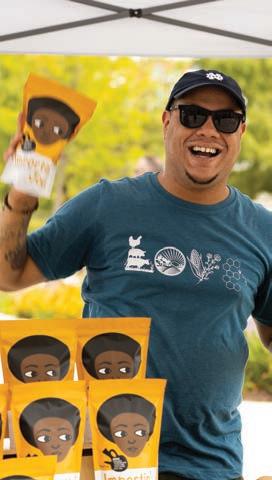
“My hope is to take five percent of our profits and distribute microloans to Black businesses to create a pipeline for entrepreneurs who want to bring consumable goods to market. We’ll also give them vocational support,” said Luten. “I want to see everyone have equal opportunity and exposure for their enterprises.”
JOSEPH LUTENI came home with some coffee and started asking people if they wanted to try it. We did a soft market push with 200 samples and our business card.”Northern Indiana Stage in Journey 03Growth KLEIN ILELEJI
Everything is manufac tured here in Indiana and I can easily work with local suppliers.''
JUA Technologies International
While working on a project supported by the USAID, Nigerian-born Purdue Professor Klein Ileleji began exploring ideas for improving solar-powered food dehydrators.

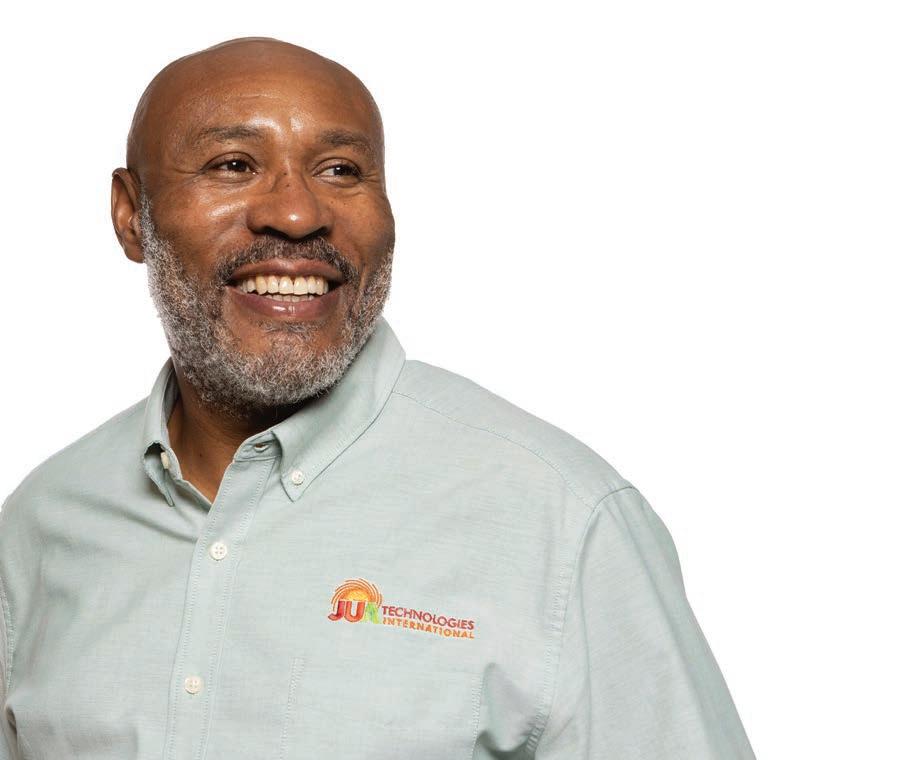
While the project focused solely on maize drying, lleleji quickly set out to improve upon technologies for a food drying system workable for more kinds of crops, especially the more perishable nutrient-rich fruits, vegetables, herbs and medicinal plants. Drying solutions for these crops was what Ileleji saw people demanded.
Ileleji’s designs first mimicked what he saw in the fields of Ghana, where women cooked and dried food around fires. “Going back to African countries, I could see where the technology gaps were,” he says. “My goal was to close those gaps, not only in terms of making technologies readily available to farmers and home gardeners, but also ensuring that people have support and training to help shape this technology.”
JUA Technologies International was established in 2016, when Ileleji received seed money and support from Purdue’s Ag-Celerator program along with funding through Elevate Ventures. Working with the Indiana Small Business Development Center (SBDC) Export Indiana Accelerator Program, JUA has filled orders from across the globe, including 1,000 units purchased by the Food and Agriculture Organization of the United Nations in Kenya, and 8,000 units supplied to the Kenyan government to address food security issues resulting from the COVID-19 pandemic.
The company continues to form strong partnerships within the state’s ecosystem. “When things like the COVID-19 crisis hit, there’s nothing like having everything here at home,” Ileleji says. “Everything is manufactured here in Indiana and I can easily work with local suppliers.”
The next phase for JUA Technologies is to establish a solid management team for the future while attracting even more investors. Ileleji hopes to balance his work at Purdue with his role within the organization to focus more on technology and innovation. His goal is to have his drying units help preserve food to sustain people across the world.
Indiana
“MY GOAL WAS TO CLOSE THOSE GAPS, NOT ONLY IN TERMS OF MAKING TECHNOLOGIES readily available TO FARMERS, BUT ALSO ENSURING THAT PEOPLE HAVE support AND training TO HELP SHAPE THIS TECHNOLOGY.”FLORA BARRÓN
Flora Barrón is a serial entrepreneur who believes in providing her city with quality food options. She first began her journey with a food truck in 2017.

Now she and her husband, Samuel Barrón, own Kanela Blended Drinks, Coffee, and Bites, and Flora & Lily’s Mexican Kitchen. They plan to open a new restaurant, Pikoso Burrito Company, in fall 2022.
As an entrepreneur, Barrón knows the value of leveraging connections. “It is important to be resourceful, to be resilient, and to strive for excellence,” Barrón says. Her advice to young entrepreneurs? "Go for your dream and don't be afraid to ask for help." Hailing from Monclova, Mexico, Barrón’s goal was always to open a business in the U.S. She comes from a family of entrepreneurs, so she never knew what it was to work for someone. The bureaucratic effort required to open a business deferred her dream. But after working as a teacher for many years, she decided it was time to set her business plans in motion.
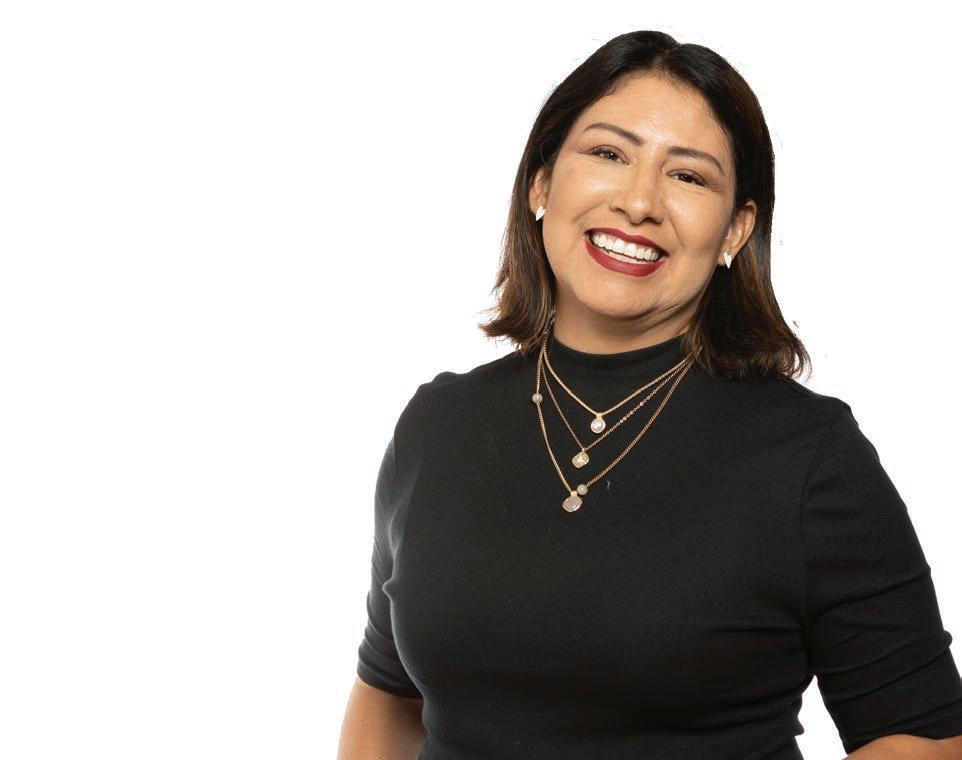
She first reached out to SCORE, a resource for entrepreneurs in need of mentorship. She rough-drafted her plan. The Fort Wayne Food Truck Association was a big help to her on the byzantine subject of regulation. After enrolling in classes with SEED—a hands-on program that helps Fort Wayne entrepreneurs solidify every aspect of owning a business—Barrón signed a lease in a prime refurbished storefront on Harrison Street.
Barrón says that in the food business, it can be hard to establish yourself. She lets the quality of her products do the talking. She knows that her eateries’ ambiance and product will give her validation in the community, and she has gotten it. Her businesses boast a 4.9-star rating across all platforms, and have almost 10,000 loyalty members.
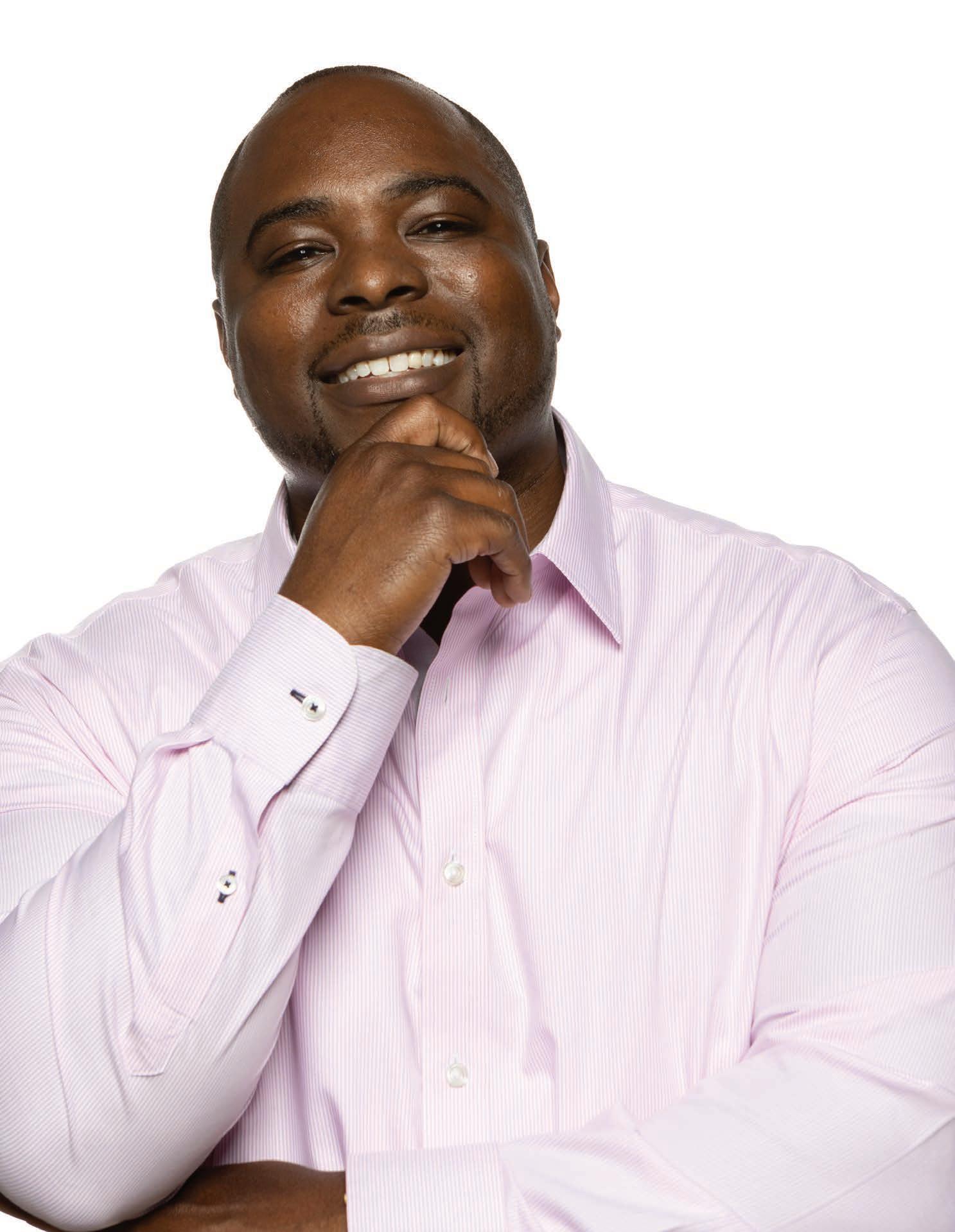
Donte Wilburn’s life forever changed in 2004. Wilburn was arrested for dealing drugs and was facing eight years in prison. The judge, who became Wilburn’s mentor later in life, instead sentenced Wilburn to community corrections where he could complete his Purdue University degree and participate in a work release program.
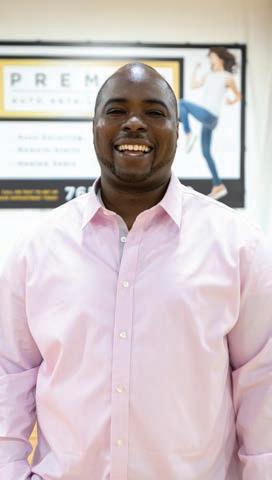
Wilburn worked for a local auto detailing shop while on work release. When this business closed in 2008, Wilburn went to work as a manager at Mike Raisor’s Ford dealership. It was in this role that he met his business mentor, first investor, and biggest supporter, Michael Raisor.

In 2020, Wilburn was scheduled to open a second Premier Auto Detailing location then COVID-19 hit. He considered not opening the location, but guidance from another business mentor and Wilburn’s Indiana Small Business Development Center (SBDC) advisor encouraged him to go for it. Within a year of launching Premier Kokomo, Wilburn’s business was profitable. Both Premier Auto Detailing locations survived, and even thrived, during the pandemic.
Wilburn’s success doesn’t stop there. When the local youth sports facility was at risk of being sold and its future uncertain, he and a team of fellow dads and coaches came together to purchase Legacy Courts. They made significant facility upgrades with the goal of making Legacy Courts a bright, safe space for youth. The results were immediate.
“The community started pouring in,” Wilburn said. “It really, really supported us.”
Sales doubled, and area businesses lined up to buy sponsorships. Today over 1,000 local kids use the facilities, including around 60 club teams. Doing good has been good for business, because annual revenue has grown from around $500,000 when they purchased the place, to more than $1 million now.
Wilburn’s entrepreneurial spirit and mission to pay it forward didn’t go unnoticed. In 2021 Wilburn was recognized as the Indiana SBDC Entrepreneur of the Year, and in 2022 he was selected as Indiana’s Small Business Person of the Year by the U.S. Small Business Administration. Wilburn was recognized by Governor Holcomb and the General Assembly during the 2022 State of the State Address.
The community started pouring in. It really, really supported us.”
Their goal is to be in 40 states by the end of 2023—and elevate to a national brand. After that, they could go international.''
And for Jill and Bryce Morrison, co-founders of Mom Water fruit-infused vodka water drink, now available in 35 states, it was pretty simple: the first happy customer was Jill herself.
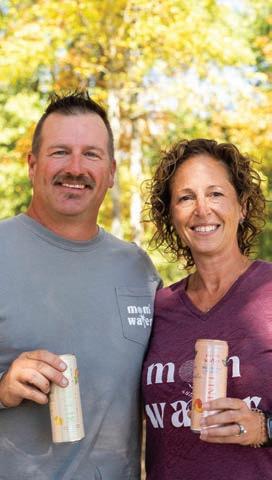
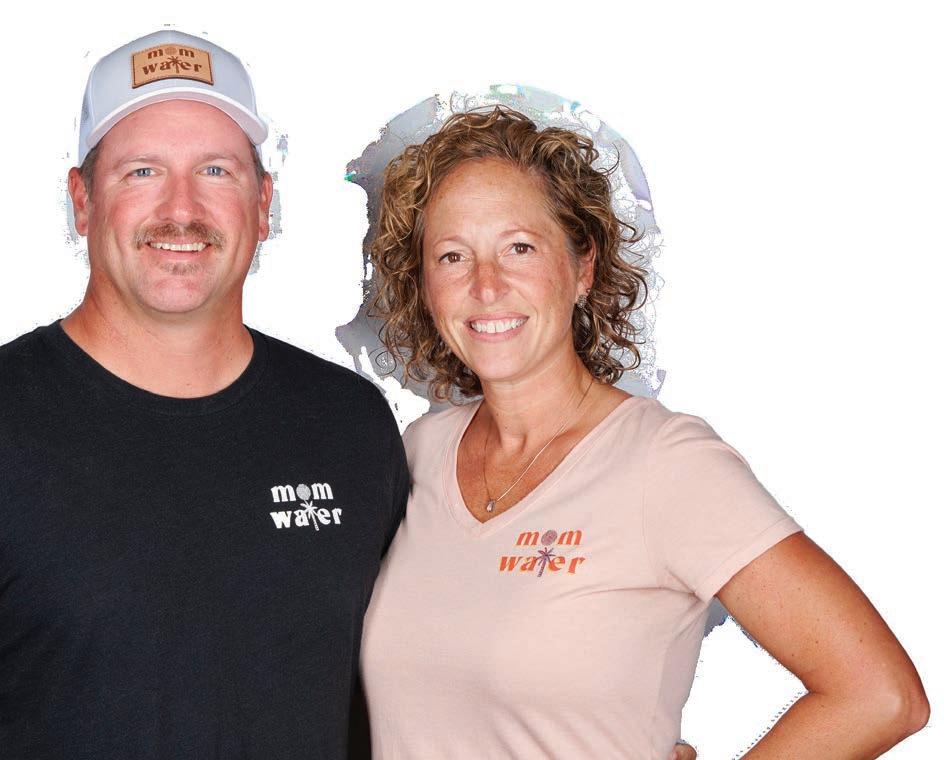
In 2018, Jill and Bryce were vacationing in the Dominican Republic. Not being a seltzer fan, and in search of the perfect poolside drink, Jill took the passion-fruit-infused water provided in the hotel’s self-serve carafes, filled her own cup, and asked the bartender to add a splash of vodka. By summer 2019, Jill was filling endless water bottles at home with her special beverage—and establishing a new favorite drink among friends. After one of the kids inevitably reached for the drink, Jill began scribbling “Mom” on the side of her concoctions. The product was not only launched, but named.
But, as any alcohol industry veteran could tell you, there’s a world of difference between having something your friends like and successfully marketing a new product. Bryce recalls: “Even some industry people told us, ‘You know, I would take whatever money you’ve spent so far and probably stop. It's just such a tough industry.’”
But persistence paid off. Mom Water blew up, especially after the couple brought in a long-time friend, John Bell, as a partner. The Ferdinand community supported the endeavor, too, and buyers and distributors lined up to support Mom Water. The Morrisons partnered with an Indy manufacturer, Indiana Target, Meijer, and Walmart opted to carry it in all their stores, off-cycle, and Jill and Bryce quit their day jobs.
Their success has “snowballed,” in Bryce’s words, and they’re now poised to be a one-in-a-million success story. Their goal is to be in 40 states by the end of 2023—and elevate to a national brand. After that, they could go international.
All from a happy afternoon by the pool back in 2018. As Jill recounts, “Our story really began as a celebration of moms. We see it as a tribute.”
"Identify customer base” is a logical early step in the entrepreneurial process.
Indiana
“OUR STORY REALLY BEGAN AS A celebration OF MOMS. WE SEE IT AS A TRIBUTE.”
It takes a little longer than it might for someone with a bunch of investment dollars, but it’ has earned us respect in the space community.”
Satellite manufacturer NearSpace Launch has made a big name for itself by staying small.
Its production facility, an unassuming building in Upland makes some of the smallest satellites ever to reach earth orbit.
“We’re the largest small satellite manufacturer in the Midwest,” says COO Matthew Voss.

Founded in 2014, NearSpace has built more than 100 satellites. Some are about the size and thickness of a single ceramic counter tile. Others are stackable 3.9-inch cubes called CubeSats, which can be launched individually, or assembled, Lego-style, into larger spacecraft. The company also sells advanced communications systems and sensors.
“Lots of people come to us with an idea, and we help build the satellite for them,” says Voss. “We also do the environmental testing, and the vibration testing to make sure the unit can stand the stress of a rocket launch.”
The company’s headquarters also houses NearSpace Education, its STEM-focused nonprofit arm. They’ve already held their first “space camp,” and plan to offer more events soon, including high-altitude balloon launches.
“We see education as part of our mission, and we want to bring impact to our area,” Voss says. “We want to help plug Indiana into the space sector.”
Instead of seeking outside financing, NearSpace got its startup funds from its co-founders, Chief Scientist Dr. Hank Voss (Matthew Voss’s father) and Chief Engineer Jeff Dailey. The company keeps growing thanks to the numerous contracts it’s landed from clients like Space Force and NASA.
“The team sacrificed at first, but we’re getting established,” Voss says. “It takes a little longer than it might for someone with a bunch of investment dollars, but it has earned us respect in the space community.”
In the future Voss wants NearSpace to become a technology leader. But for now, he’s happy being billed as the Hoosier state’s homegrown satellite company.
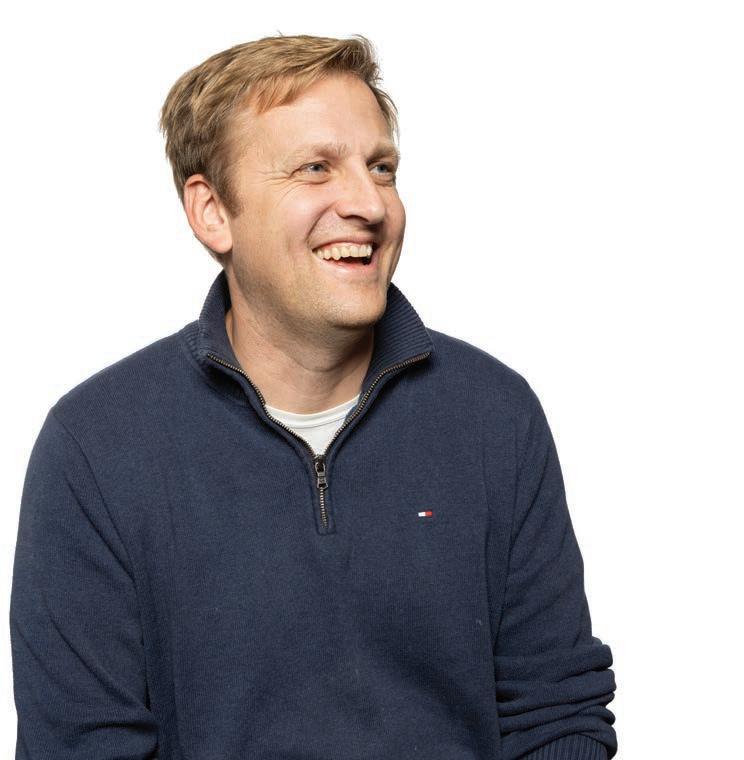
“WE SEE education AS PART OF OUR MISSION, AND WE WANT TO BRING IMPACT TO OUR AREA,” Central Indiana
We participated in a unique way, helping with the supply chain mechanism of the COVID-19 vaccine.''
In 2018, Darren Thompson gathered a group of fellow Eli Lilly retirees to discuss their futures, and how they could collaborate on something big.


Thompson told the group he would take care of the administrative and marketing sides of any new business they wanted to form.
That small team is now a company of more than 80 professionals, from novice talent to “semi-retirees,” as Thompson refers to the former Eli Lilly employees. A pharmaceutical engineering consulting business based in Franklin, Process Alliance helps pharmaceutical, bio-agricultural, and other life sciences companies solve complex problems. Services include process and instrumentation design, manufacturing execution, engineering and science technical expertise, project delivery, and operational excellence.
The company has helped deliver a facility for a new radioactive oncology medicine targeted for prostate cancer. They also played a role in mitigating the COVID-19 health crisis: in 2020 and 2021, ten Process Alliance team members supported eight different COVID-related projects to fast track the manufacturing of the vaccine.
“We participated in a unique way, helping with the supply chain mechanism of the COVID-19 vaccine,” says Thompson. “We worked on the three major ones: Pfizer, Moderna, and Johnson & Johnson. Not directly with the companies, but indirectly with their contract manufacturers.” Leveraging a network from Thompson’s 30 years of life science experience definitely greased the wheels.
Process Alliance is now looking to bring on experts from the liberal arts and education fields, since technical writing is a much-needed skill identified by clients. Adding communications expertise to its engineering and manufacturing resources means Process Alliance will round out an already robust set of services.
DARREN THOMPSON
"PROCESS ALLIANCE HELPS PHARMACEUTICAL, BIO-AGRICULTURAL, AND OTHER LIFE SCIENCES COMPANIES SOLVE complex PROBLEMS."
Instead of spending what can be several days trying to connect with candidates, interviewers who use Qualifi usually get interviewee information within 24 hours.''
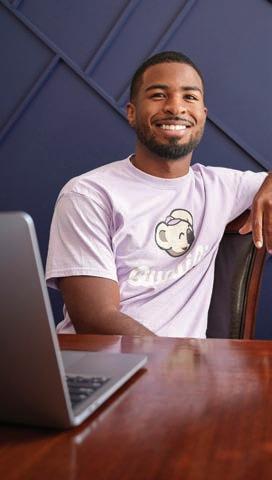
Qualifi Brothers Darrian and Devyn Mikell never felt like they were being efficient in their hiring roles.
Darrian, who oversaw hiring at an e-commerce company, filled his time with screening phone calls. Devyn was in a similar situation. He spent hours— sometimes days—screening candidates for an in-home senior care provider. The brothers shared the same pain points: scheduling burnout, phone tag, ghosting, and lengthy hiring processes.
So in 2018, with support from venture firm Sixty8 Capital and HR software leader Phil Daniels, the Mikells launched Indianapolis-based Qualifi. The on-demand interview platform has been called “the fastest phone interview experience.” Qualifi allows recruiters and hiring managers to interview up to seven times more candidates without scheduling a single call.
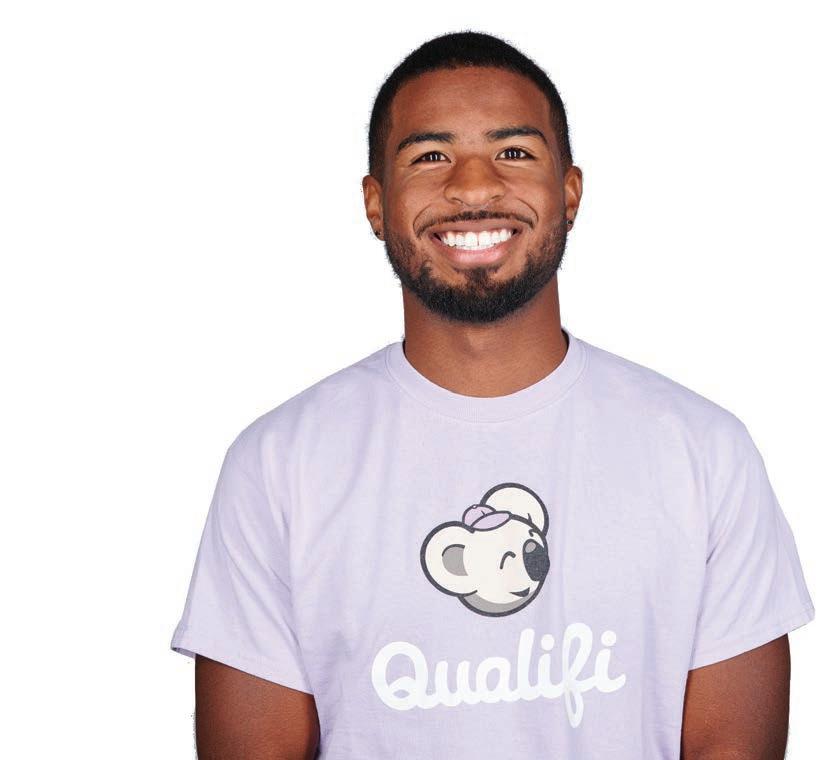
“Recruiters pre-record questions using Qualifi and send candidates a link to the tool via text or email,” says Devyn. “A recruiter may ask, ‘Why are you interested in joining our company?’ After that, a tone sounds. After hearing the tone, the candidate responds, records the answer, and hits the pound sign to proceed to the next question.”
Instead of spending what can be several days trying to connect with candidates, interviewers who use Qualifi usually get interviewee information within 24 hours. It is a significant advantage for industries with high turnover, including healthcare. In fact, Indiana-based Reid Health, and Michigan-based Trinity Health, one of the largest healthcare providers in the U.S., use Qualifi.
Now the Mikell brothers are waiting for the world to catch up. “Talent acquisition is often overlooked from a budgetary standpoint,” says Devyn. “There are many HR and hiring professionals who understand the value of our tool, but aren’t given the resources to purchase it. Our challenge is finding the right people and companies that understand and appreciate the time savings, efficiency, and accessibility Qualifi offers."
"OUR CHALLENGE IS FINDING THE RIGHT PEOPLE AND COMPANIES THAT understand AND appreciate THE TIME SAVINGS, EFFICIENCY, AND ACCESSIBILITY QUALIFI OFFERS."
IndianaBRUCE KHALILI
With more than 30 years’ experience in the orthopedic industry, Khalili collaborated with surgeons to solve for efficiency, including eliminating instrument re-sterilization, and addressing the shortage of skilled technicians to process instruments.''
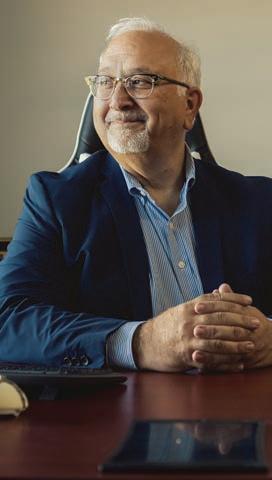

As a child, Bruce Khalili was hospitalized for several months with an infection resulting from unclean surgical instruments.
The experience left a lasting memory. So as a mechanical engineer, he decided to pursue solutions for improving medical devices. “One of the biggest sources of surgical inefficiency is washing and sterilizing instruments over and over to the point they are so dull that they can no longer be used,” Khalili says. “If new, sterilized instruments can be provided for each surgery and at a reasonable price, it will reduce costs for hospitals and ambulatory surgery centers.”
With more than 30 years’ experience in the orthopedic industry, Khalili collaborated with surgeons to solve for efficiency, including eliminating instrument re-sterilization, and addressing the shortage of skilled technicians to process instruments. RAZOR Medical Instruments, Inc. was established in 2016 to streamline the handling of and design of surgical tools.
A RAZOR single-use instrument developed for hip replacement surgery decreased the amount of time for a surgeon to ream a hip from four to five minutes to 20 seconds, with greater precision and ease of use. Ironically, orthopedic surgeons stand a significant chance of requiring shoulder surgery of their own at some point during their careers due to physical strain. The RAZOR instrument greatly reduces a surgeon’s required exertion, and equalizes effectiveness for a surgeon who is 6’2” or 5’4”.
In 2021, RAZOR relocated its headquarters from New Hampshire to Warsaw due to the town’s deep-rooted history in the orthopedics industry and experienced talent pool, and OrthoWorx in Warsaw and Indiana Economic Development Corp (IEDC) assisted in helping to meet company goals. Capitalizing on the state’s manufacturing expertise, RAZOR is set to launch additional single-use instruments by the end of the year, with the goal of reaching 19 total. “This will make us one of the chief players in the industry,” Khalili says.
Indiana
"RAZOR IS SET TO LAUNCH ADDITIONAL SINGLE-USE INSTRUMENTS BY THE END OF THE YEAR, WITH THE GOAL OF REACHING 19 TOTAL. 'THIS WILL MAKE US ONE OF THE chief players IN THE INDUSTRY."
To achieve this goal, the health technology company is simplifying the administrative burden on providers so they can get medications to patients more quickly.
“When it comes to specialty medications—such as for rare diseases or cancer—providers fill out a lot of paperwork and go back and forth with pharmacies,” says health tech veteran Julia Regan, CEO and co-founder of RxLightning, located in New Albany. “Sometimes, it takes weeks or even months to fill prescriptions.”
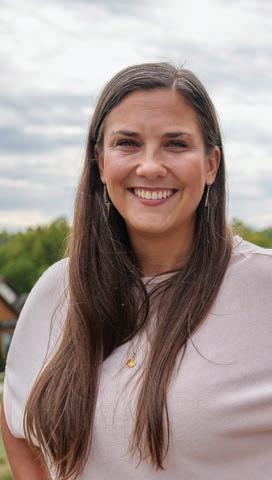
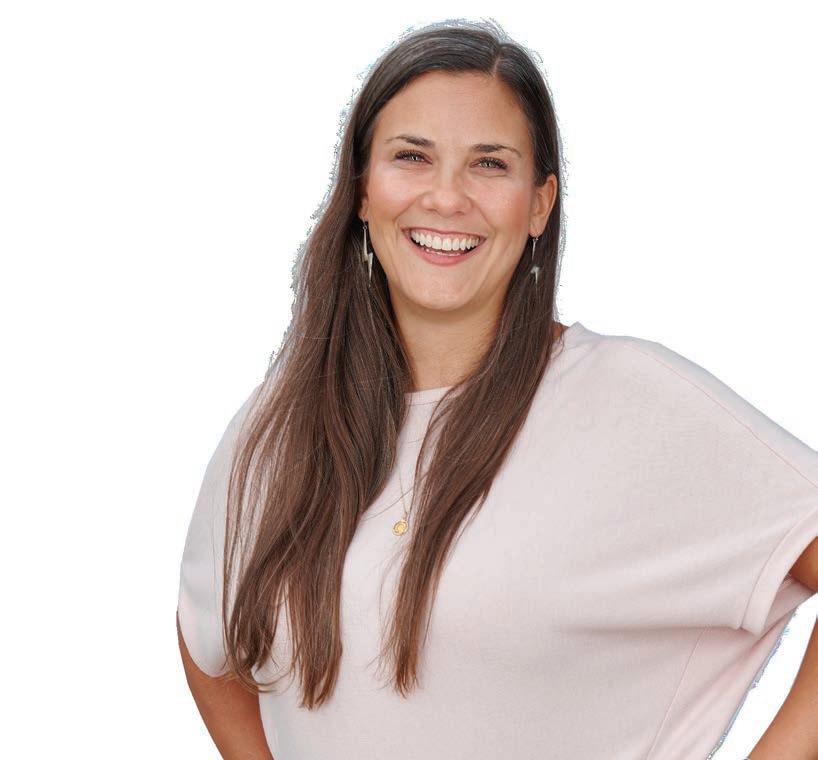
Such long waiting periods for life-altering, and sometimes lifesaving, therapies can take an emotional toll on patients and their loved ones. RxLightning solves this by simplifying, streamlining, and automating specialty medication enrollment— shrinking the gaps between patients, healthcare providers and specialty pharmacies. In one success story, a typical four-day wait for a mediation was reduced to 3.5 hours.
On the platform, digitized forms are available for more than 1,200 specialty medications, from immunology and rheumatology to dermatology (a $30,000 oncology medication is even on the list). To create the platform, Regan and RxLightning Co-Founder Brad Allen partnered with First Databank, the designer of a trusted drug database. They also received $3 million in seed funding from HealthX Ventures, a venture capital firm. The pair has big plans for 2023.
"We are focused on driving impact in three ways,” says Regan. “First, we want to reach more providers who can help more patients. Second, we want to get to a point where we create jobs and give people new career opportunities. Third, we do not want to be 'just' a product. We want to make a mark on the industry so it’s better tomorrow than it is today.”
RxLightning is on a mission to create a world where every patient gets accelerated access to needed therapies.
We want to reach more providers who can help more patients.''
"WE WANT TO MAKE a mark ON THE INDUSTRY SO IT’S BETTER TOMORROW THAN IT IS TODAY."
We live in a world of Shark Tank and tech companies that expect to blow up overnight.''
In 2009, Amanda Reninger and her husband encountered health problems that subsided after they switched to a vegan diet.
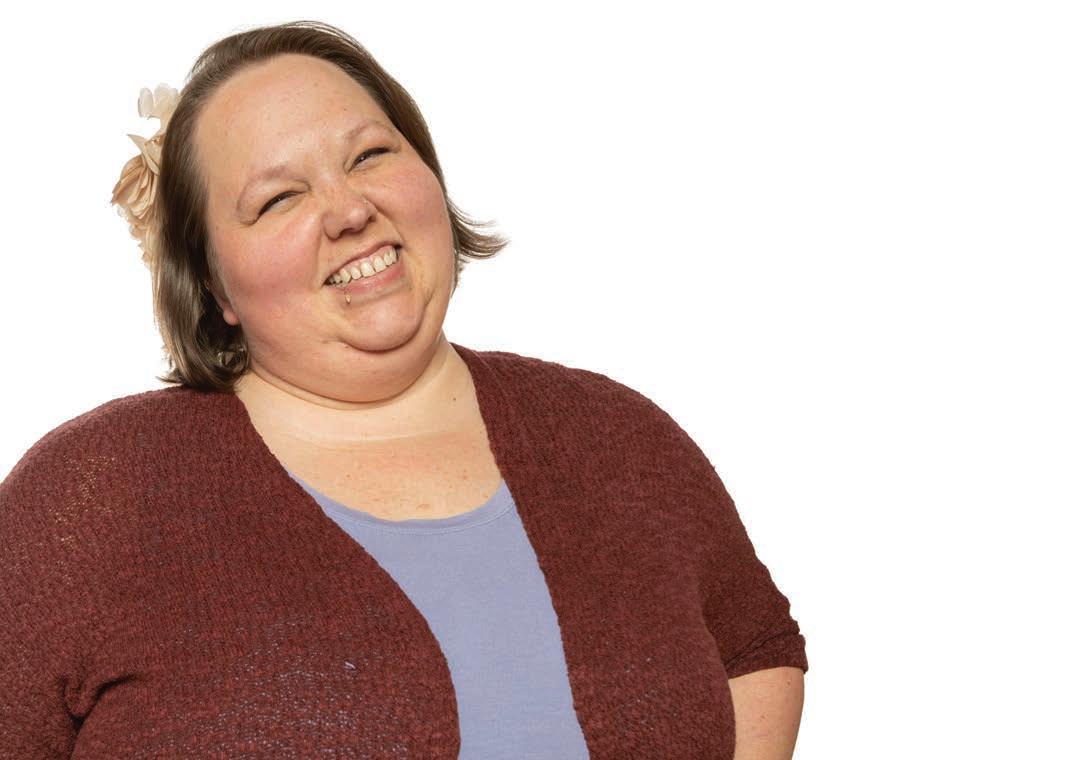
Vegan foods were still scarce in restaurants and stores so the couple prepared most of their meals at home.
Noting the meager options available, Reninger eyed people with food sensitivities as a possible market. “I knew the need wasn’t huge, but there were only a handful of vegan brands, and I wasn’t able to find those things here in Muncie,” she says.
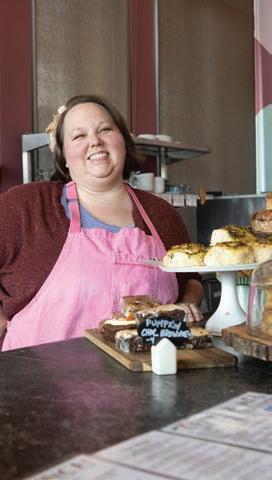
To fill the void, Reninger established Sea Salt & Cinnamon in 2014. Starting small with vegan cookies and cupcakes along with gluten-free options, the company’s first baked goods were made in a community kitchen. “It was really hard for people to understand that you could be a legitimate business and not have a storefront,” she says.
Early on, Reninger wondered how she would ever expand without taking on debt. Everything fell into place when she settled into a deliberate pace that has grown the company to 15 employees. Sea Salt & Cinnamon’s customers are hospitals, universities, and small coffee shops throughout Indiana, as well as consumers at various farmers markets and parents seeking birthday cakes for their allergysensitive kids, longing for treats they can eat.
Sea Salt & Cinnamon opened its first retail shop in 2021, claiming a visible corner spot on Muncie’s iconic Patterson Block. “We’ve always done things kind of slow and steady,” Reninger says of the seven-year journey between start-up and storefront. “We live in a world of Shark Tank and tech companies that expect to blow up overnight. I like the phrase, ‘It takes ten years to blow up overnight.’”
We created a sustainability tracking system for coffee from farm to cup that eliminates nine layers of intermediaries, increasing revenue for farmers and restaurants. This is just one example of the benefits of our blockchain solution."
In fact, for big enterprises and the U.S. government, it is a game changer. And Bryan Ritchie and Ian Taylor are leading the way at South Bend-based SIMBA Chain—short for Simple Blockchain Applications—by streamlining process automation through blockchain.


"We created a sustainability tracking system for coffee from farm to cup that eliminates nine layers of intermediaries, increasing revenue for farmers and restaurants," says Ritchie. "This is just one example of the benefits of our blockchain solution."
Blockchain captures data using API (application programming interface) technology. It helps prevent transaction fraud by removing intermediaries and reducing potential errors. Some applications of blockchain include asset tracking, procurement, delivery, and supply chain. The current challenge is building solutions on blockchain.
In 2017, the Defense Advanced Research Projects Agency (DARPA) sent a request for proposals to secure classified information on the blockchain. A group from the University of Notre Dame responded and built the system, including Ritchie who was the VP of Innovation, and Taylor, a peer networking expert at the university's Center for Research Computing. The DARPA project was the impetus for SIMBA.
Today, SIMBA has more than 50 employees and is a leader in Web3 solutions, the new iteration of the web, in Indiana. Clients include large enterprises like Caterpillar, various restaurant chains, system integration companies like the U.S. Air Force, and other military and government organizations. Ritchie believes that now is a time of major transformation in decentralizing solutions, and the next generation leading the way in Web3.
“There are a lot of young entrepreneurs who are getting into this space right now, and I see that as being a big driver as we go forward,” says Ritchie. “We have to do all we can to help facilitate that growth.”
"Blockchain" may not yet be a household name, but it’s one of the hottest buzzwords in business.
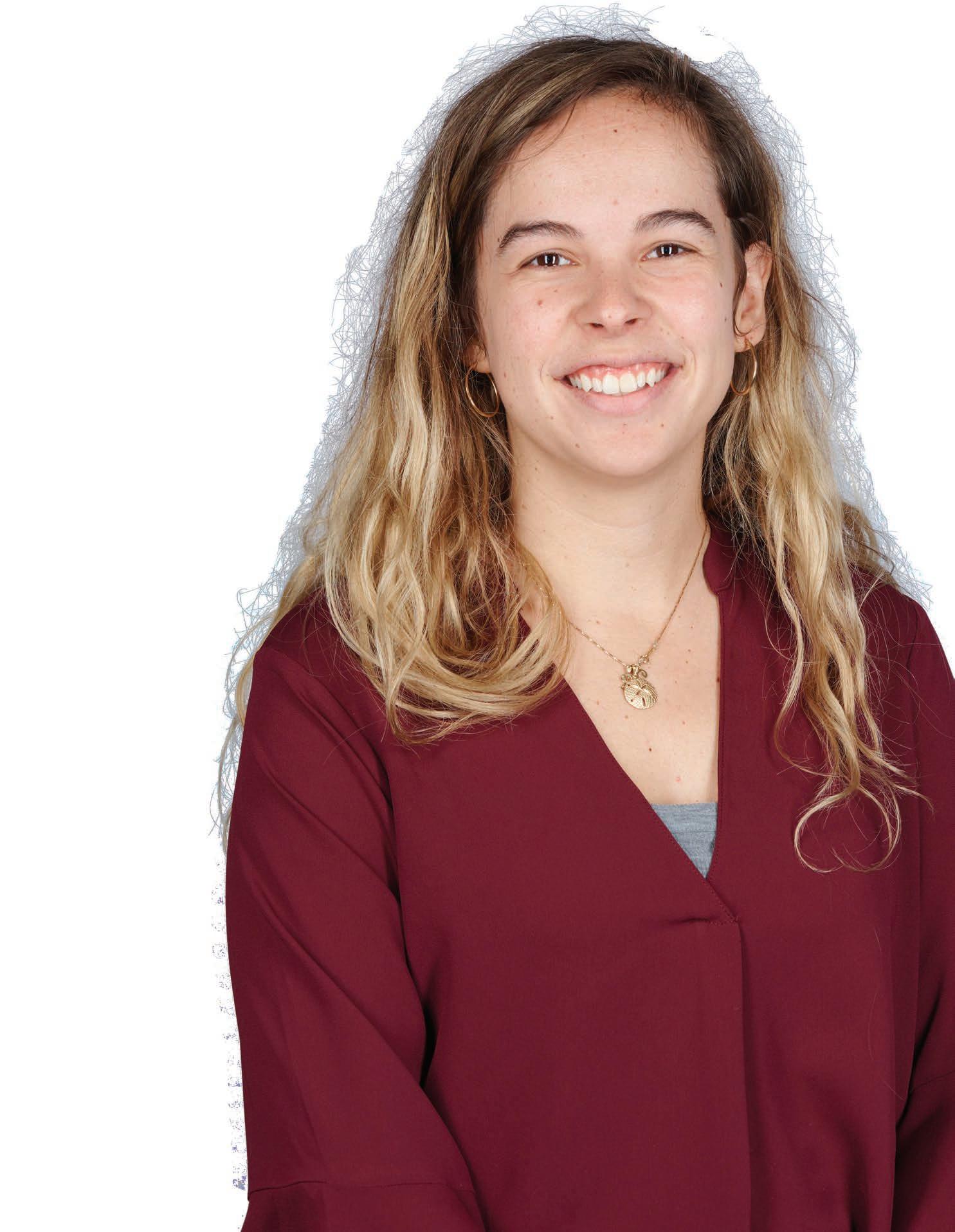
Food crops are reliant on pollinators’ labor. So what’s happening inside a beehive is of great interest to farmers who rely on them. Ellie Symes is CEO and co-founder of The Bee Corp, which aims to help farmers and beekeepers assess beehive health.
The Bee Corp offers Verifli, a beehive strength grading service powered by infrared image analysis and data analytics.
The company evolved from a Beekeeping Club that Symes started at Indiana University with co-founder and COO, Wyatt Wells. The duo presented their concerns about threats to the honey bee population to the IU Foundation; board members encouraged them to imagine solutions to the problem. Symes and Wells got to work, and ended up winning $100,000 in a business plan competition and attracting the attention of startup funders. Symes and Wells were helped through funding and through guidance from the National Science Foundation, IU Ventures, IU Angel Network, The Mill, gBETA cohort, and CICP, to name a few. It took years to achieve accuracy with their product. Once they did, they knew it was a turning point.
Now, The Bee Corp is doing business across five continents. Their goal of Verifli is to make communication between beekeepers and farmers easier, evaluate the strength of beehives for optimal crop production, and to make agricultural pollination season less stressful.
Looking at the entrepreneurial ecosystem overall, Symes says that since 2016, resources for early founders have improved, but she’d like to see more opportunities for early stage entrepreneurs—which would yield a more diverse set of business founders. She calls it luck that they were invited to tap the IU Foundation network of funders that enabled the initial business plan.

“There are so many founders out there—pre-product or early product—that have wonderful ideas, but don’t have those networks,” Symes says.
 ELLIE SYMES
ELLIE SYMES
“THERE ARE SO MANY FOUNDERS OUT THERE—PRE-PRODUCT OR EARLY PRODUCT— THAT HAVE wonderful ideas, BUT DON’T HAVE THOSE NETWORKS."
THE BEE CORP
My favorite of these experiences is when customers call us back immediately after grading their hives asking us if we can squeeze in a few more for them! '' Central Indiana
The creative satisfaction for me is when I hear how they’ve freed up so much of their evening time to be better spent with family and friends, as a result using our technology. That’s the key for us.”
Now, through Auburn-based Traction AG’s all-in-one farm management software, more answers than ever are in *the* cloud.
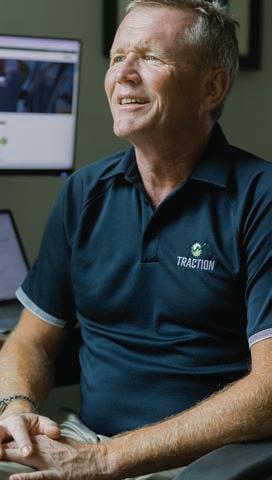

Agriculture’s one of the most challenging businesses to manage and operate, according to Ian Harley, company co-founder and CEO, and not just because it’s a delicate dance with Mother Nature. “I was out on a farm visit last week, visiting one of our grower-investors,” Harley recalls. “This person is handling multiple entities in different states; he’s dealing with crop insurance; he’s dealing with landlordtenant arrangements. And he’s obviously dealing with the marketing of his crop.” By integrating accounting, payroll, field operations, and agronomy into a single platform, perpetually accessible from any connected device, Traction aims to consolidate information and provide real-time insights.
In doing so, Traction has grown healthily since its founding in 2020, now counting 15 full-time employees and a few more on contract. Harley envisions doubling that number in the next year or so, and credits the Indiana Economic Development Corp (IEDC) and Elevate Ventures, as well as help from the DeKalb Chamber, with supporting Traction’s evolution to date. It’s been in part through the Chamber’s networking events, he notes, that the Traction team has been able to share ideas and mentorship with other local tech companies—a boon to the company’s success.
“Every sale to a customer forms a special relationship for us,” Harley reports, and the feeling seems mutual. The 4.9-star rating at trusted business software review site Capterra touts the breadth of the software’s capability as well as the team’s responsive support.
Farming itself may not be getting easier, but Harley is optimistic. “As long as you listen to your customers and pay attention to their challenges, and try to develop supportive technology for them, you can build a successful company. And that’s the goal of Traction.”
For millennia, farmers have looked to the clouds to predict their crops’ success.
We found all these people who were interested in watching us grow and believing in what we were doing.''
Several years ago, Traduality Language Solutions co-founder Diego Achio was visiting Japan when he became ill.
“Even though I speak Japanese at an intermediate level, my language skills weren’t good enough to explain my symptoms to a doctor,” says Achio, a native of Costa Rica who was making his living as an independent language translator at the time. “I tried to use Google Translate, but the nurses were giggling, and it just wasn’t working.” The problem was quickly resolved after Achio phoned a colleague who was proficient in Japanese.
Afterwards, he couldn’t stop thinking about the numerous situations around the world that require a quick, accurate translation. Eventually, a strategy evolved around building an online platform that makes it easy for clients to find qualified translators on short notice.
The result was Traduality, a translation services marketplace founded in Mexico in 2015, incorporated in the U.S. in 2018, and now headquartered in Bloomington. Achio and his wife, Cynthia Herrera, came to the U.S. to join a third founding partner, Rick Rux—all trained in direct sales. The move put Traduality closer to its largest stream of revenue, generated primarily from commissions from each successful transaction.
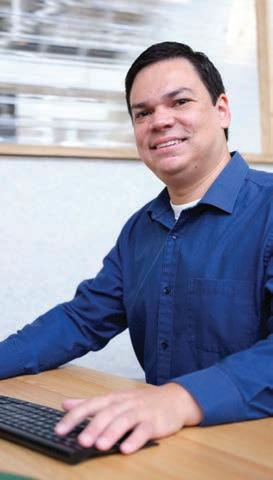
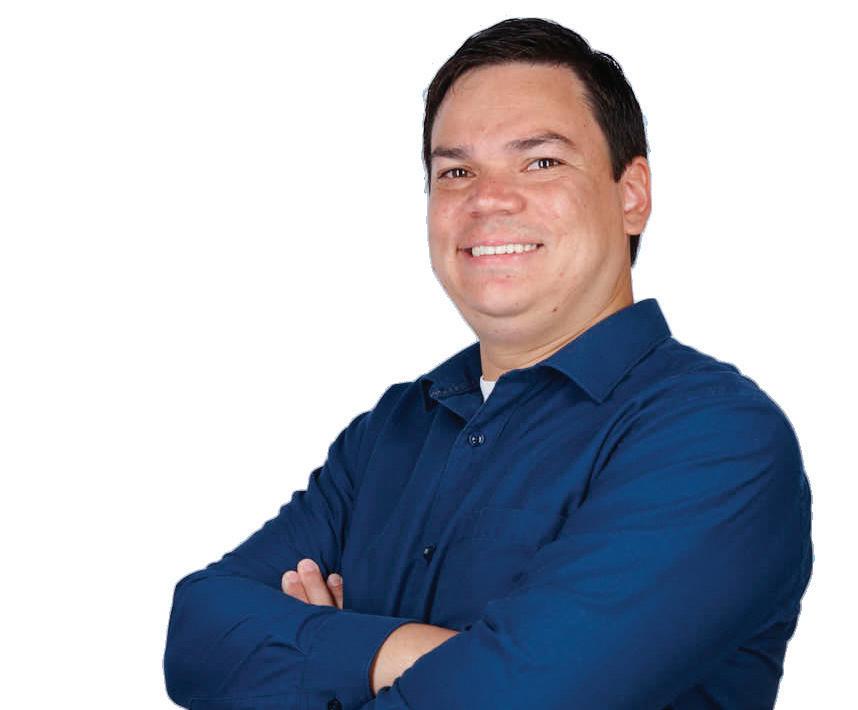
Arranging legal immigration was one of their biggest startup challenges. After landing in Indiana, Achio says “we found all these people who were interested in watching us grow and believing in what we were doing.” Manufacturing businesses are their most common customer.
Their potential to transform the global market for translation services attracted venture capital from Elevate Ventures. Traduality was recruited by Bloomington Remote, a program to attract and reward businesses with perks such as free offices and meeting space—and also selected for Gener8tor’s gold-tier business acceleration program.
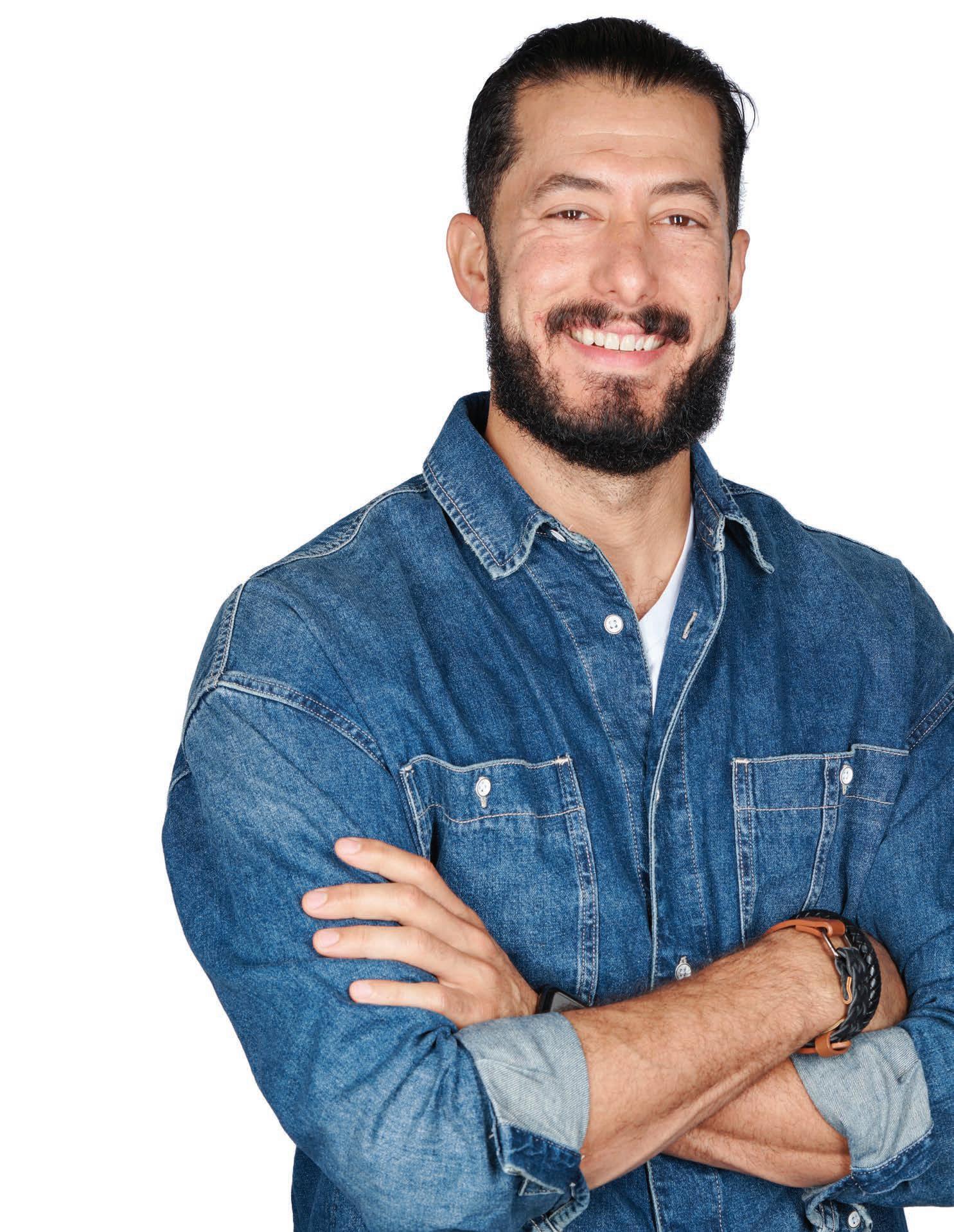
M ost premade, no-carb pizza crusts pack about as much flavor as the cardboard and plastic in which they’re packaged. When Egyptian-American Mohamed Aly’s sister asked him to create a better-tasting crust compatible with her low-carb diet, he invented one with zero carbs and only four ingredients—salt, olive oil, spices, and (surprisingly) chicken.
Aly together with co-founder and Indiana native Omar Atia, parlayed Aly’s invention into an Evansville-based company called ZeroCarb LYFE. Aly serves as Chief Creative Officer, with Atia as CEO and another Indiana native, John Pena, as Chief Growth Officer. Founded in mid-2020, the company generated approximately $670,000 in sales during its first full year of business, with around $14.2 million expected in 2023.
“ The product is perfect for people with dietary restrictions, or who want to reduce carb intake for their health or to lose weight,” Atia says. “The market for this is huge and continues to grow.” One early customer was the grateful mother of an epileptic girl with a gluten allergy who was able to have a pizza party for the first time in her life.
The company first offered direct-to-consumer sales via its website, then made its restaurant debut with a fellow Evansville-based startup, Azzip Pizza. It now supplies over 200 eateries nationwide, and has launched in 80+ Schnucks stores nationwide as it grows into retail. ZeroCarb LYFE completed an oversubscribed $1.5 million seed funding round with Sixty8 Capital and Elevate Ventures earlier this year, and just launched a Pre-A Funding round to keep up with the growth.
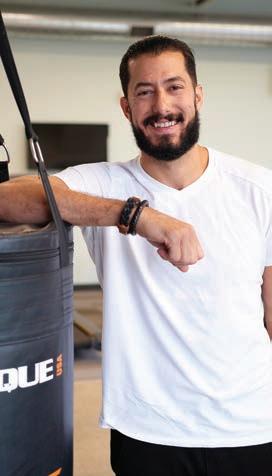
The company doesn’t plan to stop with pizza crust. It sells its own line of frozen pizzas and is formulating several new items, including no-carb taco shells, chips, “bread” crumbs and pasta.
Says Atia: “We definitely have a lot of product in the pipeline.”

The product is geared toward people with dietary restrictions, or who want to reduce carb intake for their health or to lose weight...The market for this is huge and growing.”Southern Indiana Stage in Journey 03Growth OMAR ATIA
NO4
We came in with a solution to take on this backlog and have it done within a week.''
During the height of the Flint, Michigan water crisis in 2015, Megan Glover recognized the need for better water quality testing kits among consumers.
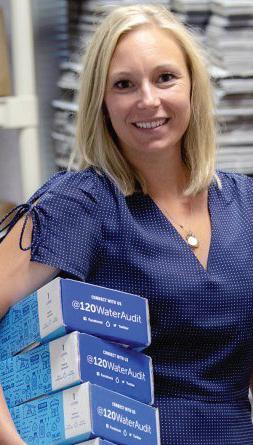
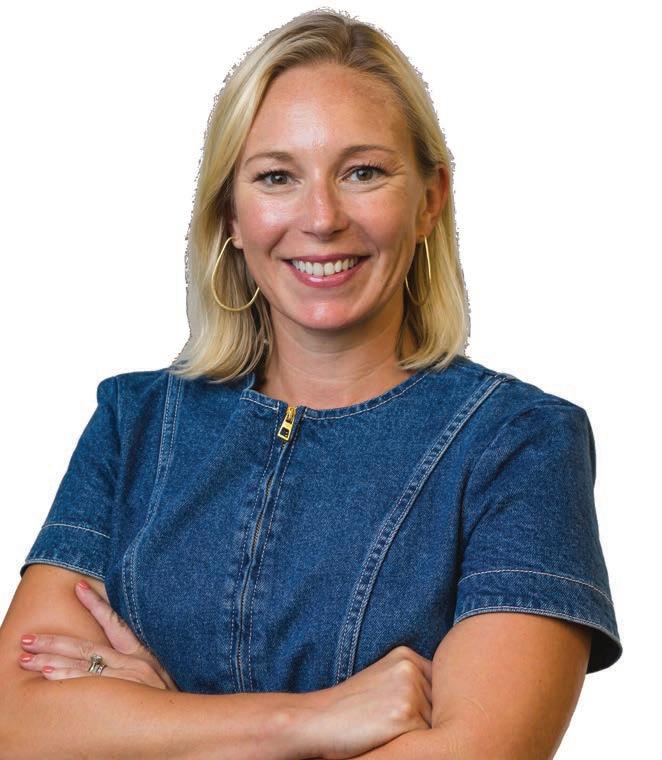
“It seemed odd that in this day and age when you can get your DNA and allergies tested, why can’t you test your water?” Glover says. She and other co-founders launched 120Water in 2016, starting with direct-to-consumer water testing kits.
The company soon saw an opportunity to sell to state and government agencies who manage safe drinking water programs.
One agency, the Pittsburgh Water and Sewage Authority, had exceeded the water lead limit and in response, offered a customer testing program. Their announcement of the program created a tsunami of demand for 4,000 kits that would have taken months to ship and analyze. “We came in with a solution to take on this backlog and have it done within a week,” Glover says. “[The Pittsburgh officials’] eyes lit up because they would not have been able to get to all the customer requests with their field crews handdelivering their own kits.”
Initially financed by the founders, the company won AOL co-founder Steve Case’s Rise of the Rest pitch competition in 2017 and is now venture capital-funded. Through their platform,120Water is helping organizations manage data to better communicate results to the public and government regulators.
The next goal for 120Water is acquiring three percent market penetration along with increasing R&D to expand the company’s current offerings.
"THROUGH THEIR PLATFORM, 120WATER IS HELPING ORGANIZATIONS MANAGE DATA TO BETTER communicate RESULTS TO THE PUBLIC AND GOVERNMENT REGULATORS."MARK & TIFFANY BAKER
We bought our first house sight-unseen at an auction, renovated it, and sold it within a week of listing it.”
Mark and Tiffany Baker were living in Tokyo, Japan when they got a phone call that changed their lives.
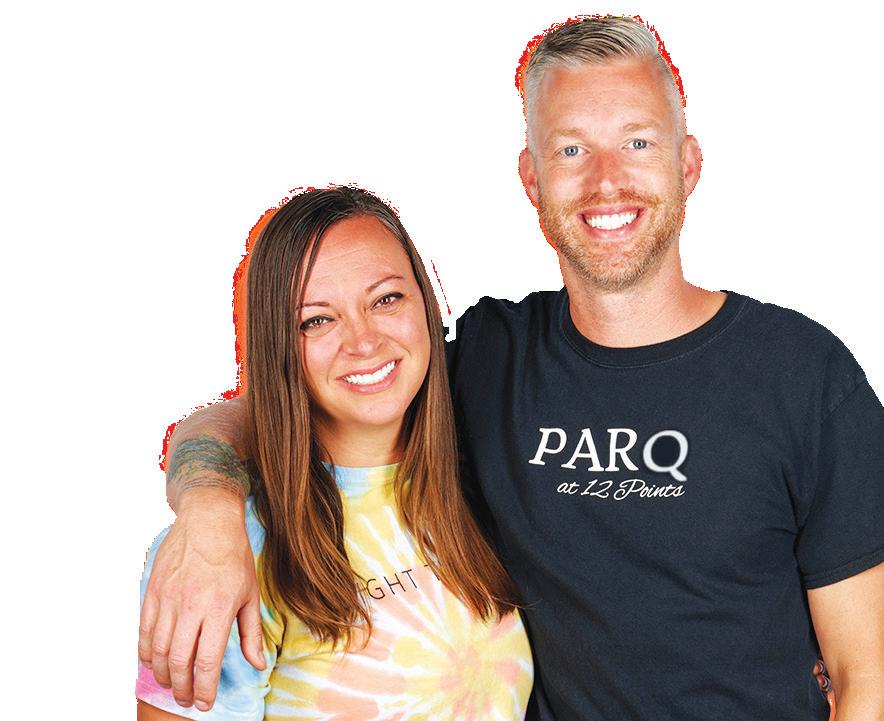
Mark’s father had died. At age 33 and 34, the couple quit their jobs (she was an accountant, he was a banker) and moved back to their hometown of Terre Haute.
There, the two Indiana State University graduates started 3 Sisters Investments, a real estate investment firm aimed at making Terre Haute a better place to live.

“We try to jumpstart different neighborhoods to prove that every piece of our community is worth investment,” says Tiffany. A typical purchase for the Bakers is the neighborhood eyesore, a neglected home or commercial building with sagging gutters and waist-high grass. At any given time, the company is renovating three to four residential properties to sell. They also own several commercial and multi-use properties. “We are doing buildings that have for so long needed someone to come in and really care,” says Mark.
A good day for the Bakers? When a resident stops to thank them for improving the neighborhood. “When you fix up these distressed properties, it brings even more pride to the neighborhood and the community, and it improves property values.”
3 Sisters Investments wasn’t just a whim. Named for the couple’s three little girls, the company is the result of meticulous financial and lifestyle planning. In 2008, the newlywed Bakers joined the Financial Independence and Retire Early (FIRE) movement. By 2019, the couple “had good jobs, but we still had to work 40 hours a week, and whenever I wanted to take vacation, I had to ask permission from another adult,” Tiffany says. “That never sat right.” They decided to take the entrepre neurial leap.
In 2021, 3 Sisters Investments had $1.2 million in real estate sales and earned the Terre Haute Chamber of Commerce Building Community Award. In 2022, the company made the Terre Haute Chamber of Commerce’s 12 Under 40 list, and garnered a Community Impact Small Business of the Year Award from the Indiana SBDC.

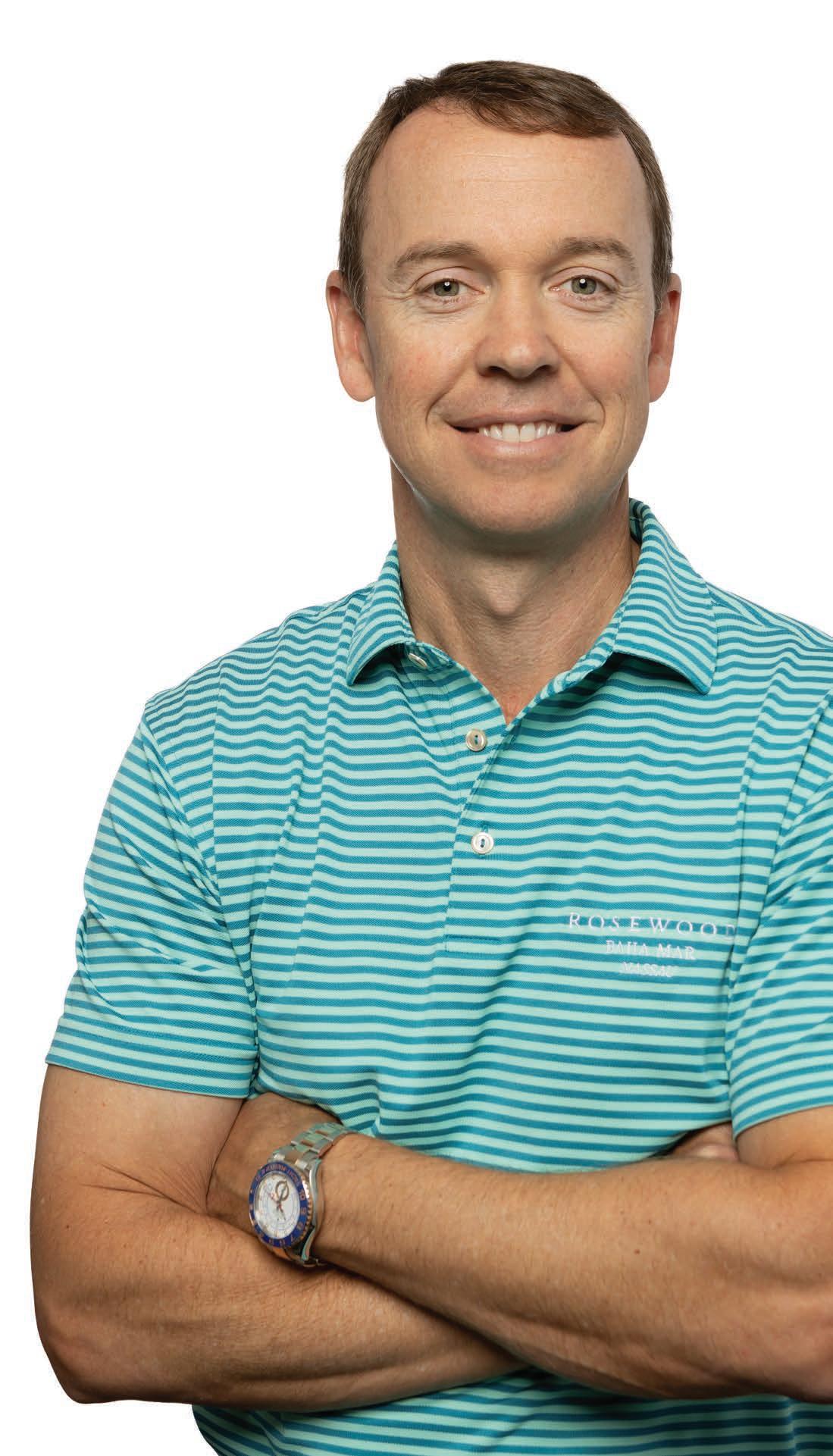
Born and raised in Elkhart, Coley Brady worked in the RV industry for 15 years prior to co-founding Alliance RV with his brother Ryan in 2019. Through past relationships in the business, the brothers were able to identify their key customer base in the fifth wheel market, and had the goal of distributing through the best RV dealers across North America.
The company tagline? “Obsessed with providing the best RV ownership experience.” “We took six months just to listen to the RV end consumer,” Brady says. “Alliance RV was customer-driven from the very beginning. That’s what really resonated in the market and what has allowed us to have tremendous growth.” RV owner training and “empowerment” plus friendly content like destination ideas are part of an “Alliance Academy” that engenders customer loyalty.
As a result, the company has grown in less than three years to $290 million in annual revenue and 700 employees — 23 percent of them female. “We’re creating great jobs,” Brady says. Moving forward, the company hopes to expand into travel trailers while growing the team and maintaining a winning company culture.
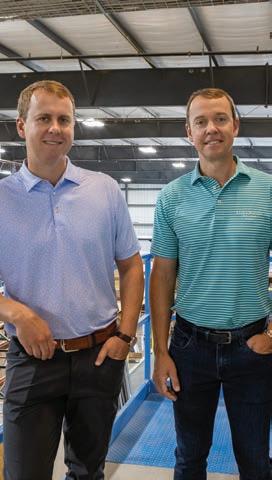
For the past three years, Alliance RV has hosted Ally Rally at the Elkhart County Fairgrounds for RV owners from across the country. This has allowed the company to continue interacting with end consumers, or ‘allies,’ to maintain the high level of customer focus that has made it so successful. “It was really cool to see these people come to our community,” Brady says. “It’s something that makes you feel good when you can see your product being put to use and enjoyed by so many people.”

We took six months just to listen to the RV end consumer.”
Ameri-Can restroom trailers have recently been used for disaster relief in the aftermath of forest fires and hurricanes."
The founders of Ameri-Can Engineering noticed deficiencies in the restroom rental market when they set out to create better portable trailers.


“There were only plastic and wooden port-a-potties at the time,” says Chief Operating Officer Keegan Campbell. “There was a need for nicer, larger, climate-controlled restrooms.” Launched in 1988, the company now employs nearly 30 people and continues to integrate new technology into their manufacturing.
In support of their expansion, Ameri-Can received a Manufacturing Readiness Grant from Conexus, a Pollution Prevention Grant from the Indiana Deptartment of Environmental Management, an INTAP grant through Indiana Small Business Development Center (SBDC), and an international trade grant from the state of Indiana.
Campbell also cites Indiana organizations as important resources for support of the business. “I appreciate everything that IEDC and Indiana SBDC have done for us,” Campbell says. “It has been very nice to have their backing.”
The pandemic created new opportunities and challenges for the company, such as customers requesting more hot water and hand washing into their restroom facilities and meeting customer demand despite supply chain issues. Ameri-Can restroom trailers have recently been used for disaster relief in the aftermath of forest fires and hurricanes. They’ve also been used to offer sanitary access for the unsheltered. “We have a customer in Texas who provides showers to the homeless,” Campbell says. “We’ve built four trailers for him and he’s made about 40,000 showers available with our trailers, which offer a nice place to clean up for a job interview or just help someone feel good.”
"I APPRECIATE everything THAT IEDC AND INDIANA SBDC HAVE DONE FOR US.”
It has been essential for me to find people who are passionate about audiochuck’s mission to produce advocacy driven content and develop a media hub right here in the Midwest.''
Most major podcast companies headquarter on the coasts.
But Hoosier native Ashley Flowers— podcast host and founder of the media company audiochuck—has set up shop in the Indianapolis neighborhood of Broad Ripple.
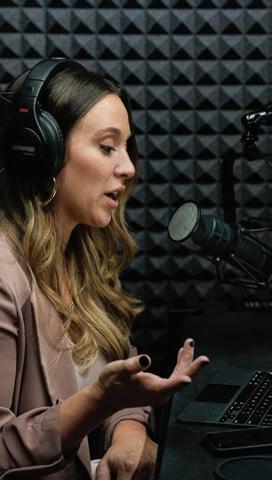

“It has been integral for me to find people who are passionate about audiochuck’s mission to produce advocacy driven content and develop a media hub right here in the Midwest,” Flowers says. “Also, starting a business in Indiana versus Manhattan or Los Angeles has been a lot easier economically.”
Her Midwest address hasn’t hurt her popularity one bit. Since 2017, the company (named after her dog, Chuck) has racked up over 1.5 billion downloads. audiochuck’s flagship podcast, Crime Junkie, is currently the second most listened to podcast in the US. audiochuck is also home to several other chart-topping shows including The Deck and CounterClock.
True crime is the company’s bread and butter—a topic Flowers has been obsessed with most of her life.
“So often I would see myself in the victims because women tend to be the victims of these crimes,” says Flowers. “When I read the stories, it was through the lens of understanding how and why it happened. I thought if I could figure it out, I could make sure it didn’t happen to me. I think a lot of our listeners feel the same way.”
Part of audiochuck’s mission is to bring closure and attention to unsolved cases, including those featured in its podcasts. audiochuck does this by supporting nonprofit organizations and encouraging listeners to get involved and donate as well. Flowers also recently founded the nonprofit Season of Justice to provide financial resources to both law enforcement agencies and families in order to help solve cold cases.
“The most important thing is that we don’t lose focus and forget why we started this,” says Flowers. “I hope in the future we’re still in Indianapolis helping to solve cases."
This business has allowed us to have a little more stability on the cattle side.''
Though the Beneker family’s farm has operated in southern Indiana’s Whitewater Valley since 1884, its cattle-raising philosophy is hardly traditional.
Managed by spouses Allen and Jayme Beneker, Beneker recently launched an eCommerce platform to sell pasture-fed, grain-finished beef straight to consumers, not via grocery stores.
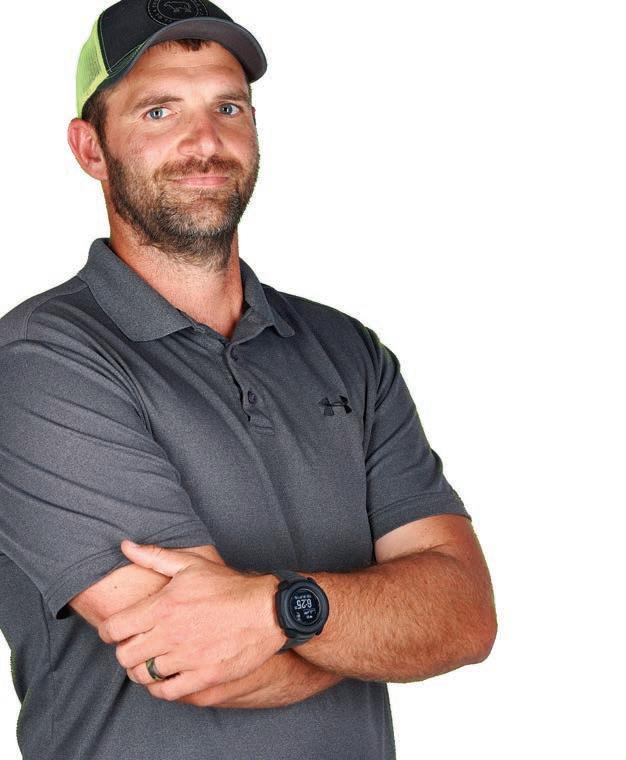
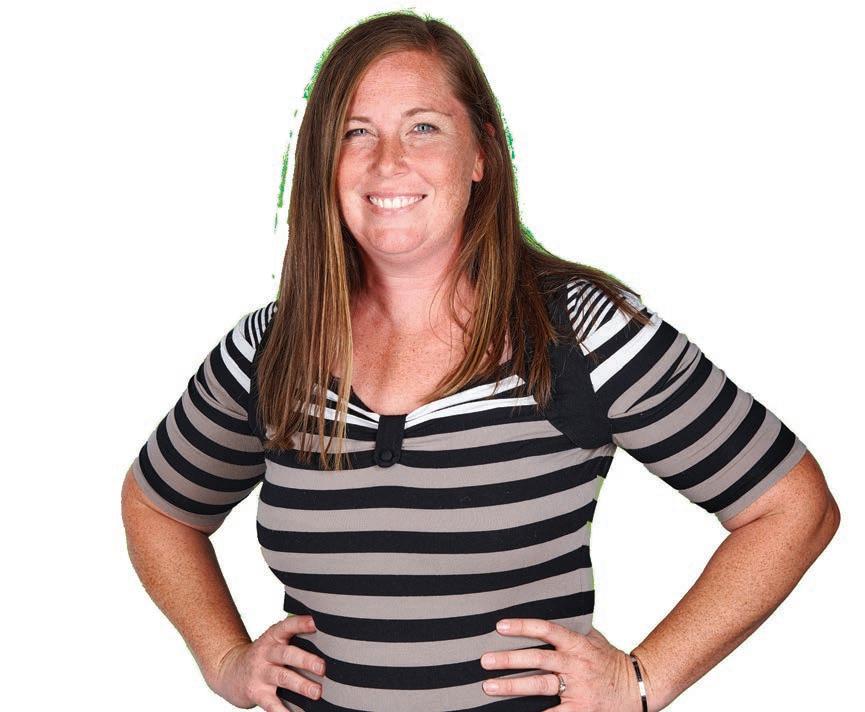
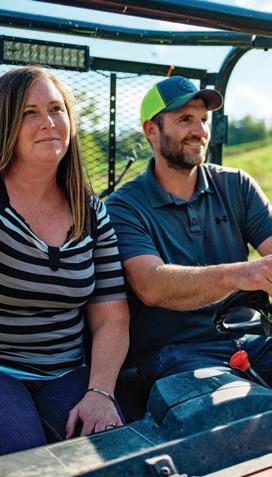
The Benekers dabbled in the farm-to-table market years ago, but the pandemic turbocharged those efforts. Instead of relying on easilydisrupted national and international supply chains, they procure their calves from Indiana farmers; fatten them on approximately 200 acres of their own pasture; supplement their diet with their own farm-grown corn and wheat; process the meat at a specialty butcher in Colfax, Indiana; then dry age it and ship it to customers in cold storage boxes. Orders go as far as Florida, California, and even Montana—a state with no shortage of cattle ranches.
About 10 percent of the Benekers’ cattle herd is used for their farmto-table program. “We’re moving anywhere between 35 and 45 head of beef cattle per year,” Jayme says. “And we have room to scale and grow larger. We would love to sell more direct-to-consumer products.”
The Benekers’ most recent products, developed with the help of a USDA grant, are subscription kits that combine prime cuts with appropriate recipes, plus spice blends from Nashville Spice Company in Nashville, Indiana. Subscribers can purchase, for example, a Perfect Protein Box, a Family Dinner Night Box, and a Ground Beef Box. There’s even a Jerky Club, offering the Benekers’ all natural, nitrite-free dried beef. The Benekers’ launched their subscription kits with the support of an Indiana Small Business Development Center (SBDC) program that paired them with local marketing firm, Steele Digital Marketing Solutions, to provide no-cost marketing services.
“This business has allowed us to have a little more stability on the cattle side because it’s not subject to the commodity market,” Jayme says.
We’re not trying to do a million things at once. But what we do, we do well.”
Alex Gale, co-owner of Black Lodge Coffee Roasters, clearly sells a winning product.
Yet he and his co-owner/husband, Evansville firefighter Ben Ward, don't dream of franchising their tiny coffee shop, or selling Gale’s unique flavored syrups in grocery stores.

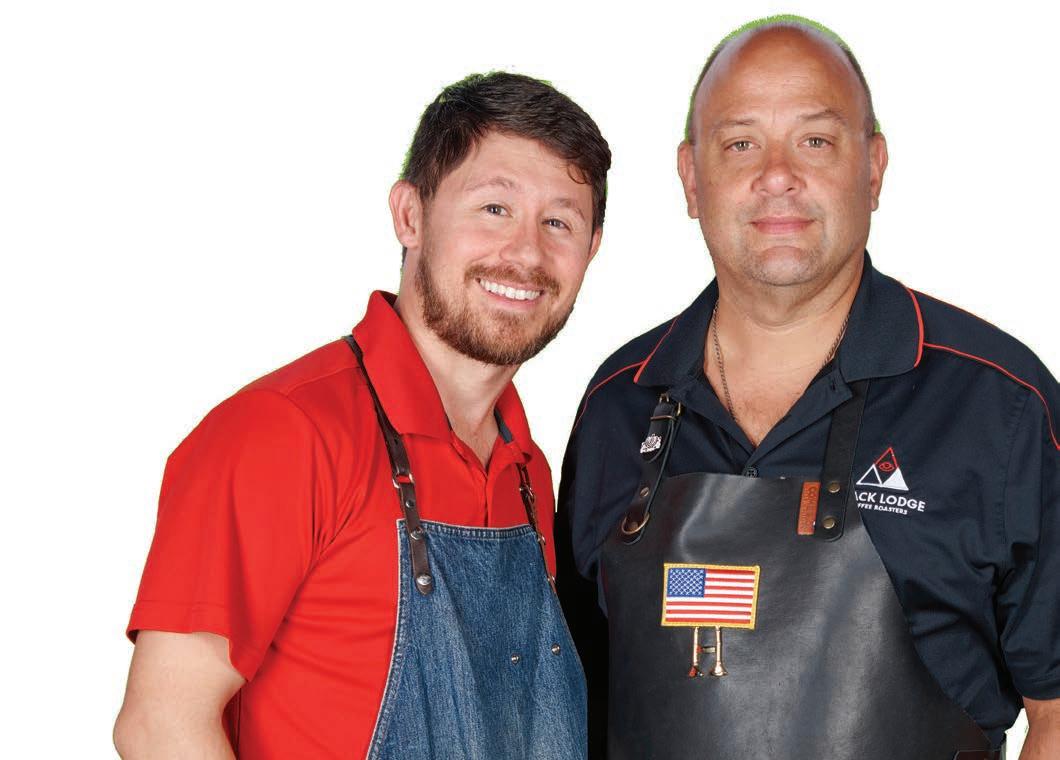
“I don’t want to expand so much that I can’t talk to my wholesale accounts or have personal relationships,” Gale says. “My goal for five years from now is the same as for today: create an open space for humanity.”
With more than a decade of experience in the industry at the time, Gale discovered Black Lodge in New Harmony in 2017 through a colleague. The previous owners offered to sell the couple the place, but five different banks turned them down for loans. Then the community stepped in to find a private financier.
“The town of New Harmony got behind me, one thing led to another and a miracle happened,” Gale says. “In November 2019, I got my shop, and we poured our hearts into this place.”
In exchange, New Harmony got some very unique coffee beverages, including a Sorghum and Sage Latte, featuring locallysourced sage and sorghum boiled at the shop. And in lieu of pumpkin spice, the fall menu boasts Pumpkin Moonshine, which mixes a couple of espresso shots with house-made simple syrup, spicy black tea, and pumpkin.
Gale supplies roasted coffee to a few nearby operations, and recently participated in a tasting event in North Carolina. But he’s content, for now, to let opportunities find him.
“I want growth to be organic,” he says. “We’re just a 960-squarefoot shop. We’re not trying to do a million things at once. But what we do, we do well.”
New Harmony

Soccer moms Carol Podolak and Joy Thompkins started out with a simple plan—raise money to support their kids’ soccer team. “We’d done a vast array of fundraisers and were successful, but we realized they were hardships on the parents who were trying to store and deliver items sold during the fundraiser,” Thompkins says. “We needed to find something unique and healthy.”’
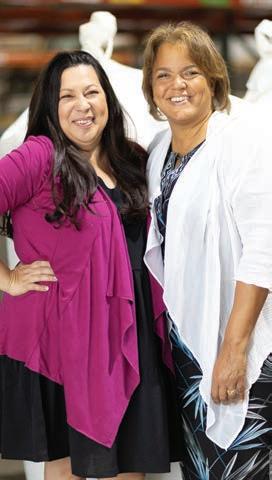
The two came up with the idea to sell homemade peanut butter. “Joy told me we were going to make peanut butter once a year and it was going to be fun,” Podolak says. “She was right about the fun part, but wrong about it only being once a year.” Consumers began clamoring for the pair’s unique flavors such as pretzel white chocolate and blueberry peanut butter. In 2014, their company, BNutty, was launched in Portage and now employs about 50.
Along with support from the local Chamber of Commerce and the Northwest Indiana Forum, the two worked with Indiana Economic Development Corp (IEDC) and the Indiana Small Business Development Center as they grew the business. BNutty products were soon featured on QVC and found their way onto local grocery stores’ shelves. Most recently, the company launched its export sales with a 2023 goal of expanding internationally and growing its online sector.
Podolak and Thompkins remain committed to the community, including serving on local boards and volunteer organizations. Their mission is to provide scholarships for young athletes, and services such as tutoring and help with college applications. “We’re using BNutty as a way to fund student education,” Podolak says. “That’s why we continue to push the growth, because we see what we can do with the results.”
Acquiring capital is always one of the biggest challenges for startup businesses.By the end of 2023, Boomerang Ventures plans to continue growing entrepreneurs and the companies they are supporting, with the added benefit of creating more job opportunities.''
Investor company Boomerang Ventures was created to help entrepreneurs throughout the funding phase. “The Indiana ecosystem is really starting to come together nicely, but there are still holes, and for healthcare in particular,” says Boomerang Ventures founder and managing partner Oscar Moralez. “There are still gaps in capital, talent, and resources that are required to continue to move ideas into commercial entities.”
Focusing on technology in the healthcare and life sciences industries, the venture capital firm offers stepping-stone funding for everything entrepreneurs need throughout different stages of development. Located at 16 Tech in Indianapolis, Boomerang is not only focused on creating successful entrepreneurs, but also building an ecosystem to ensure positive results for all stakeholders involved, including investors and universities.
Moralez has operated in the startup arena for 20 years, raising angel capital at his first company, and then building the first angel network in Indiana called Vision Tech Angels, now the state’s largest. Proud outcomes from that work include successful investments in companies making orthopedic implants for kids, and monitoring devices for premature babies.
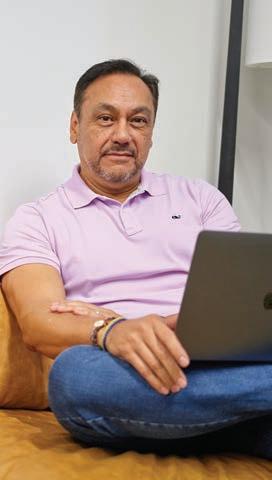
Boomerang Ventures recently secured its first significant project with a health system, making Boomerang one of the largest healthcare funds in the Midwest. By the end of 2023, Boomerang Ventures plans to continue growing entrepreneurs and the companies they are supporting, with the added benefit of creating more job opportunities. “These are good, high-paying jobs in healthcare,” says Moralez. “We’re doing whatever we can to make a positive impact among individuals and stakeholders within the community.”
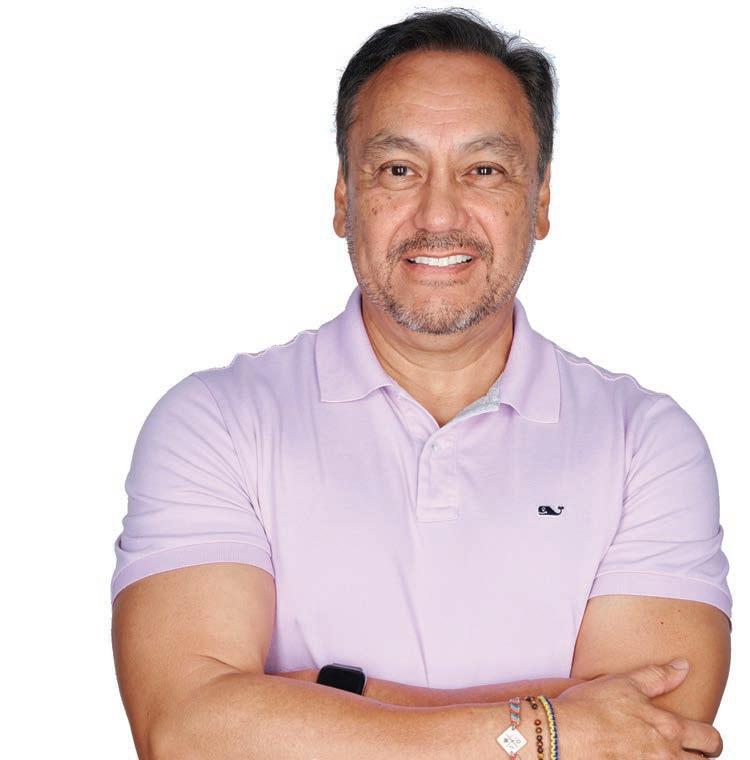
“WE’RE DOING WHATEVER WE CAN TO MAKE A POSITIVE IMPACT AMONG individuals AND stakeholders WITHIN THE COMMUNITY.”
As president, [Metz] modernized the business by boosting its online presence, trimming costs, and finding efficiencies.''
At first glance, Celebrate the Home looks like the kind of business French Lick tourists crave—a shopping destination filled with gifts, home décor, and seasonal tableware.
Pam Metz doesn’t mind if that’s how it appears. In fact, the outlet store wasn’t intended as a retail sensation; it’s there as the visible community face of Boston International, a 38-year-old privately-owned wholesaler of home and gift products, founded in Massachusetts.
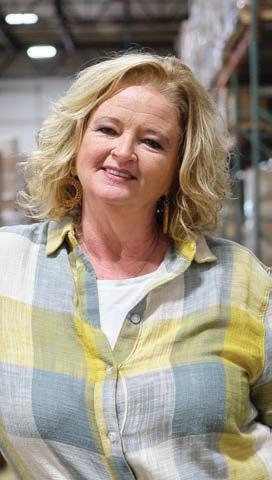
Metz started working for the company in 2007 and bought it in 2014. As president, she modernized the business by boosting its online presence, trimming costs, and finding efficiencies. Boston International had what Metz calls “good bones,” but two problems were always nipping at the heels of the company’s profits: Massachusetts’ spiraling real estate prices and rising taxation. The only way to neutralize these factors? Move to a more businessfriendly state.
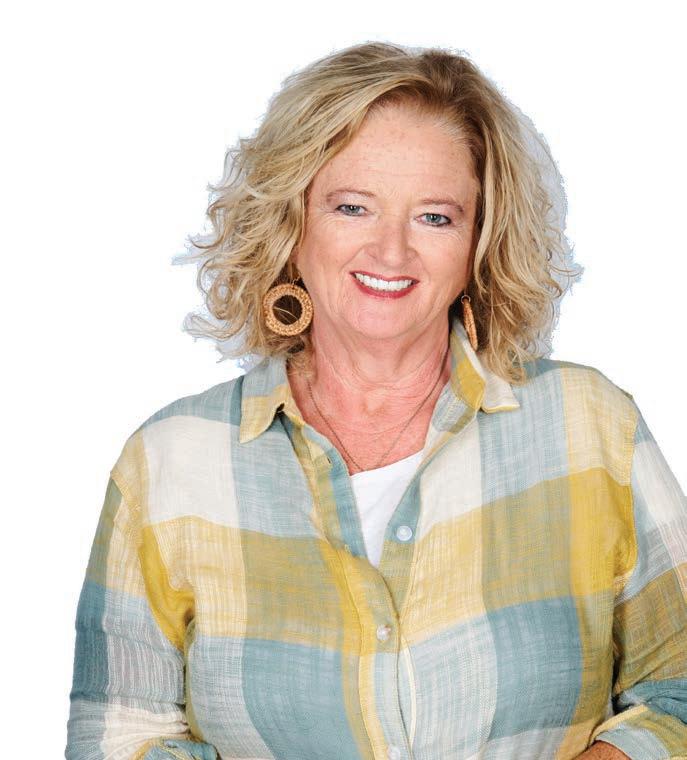
“There’s a poll that comes out every year that rates the best states to do business in,” Metz says. “Indiana is always in the top five.” In 2018, the Tell City native started searching for a new headquarters close to her Indiana roots, when the director of Orange County’s economic development office suggested a building in French Lick. Walking out of the 125,000-square-foot facility, she turned to her husband and asked: “could it be that we just found our space?”
Boston International purchased the building in February 2020. A few months later, semis were loaded up for the move to their new Orange County headquarters, which employs 70 people. The home decor products they design are manufactured globally and sold by a network of in-house and manufacturers’ sales reps to over 11,000 small shops as well as big retailers such as Nordstrom, Neiman Marcus, Wayfair, T.J. Maxx, and Bed Bath & Beyond.
“THERE’S A POLL THAT COMES OUT EVERY YEAR THAT RATES THE best states TO DO BUSINESS IN,” METZ SAYS. Indiana IS ALWAYS IN THE top five.”
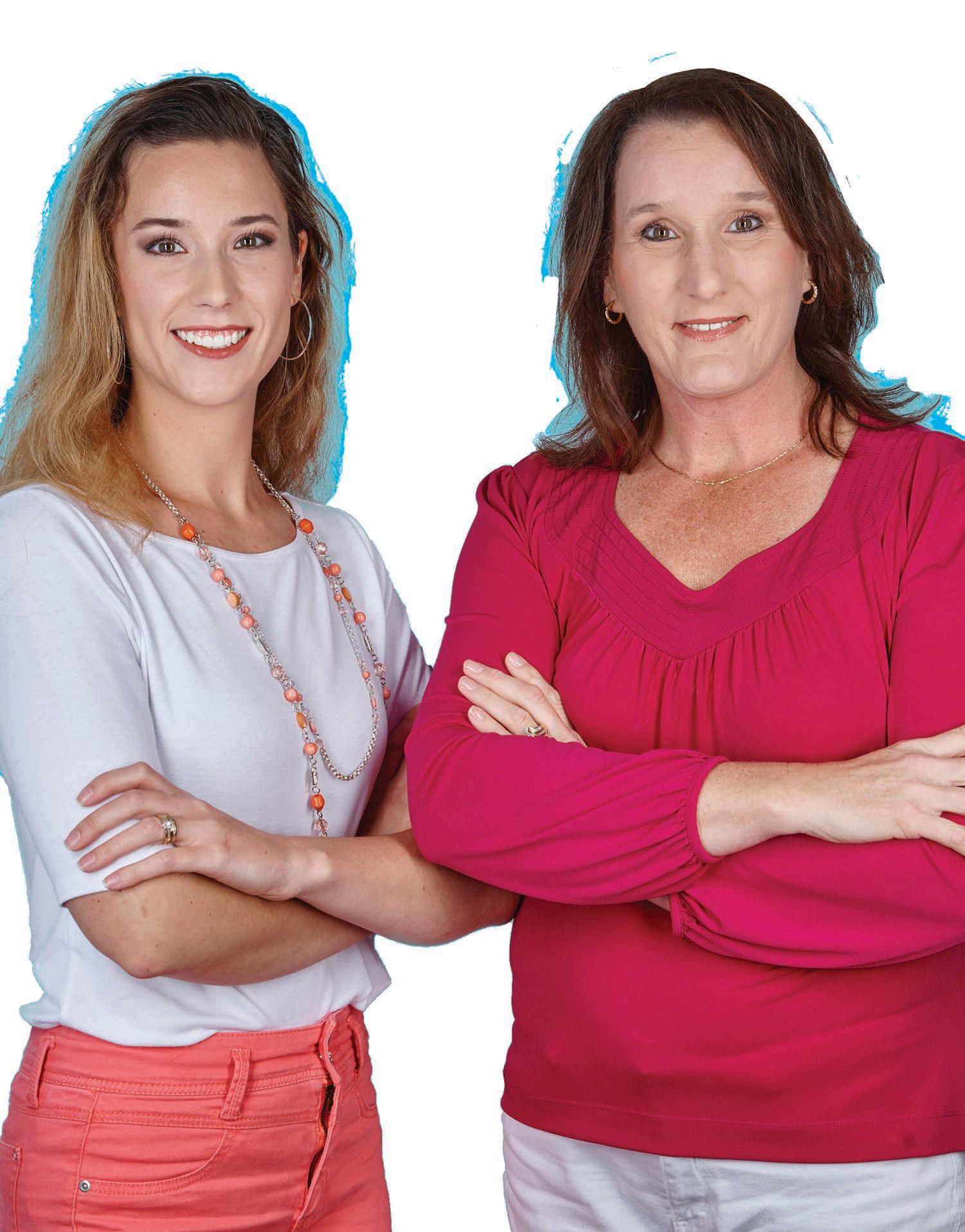
Diamond K Sweets & More, LLC originated from owner Kristi Risk’s mother’s homemade fudge recipe. She taught Risk how to make it, who in turn taught her own children, and the family would gift fudge for Christmas. When people began asking if they could buy more, Risk wondered if she may have uncovered a business opportunity.
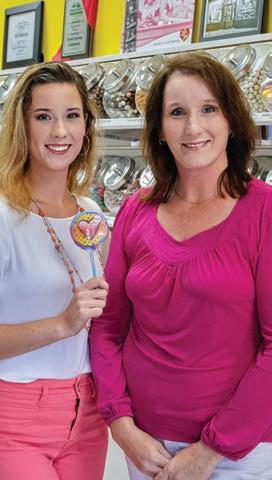

“I went to bed one night and woke up with the name ‘Fudge-O-Bits’ and an idea for how to make it,” Risk says. “The next day, we started experimenting and it literally burst from there.”
While most fudges on the market are made from a mix, the Risk family uses a made-from-scratch process. In 2015, Risk and her daughter Kelsie attended the National Confectioners Association (NCA) convention in Chicago and entered Fudge-O-Bits into the most innovative product competition. It wound up placing in the top five for the specialty gourmet division. “It was the confidence booster that we needed,” says Kelsie Risk-Reyes.
Diamond K is beloved in its Owen County community, too. Just as the pandemic lockdown hit and a recent six-pallet order of fudge sat languishing, the Risks made an altruistic move.
“Everybody in our community was really down...so instead of tossing it, I put that fudge in little bags with encouraging notes stapled on. Didn’t think anything of it, just hung them on doorknobs. We had customer after customer contact us and say: “you don’t know what you did for my children...that little treat just lit their hearts up.”
When launching the business, Kristi Risk found support from her local chamber of commerce’s mentoring program, and she now serves as a mentor herself. Through a Manufacturing Readiness Grant, they were able to purchase a mold maker which will increase capacity. “When we got the grant, it changed the whole trajectory of this business.” Risk says. “It will allow us to make chocolate bombs in an automated fashion, which will quadruple our production.” Next goals for the business? To grow 25 percent, and by 2023, to enter the Canadian market full force.
"WE HAD customer after customer CONTACT US AND SAY: “YOU DON’T KNOW WHAT YOU DID FOR MY CHILDREN…THAT LITTLE TREAT JUST LIT THEIR hearts UP.”
When we got the grant, it changed the whole trajectory of this business.”
While many contract manufacturers boast that no order is too large, for Cox, almost no order is too small: 250 pieces is Genie’s minimum run.''
Megan Cox’s company, Genie Supply, offers stateof-the-art product formulation and custom manufacturing services for hundreds of beauty and skincare startups—all from three former residential buildings in Cox’s tiny hometown of Bedford.
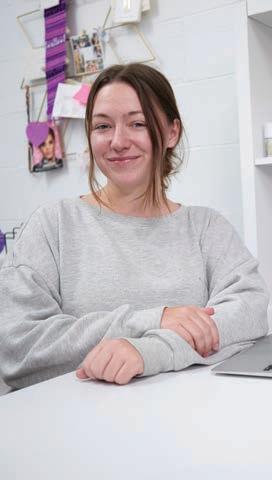
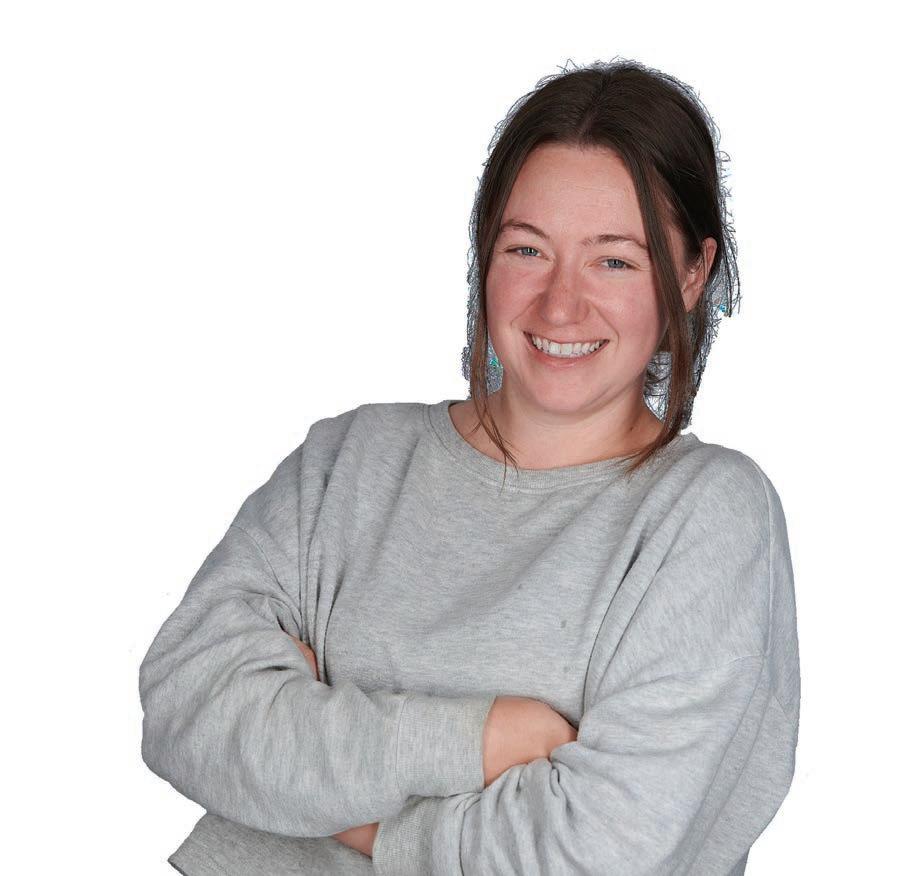
Cox’s unusual saga began when, while attending MIT, she formulated and marketed her own eyelash enhancer. Getting it to market gave her a granular understanding of cosmetics manufacturing—and the fact that tiny companies like hers often had no place to turn for production help.
“Many others were having the same problems I was in finding a lab, finding packaging, and getting quality products,” she says. So after working as a consultant in China, “I moved back to Indiana and opened up my lab in 2018.”
G enie Supply works with about 150 companies annually. Most need help with everything from formulating a lipstick or cream, to figuring out how to produce it at scale. While many contract manufacturers boast that no order is too large, for Cox, almost no order is too small: 250 pieces is Genie’s minimum run.
“ We have the lowest order quantity that we know of in the states— by about five times,” Cox says.
G enie does about $1.5 million in revenue per year. Its staff is diverse, with strong LGBTQ+ representation. Because of that diversity, says Cox, “I find that we are able to deal with problems more creatively and quickly.” Not that Cox minds challenges. “For me,” she says, “they’re the only things that make a job interesting and worth doing.”
We’re providing our end customers a seamless package to request all the services they want in one place.”
Taking a modern approach to legal document court filing, Green Filling, LLC was launched in 2009 by Eric Eastman of Richmond, Indiana (once a software developer) and George Knecht of Scottsdale, Arizona (once a county government employee)
Their goal was to offer electronic filing of court documents to attorneys. They gauged their market by attending state bar conferences. “We do a lot of business-to-business web services and integrations,” Eastman says. “We’re providing our end customers a seamless package to request all the services they want in one place.”
In 2011, three major events propelled the company forward including acquiring users from a company going out of business, doing the custom development work to offer high-volume filing within the Green Filing system, and leveraging the Utah courts’ mandated transition to electronic filing. "Those things were huge for us early on, taking us from existing to thriving,” Eastman says. "The 2018 Los Angeles launch took us to the next level."
Green Filing, LLC is now a multi-million-dollar company with 13 employees operating in six states, with the goal of doubling locations within the 18 months. “I take pride in how great our customer support is,” Eastman says. “That’s where we get a lot of people really excited— at how fast and easy the experience of filing documents is.”
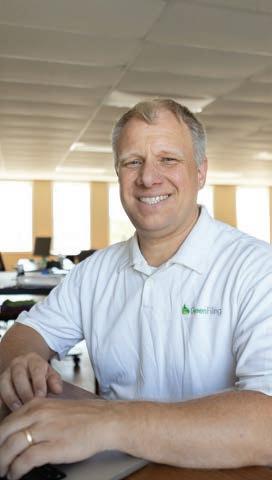
In August 2021, Green Filing was acquired by InfoTrack US, Inc. and is transitioning to becoming part of a larger organization. Eastman is also exploring the idea of creating a co-working space in Richmond to help future entrepreneurs. “This was such an exciting journey for me,” Eastman says. “Now I’m looking at: how can I both inspire and facilitate others in following their dreams?”
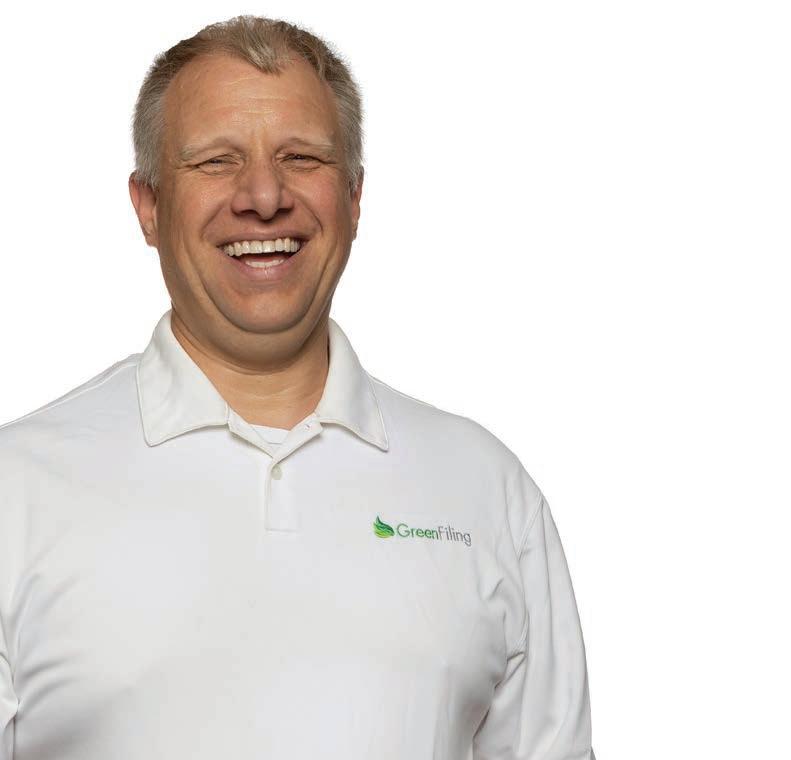
“NOW I’M LOOKING AT: HOW CAN I BOTH inspire AND facilitate OTHERS IN FOLLOWING THEIR dreams?”
With help from the Indiana Small Business Development Center (SBDC) Export Indiana Accelerator Program, Hudson’s goal is to grow that international reach.”
Founded in 1999, Hudson Star Green Mowers initially targeted homeowners installing putting greens, croquet enclosures and lawn bowling courts in their backyards.
Eventually expanding into the golf course greens precision-mowing market, the company gained traction when Quail Hollow Club in Charlotte, North Carolina hosted the PGA championship and purchased three Hudson mowers.
“We’re now on about 14 PGA tour courses,” owner Sean Hudson says. “The golf course superintendents are all on the same Twitter threads. When they have problems with mowing they ask other superintendents, many of whom are recommending the Hudson Star brand.”
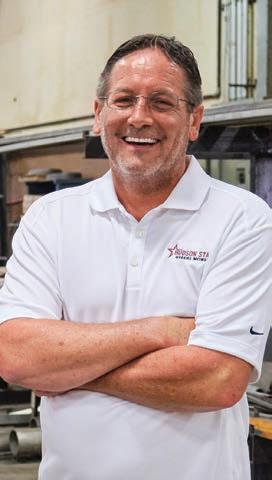
In 2021, the company performed solidly, and this year, they are expecting to double what they’ve done in the past in terms of mowers sold. Combining basic 1920s manual push-mower technology with their own innovation, Hudson Star Green Mowers do not have motors and so are eco-friendly. And durable. One customer reported using his mower for 18 straight years.
The company’s products are now sold all worldwide including the Philippines, Australia, Vietnam, the UK, and Canada. With help from the Indiana Small Business Development Center (SBDC) Export Indiana Accelerator Program, Hudson’s goal is to grow that international reach. Says Hudson: “We’re currently developing some new mowers that will be coming out next year as we push for more exporting.”
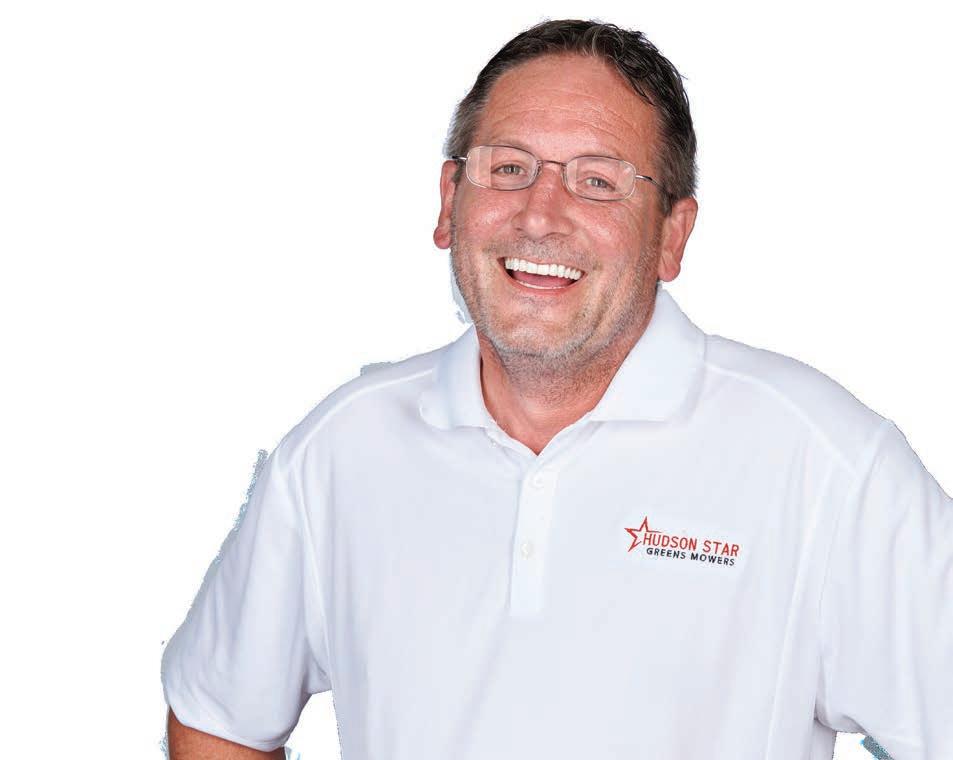
When she was eight years old, Mayasari Effendi’s Indonesian grandmother presented her with an offer she couldn’t refuse: a full ride to college if she worked in the family restaurant.
Years later, Effendi moved to the U.S. and eventually earned a scholarship to study computer science at Purdue. She never dreamed she would have and then leave a corporate job to pursue her love of cooking and live out the American dream. But that is exactly what she did.
In 2011 in Greensburg, Effendi and her husband Richard Mays founded Mayasari Tempeh and opened Mayasari Indonesian Grill, the only Indonesian restaurant in Southeast Indiana. Pins posted on a map on the restaurant’s wall show that it’s a destination eatery, with patrons from all over the world visiting to enjoy authentic Indonesian curries, kabobs— and even an Indonesian take on the Hoosier tenderloin.
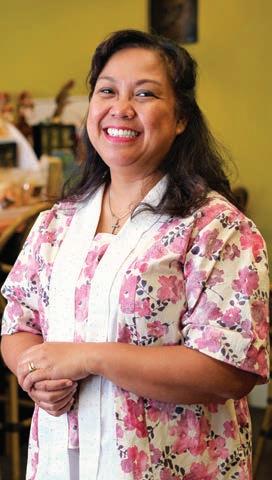
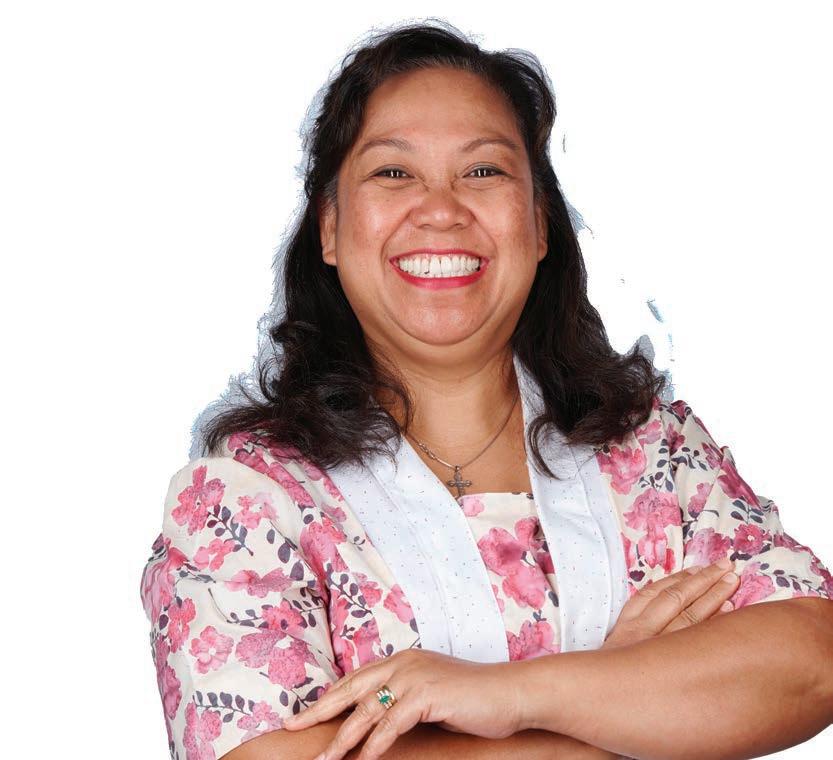
Committed to supporting local growers, 75 percent of the peppers, beef, eggs and other foods used in their restaurant and food factory are Indiana-sourced. “We work with local farmers to grow all our ingredients,” says Effendi. “So we prepare Indonesian food with vegetables, meat, and seasonings from local suppliers. Even our banana leaves are local.”
Recently, Mayasari Tempeh added a fifth distribution hub in Colorado to ship out the fermented soybean cakes, traditional to Indonesia and popular as a meat substitute. The Indiana Small Business Development Center (SBDC) has been vital to the couple’s success, along with the strong support they have received from the local community.
“When we first opened, Maya was terrified nobody would like the food, and I made a deal with her. I said if we can make it past six months, we’ll be fine,” says Mays. “This past May was our tenth anniversary. I knew if people came and tried the food, we would be fine.”
It’s just amazing, folks keep finding us. The local people that come in are very supportive...”
"THIS PAST MAY WAS OUR TENTH ANNIVERSARY. I KNEW IF PEOPLE CAME AND TRIED THE FOOD, WE WOULD BE FINE.”
I am blessed to be surrounded by a great team who took us to this great level.''
Five years ago, MidAmerica Safety Solutions was a one-man show.

Today, the veteran-owned traffic control company employs more than 100 people.
“At first it was just me. I was working in bed with my laptop, waking up with my laptop,” says Jeff Klump, president and founder. “The second year was exciting because that’s when I started hiring managers so I could focus on developing the company.”
Although Klump, a U.S. Marine Corps veteran, doesn’t anticipate that same level of growth in the near future, he does have plans to expand MidAmerica Safety Solutions. The company currently works with Duke Energy, which operates in Indiana, Ohio, Kentucky, Florida, and the Carolinas. With Duke’s Midwest footprint covered, MidAmerica Safety Solutions, Klump plans to start an office by the end of 2023 in St. Petersburg, Florida, where Duke Energy Florida is headquartered. Klump also projects that MidAmerica Safety Solutions, which is based in Evansville will have about 150 team members, as well as an Indianapolis office.

“I am blessed to be surrounded by a great team who took us to this great level,” said Klump. “I appreciate what everyone—new hires, leads, trainers, managers, leadership—does to continue our success.”
Klump is also thankful for his wife and her patience with his entrepreneurial spirit. Klump also credits a CPA friend, an attorney friend, and the Southwest Indiana Small Business Development Center (SBDC) for setting him on the right track. In 2021, the Indiana SBDC named MidAmerica Safety Solutions as the veteran-owned small business of the year.
It’s an honor Klump is proud of, even if he’s still sometimes in disbelief about the company’s growth. Although he’s the first to admit to not taking any business courses in college (he has a B.S. in safety science), he can safely claim: “We’re doing something right!”
“I APPRECIATE WHAT everyone NEW HIRES, LEADS, TRAINERS, MANAGERS, LEADERSHIP— DOES TO CONTINUE OUR SUCCESS.”
Last year, the family grew 14 acres of sweet corn, harvesting only enough grain to make 11 barrels of Sweet Corn Bourbon. The process took six weeks—a time in which, Jason reckons, he could have made 200 barrels of 'regular' bourbon.''
Jason Fruits, CEO and Master Distiller at Old 55 Distillery, says his father, Jeff, came up with the idea for the business.
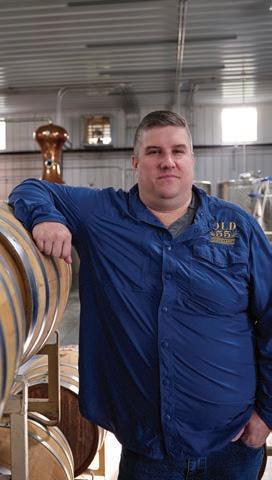

Their historic family business, Newtown Farm Service, is one of the few remaining independent grain elevators in the state. “Dad wanted to look at diversifying, so we got into this,” Fruits says. “Which is hilarious, because he doesn’t drink.”
Dad supplied the seed money, while Jason, his three siblings and their kids provided the labor, expertise, and entrepreneurial fire. Founded in 2013 and located in the west central Indiana county of Fountain—just off the distillery’s namesake thoroughfare, Indiana State Road 55—it’s won numerous awards for its Corn Whiskey (unaged “clear” alcohol commonly called moonshine); Single Barrel Bourbon (aged in custom-made oak barrels); and the company’s crown jewel, 100 percent Sweet Corn Bourbon.
The Fruits get their grains from their own property and nearby farms. They store and dry them in their own elevator, and then ferment, distill, age, and bottle the spirits themselves. Last year, the family grew 14 acres of sweet corn, harvesting only enough grain to make 11 barrels of Sweet Corn Bourbon. The process took six weeks—a time in which, Jason reckons, he could have made 200 barrels of “regular” bourbon.
“That’s why nobody else does this,” Fruits says. “It just doesn’t make any rational sense. The reason we do it is because nobody else will, and it’s just so darn cool.”
"THE REASON WE DO IT IS BECAUSE nobody ELSE WILL, AND IT’S JUST SO DARN COOL.”
Indiana


Nassim AbdiI, Ph.D., wanted to help her humanities students at Purdue Fort Wayne expand their world views. So she told them about her experiences growing up in war-time Iran. Disappointed in their engagement level, she sought another method to increase their understanding of different people’s experiences.
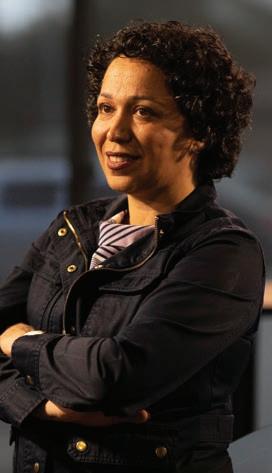
“I read an article about the science behind storytelling and how films can fire up the brain,” she says. “There’s a certain muscle that’s activated and we’re more open to conversation and having empathy for another person.” She received a very different reaction from the same class after showing a short documentary about a plastic surgeon who dedicated his life to war victims, and having the filmmaker do a virtual chat. This sparked the idea to create a resource connecting learners with transformative stories and their subjects. Abdil left her academic teaching job and co-founded StoryBolt.
She’s now CEO of the enterprise platform that uses the power of storytelling for change-making DEI corporate training. With a portfolio of more than 4,000 short documentaries from 112 different countries along with thought leaders and subject matter experts, StoryBolt’s clients include a number of Fortune 500 companies, who love the metrics StoryBolt provides. With ROI analytics, users can see the impact the stories make on cultural belonging and employee retention rates.
Elevate Ventures’ Nexus program helped launch StoryBolt and the company next targeted angel investors. It has now passed half a million in annual revenue; the next milestone will be to take the company to a series A investment round—allowing StoryBolt to serve multiple companies at the same time, build on its infrastructure, and add scalability.
NASSIM ABDIWe know we had a value to offer and we decided to go all in with this business.'' Northern Indiana
Starting a business can be challenging and relatively lonely, but if you’re surrounded by a network, resources, and the support system that the state and the South Bend region have put together, it makes it a lot easier.''
Invented by a trainer at the University of Notre Dame’s athletic department, TayCo Braces were made for the athletic market but now reach the medical market as well: orthopedic surgeons, podiatrists, and orthotists.
Traditional devices such as the walking boot or cast will stabilize an ankle and hindfoot, but they add weight and limit the ability for a person to return to normal, daily activities.
“Imagine not being able to walk without pain or discomfort,” says Gavin Ferlic, CEO of the company. “Our braces provide exceptional stability, and allow the user to return to doing the things that they love to do [or to their livelihoods] much sooner than with alternative technologies.”
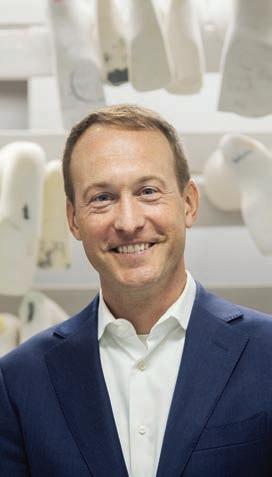

With the ultimate goal of TayCo Brace products as the standard of care within the medical community, the company estimates their braces have already positively impacted the lives of roughly 15-20,000 patients. To accelerate TayCo’s growth, funding and entrepreneurial support was received through Elevate Ventures, Start Up South Bend-Elkhart, Notre Dame’s Pit Row Fund, Irish Angels, and local angel investors.
TayCo's Custom Braces are manufactured locally by South Bend’s Surestep, and Ferlic sees Indiana’s incubation ability as an important component to the company’s success. “The region and the state have done an incredible job providing resources for launching a successful startup,” Ferlic says. “Starting a business can be challenging and relatively lonely, but if you’re surrounded by a network, resources, and the support system that the state and the South Bend region have put together, it makes it a lot easier.”
B ut when the owner of that company retired without a succession plan, Shawn saw the opportunity and utilized it to start his own business with the working relationships he established with customers. The contacts Shawn had made at that company started reaching out to him. As word spread and one customer after another requested Shawn’s services, Rebecca, who at the time was pursuing her psychology degree, took on the paperwork. The pair incorporated The Electrical Connection in 2015 with the help of the Southeast Indiana Small Business Development Center (SBDC).

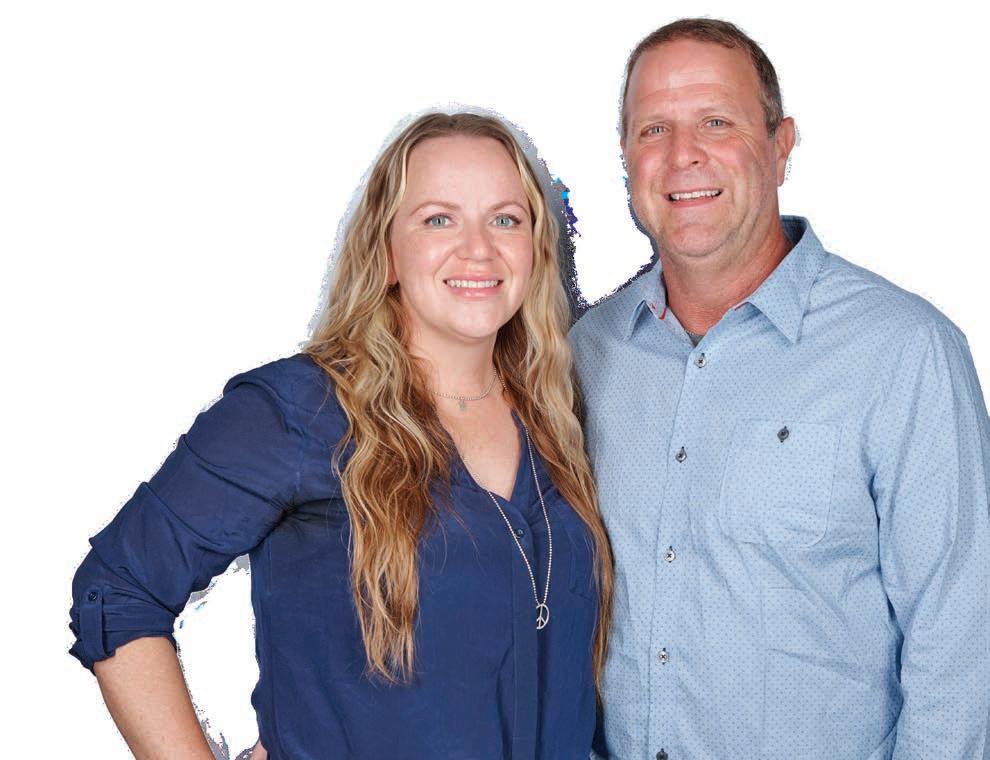
The company specializes in commercial, industrial, and residential projects, including both single-family homes and multifamily apartment complexes. And since The Electrical Connection is based in Lawrenceburg, in Southeastern Indiana, they often work on projects in Ohio and Kentucky as well. They specialize in reducing the stress associated with power outages.
“We just love to work in this community and we’re very proud to serve it,” Rebecca says. “As businesses move in, we get more jobs, and we’re proud of that. We do work for them, and they add services and places to shop and eat in the community.”
Although there is no shortage of work, the Gabbards said it’s challenging to find employees who are willing to do the hard work that comes with electrical jobs. Within the next year, however, they hope to add to their seven-member crew.
“The biggest thing that keeps us going is our loyal customer base and our incredible employees,” Rebecca said. “We don’t do a lot of advertising, but once someone starts using us, they stick with us.”
Indiana
The Electrical Connection
Before co-founding The Electrical Connection with his wife, Rebecca, Shawn Gabbard worked as an electrician at another company.
The biggest thing that keeps us going is our loyal customer base'.'
“WE JUST LOVE TO WORK IN THIS COMMUNITY AND WE’RE VERY PROUD TO SERVE IT.”
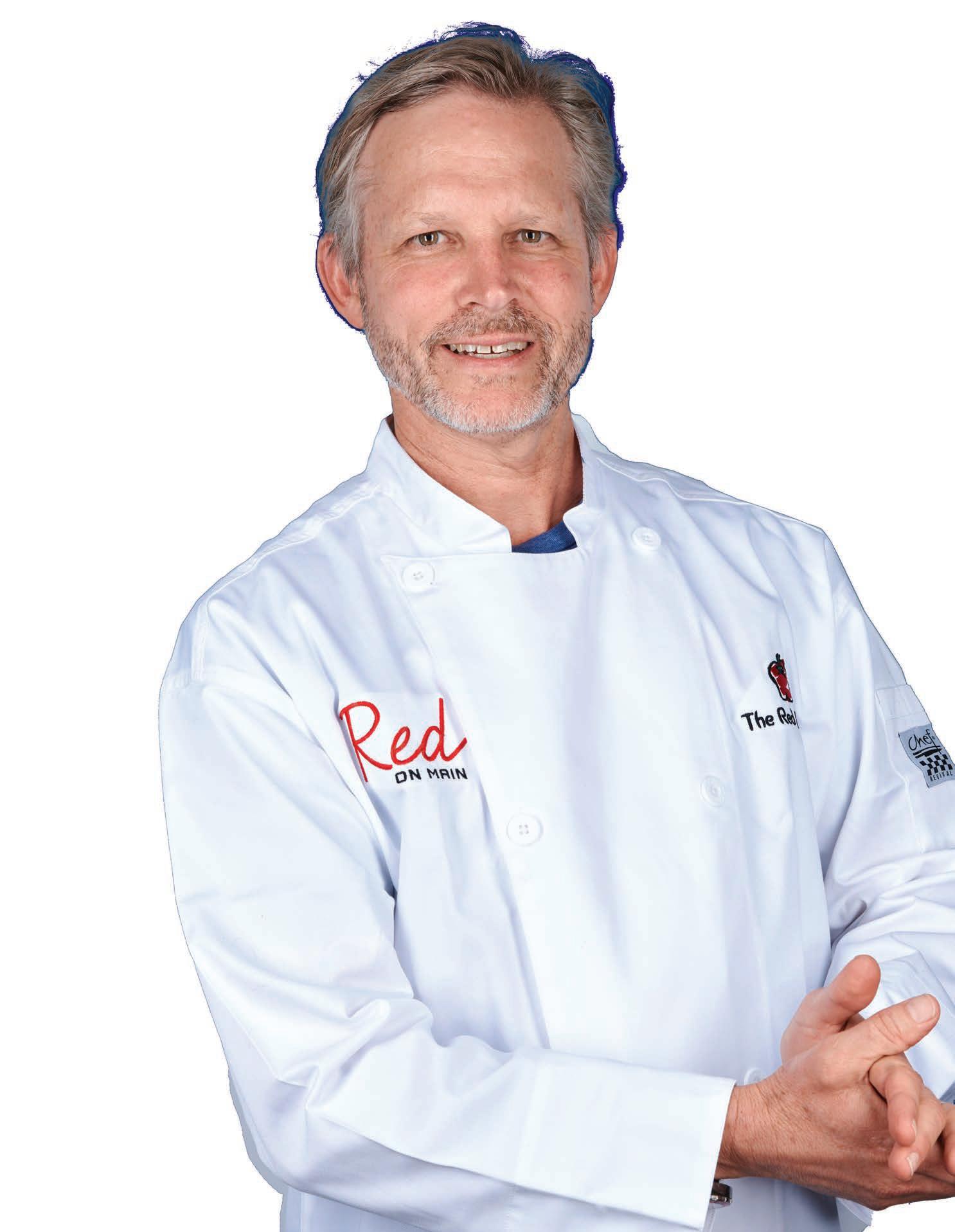
John Heitz always wanted to be a chef.
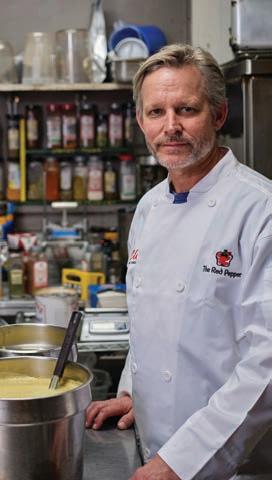
While attending Indiana University, he cut his teeth in the kitchens at Nick’s English Hut and Crazy Horse. After school, he worked at restaurants in Chicago and beyond. John then found himself in Cincinnati, where he met his wife, Lori. The two were paying down his culinary school loan—and working for other companies—when Lori turned to John and asked, “Are you ever going to do anything with your culinary degree?”
The short answer? Yes.

Over the past few decades, John and Lori have painted Madison, Indiana, John’s hometown, Red. It started with The Red Pepper, a full-service deli, café, and catering business. In 2012, the Heitzes opened The Red Pepperoni, a pizza joint with hand-tossed dough. The Red Roaster Coffee & Eatery followed, as did Red on Main, the chef-inspired bistro. The Heitzes also opened The Red Peppermint, a frozen yogurt and ice cream shop, a handful of years ago, which they sold earlier this year because they couldn’t devote as much time to it as they wanted.
John and Lori don’t measure their success by the number of restaurants they’ve opened, however. To them, “success” is being able to replace a piece of furniture or equipment when it breaks.
“You don’t need the biggest, nicest kitchen to get things done,” John said. “My 30-year-old Hobart mixer is going to make the same pizza dough as a new $50,000 one. Just because you get a line of credit for $100,000 doesn’t mean you need to spend it all.” John also likes to tell up-and-coming entrepreneurs that they need a business mentor or a banker who will tell them the unvarnished truth.
John is most proud of his big city standards in a small town setting. Growing up, John thought “experts” lived far away: that architects were only in Indianapolis and caterers were only in Cincinnati. To the contrary, the Heitzes have created top-notch products with an “out-of-town” look that draw consistent raves from big city visitors.
My 30-year-old Hobart mixer is going to make the same pizza dough as a new $50,000 one. Just because you get a line of credit for $100,000 doesn’t mean you need to spend it all.”
Northern Indiana MetricMICHAEL AND SHELICE TOLBERT

We have to drive growth because who else will? We have to show people that it is worth being here.”
“As we advanced in our careers, we gained experience and in 2013 we started dedicating our date nights to writing a business plan,” says Shelice. In 2015, Tolbert & Tolbert, LLC was launched.
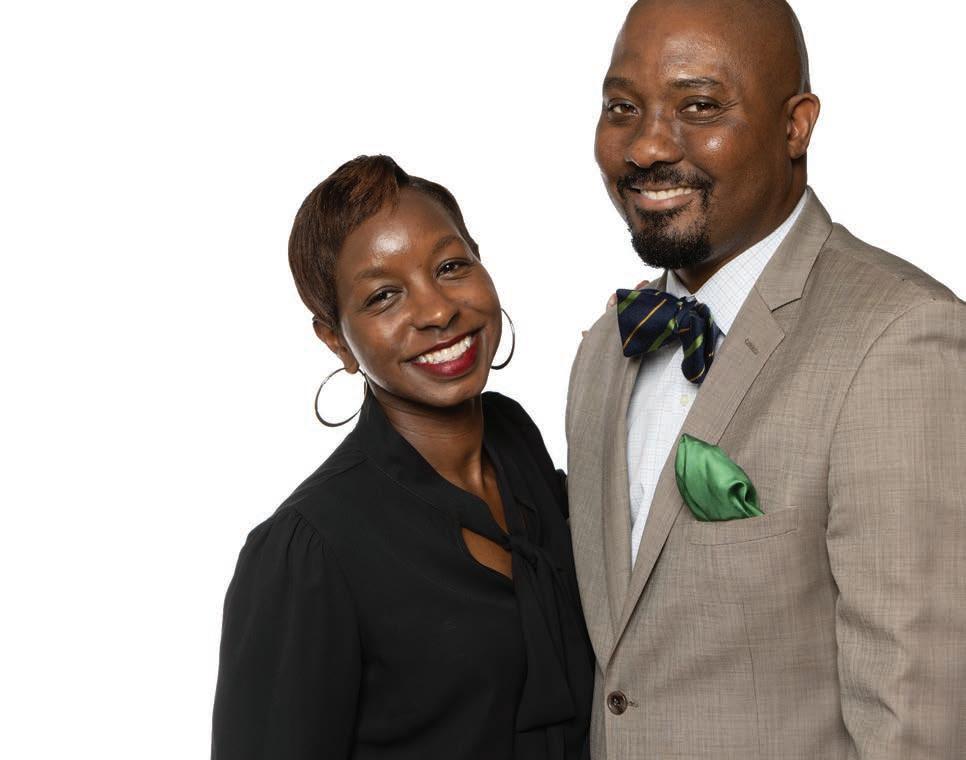
The Tolberts specialize in personal injury, insurance litigation, contract disputes, negotiations, and work with small businesses on entity formation. The couple has gained a loyal customer following due to their stellar reputation and devotion to the Gary community where they are both civically engaged. They say their faith has played an important role as well.
“We are one of the only faith-based firms. We have a Christian mission in how we deliver our services,” says Michael. “Most times we are helping people through high-intensity moments. Recently, we represented a mother who was being sued and she was afraid she was going to lose everything. We assured her that we would handle things to the best of our ability and she prevailed. She was so happy. We prayed before and after the case. Right around that time her daughter was graduating from high school and she invited us over to celebrate. We like those experiences where we are more than just counselors to our clients.”
When it came to starting the business, Tolbert & Tolbert received support from their local Indiana Small Business Development Center (SBDC) and the Small Business Administration (SBA) through a program at their church. They had previously been denied by other financial institutions.
The Tolberts want other entrepreneurs to know that dreams are possible. “The first thing is having faith and not backing away from doing business in Gary,” says Shelice. “We have to drive growth because who else will? We have to show people that it is worth being here.”
Attorneys Michael and Shelice Tolbert always planned to go into business for themselves and set up shop in their beloved hometown of Gary.
The company is known for its high-quality products and excellent service.”
Woman-owned Valor Defense Solutions, Inc. is located within four miles of the Naval Surface Warfare Center ( NSWC ) Crane Division in Oden, Indiana, in the southwest part of the state.
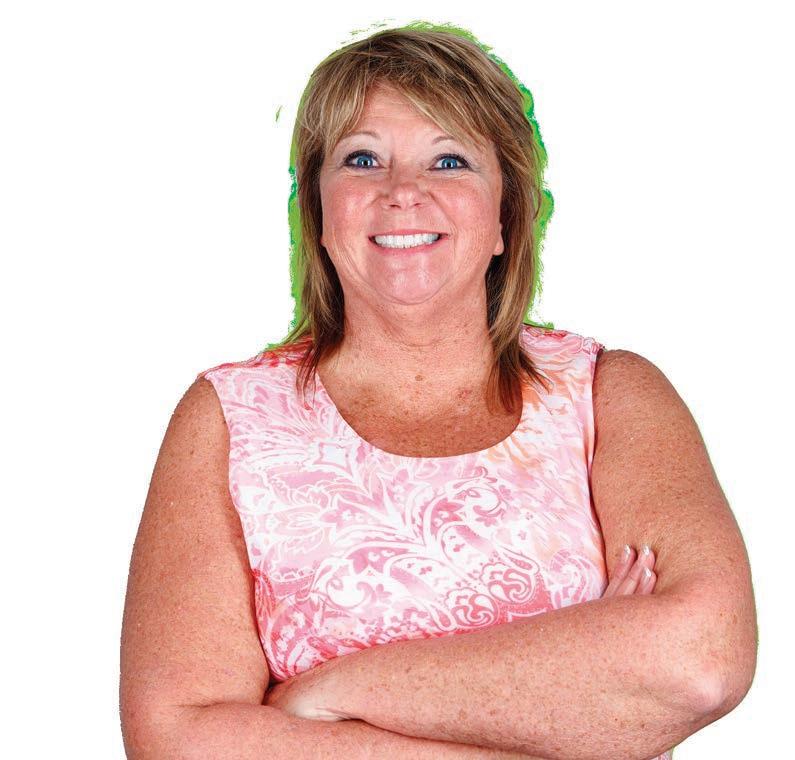
Valor provides a one-stop shop for logistical, engineering and cabling support for government agencies. They refurbish militarygrade equipment for the Department of Defense, and offer high-end sandblasting, painting, and powder coating services to other commercial clients.
After many years in the defense contracting industry, CEO Dr. Sue Davis, a life-long resident of Greene County, decided she wanted to go out on her own. “I had worked supporting NSWC Crane for over 30 years as a program manager,” Davis says. “I developed many relationships during that time while working on different projects for various divisions of Crane. That’s how our customer base was developed.”

With over 2 million in annual revenue and 16 employees, the company is known for its high-quality products and excellent service. To reach this level, the company received support from the Indiana Economic Development Corp (IEDC), the Small Business Development Center, the Small Business Administration, Daviess County Economic Development Corporation, and Purdue University.
Valor Defense Solutions now hopes to become an even larger contributor to the Indiana workforce ecosystem by engaging in community projects and schools. “We want to find and retain talent,” says Davis. “This involves creating a feeder program to draw from the local community’s skill sets.” Davis envisions expanding Valor’s customer base to include more government contracts along with commercial clients, with the goal of growing annual revenue by 25% by the end of 2023.
High Alpha’s portfolio includes Mandolin, a live concert streaming service and fan engagement tool launched during the pandemic that currently serves over 1,000 artists (and was recently named the #1 Most Innovative Music Company by Fast Company); Filo, a collaborative online working environment that powers everything from virtual teams to conferences; and Base, the first software platform for executive assistants.
Since High Alpha’s launch, more than 100 venture studios have cropped up throughout the country, employing a similar model to grow entrepreneurship in their communities. “They’re calling us to learn from our playbook,” Dorsey says.
ENTREPRENEURSHIP TAKES A VILLAGE Dorsey knows how much a leg up can mean to entrepreneurs striving to bring their ideas to market. “Entrepreneurship is really hard,” Dorsey says. “It’s high risk. You read about the success stories, but you don’t read about the ones that don’t work.”
In addition to connecting entrepreneurs to expertise and resources through High Alpha, Dorsey believes that creating a broader support system that includes state and local government support is crucial to growing healthy entrepreneurship ecosystems. “Outside of capital and mentorship, founders need policy and community-level help,” Dorsey says. “More investments fail than succeed. We need to find ways to incentivize investors and entrepreneurs to invest in high-risk companies.
The Venture Capital Investment Tax Credit is a great start, but there’s still more we can do.”
In late 2000, Dorsey co-founded ExactTarget, a provider of digital marketing automation and analytics software and services, with Chris Baggot and Peter McCormick.
O ver the next 13 years, Dorsey and friends grew ExactTarget to over 1,500 employees, two-thirds of whom were located in Indianap olis. ExactTarget was acquired by Salesforce in 2013 for $2.5 billion. In other words, Dorsey understands the conditions necessary for entrepreneurs to thrive—and he wants to create those conditions for as many business owners as possible. “My dream was that if ExactTarget had any kind of success we would pay it forward,” Dorsey says, “to recycle capital and knowledge back into our ecosystem to benefit up-and-coming entrepreneurs.”
A BUSINESS THAT LAUNCHES BUSINESSES Dorsey co-founded High Alpha in 2015, the world’s first venture studio combining company building with venture funding to conceive, launch and scale B2B SaaS companies. In just seven years High Alpha has launched over 35 companies and invested in more than 60 founders. “What’s unique about the studio is that we combine a venture firm with a startup studio,” Dorsey says. “The startup studio is working on new ideas, and we’re matching founders to those big ideas. We’re bringing in experts in HR and recruiting, product design. And on the venture side, we’re investing in our own companies. The model gives these founders a huge jumpstart.”
With every founder, Dorsey and the High Alpha team stress the importance of building a community at the same time they’re building their company. “During the time we were building ExactTarget, community was a huge part of our playbook and our motivation,” Dorsey recalls. “We wanted to prove that you could build category-leading software companies in Indy when all of our competitors were on the coasts. We had incredible support from every mayor and governor—and we wanted to pay it forward. A sense of place and a sense of community is important. Doing something great for your community can be a force.”
Dorsey wants Central Indiana to become the best place for founders who want to start a company. High Alpha’s belief and investment in entrepreneurs has already gone a long way toward making that dream a reality.
If you’ve been part of the business community in Indiana during the 21st century, you’re familiar with Scott Dorsey’s story.
“THEY’RE calling us TO LEARN FROM our playbook .”

Victor Gutwein and Mike Asem—both West Lafayette, natives living and working in Chicago—co-founded M25, an early-stage venture firm that invests solely in tech startups headquartered in the Midwest. Since their 2015 launch, M25 has become the most active investor in the region.
In 2017, the M25 team was internally debating about the best cities in the Midwest outside of Chicago for tech startups. “We were trying to prioritize where we would spend time and travel as investors focused on the Midwest,” Gutwein recalls. “We’re a very data-oriented firm, so we said, ‘Let’s pull the numbers on startup and investment activity, on everything that goes into a great ecosystem, and see what the numbers say are the best tech communities.’”
They decided to share their findings in 2017 in what has become M25’s annual Best of the Midwest: Startup Cities Rankings. What started as an exercise to settle an internal debate has turned into a dataset that provides an analytical, objective benchmark to help startup stakeholders—from founders and VCs to community champions and elected officials—understand how Midwestern cities are performing relative to each other in their tech startup ecosystems.
The system weighs Startup Activity at 40.5% of the equation, Access to Resources at 42.5%, and Business Climate at 17%. And Indianapolis is climbing the ranks.
In 2017, Indianapolis placed #8 in the Midwest in the M25 rankings, but in 2022 Indy sits at #3, disrupting the long-running top three of Chicago, Minneapolis, and Pittsburgh. “A big part of Indiana’s success is that it boasts an aggressive combination of state funding incentives for startups—from a top competitive angel tax credit to a very active direct investing arm [Elevate] to a large and thriving fund-of-funds [Next Level],” Gutwein says. “It’s the grand slam of government support for funding new startups. This has paid off in a big way: Indy has a very large and evolving startup ecosystem that’s now outpacing even other growing cities like Pittsburgh and St. Louis.”
Gutwein and his colleagues at M25 put their money where their rankings are. “There’s a reason we put our second office in Indianapolis in 2020,” Gutwein says. “It’s a major tech ecosystem, and even though we invest across the entire Midwest region, Indy is home to ten of our portfolio companies and counting, so we knew it would continue to produce amazing startups. We also wanted to be close to our existing founders.”
In order for Indianapolis to maintain its momentum, Gutwein believes a mindset shift needs to occur amongst Indiana investors entering the tech startup space. “In order to be an investor in venture capital, you have to be ok with failing,” Gutwein notes. “A lot of Indiana investors come from traditional backgrounds like farming, manufacturing and real estate—industries where you’re less likely to lose all your money from your initial investment. It’s a mindset shift.”
Another important change that Gutwein would like to see is more Indiana founders holding out for bigger outcomes. “A lot of people are content or sell too soon. Right now, some people see success as making the front page of their local business journal with a $50 million sale. They need to be shooting for the Wall Street Journal: making a billion or IPO-ing.”
Gutwein also wants to underscore that successful ecosystems are cropping up all over Indiana as a result of government support and access to resources. “We’re seeing a lot of growth and opportunity outside of Indy,” Gutwein says. “Lafayette, Bloomington, South Bend, Fort Wayne—there are notably good signals from all around the state.”
In 2019, Elevate Ventures launched Elevate Nexus, a program designed to strengthen and connect higher education resources in the entrepreneur ship space with local communities and the startup ecosystem statewide.

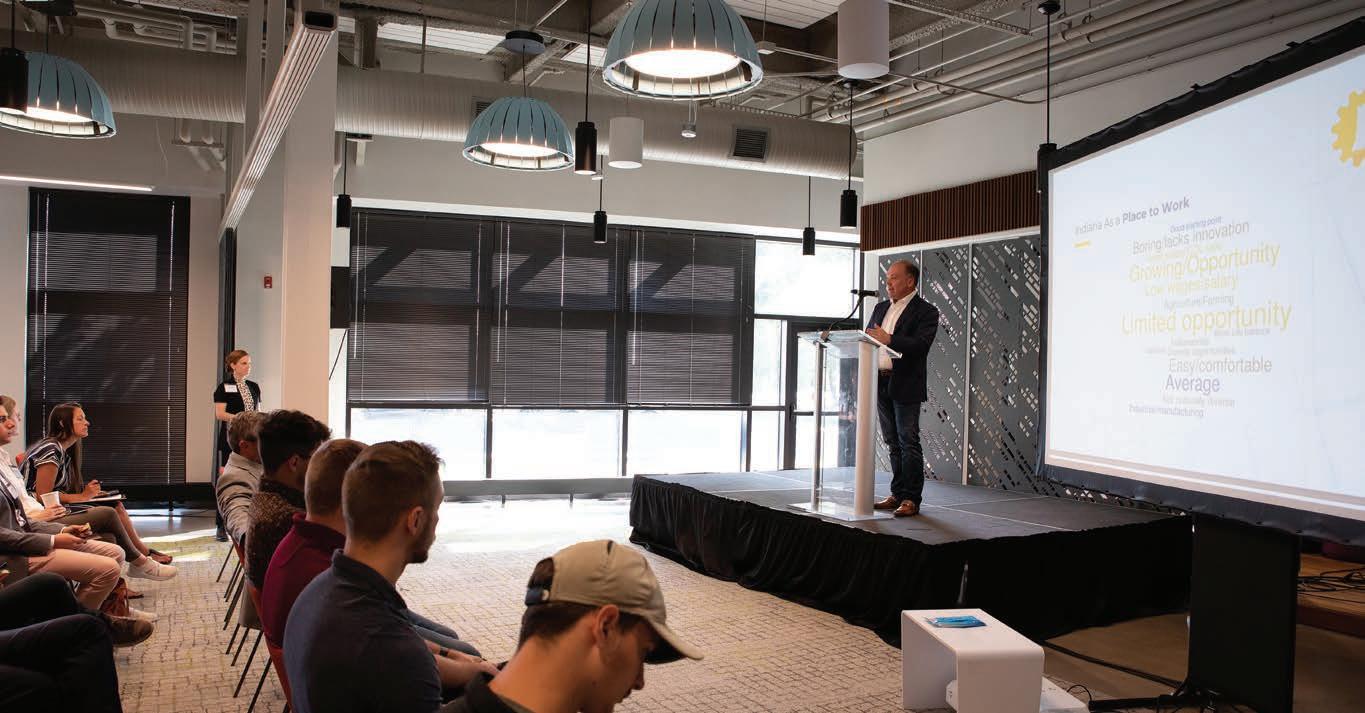
Thirty-four colleges and universities across the state are engaged in the program.
As part of this initiative, Elevate Ventures developed the Higher Education Index, a clearinghouse of business innovation resources at each institution—from academic courses and programming and notable faculty, to the record of individuals who have taken part in Elevate trainings, Elevate pitch competitions, or received investment funding.
Updated and released annually at Elevate’s Nexus Conference, the Higher Education Index is a novel way to link entrepreneurs with campus innovation to increase connectivity in the higher education ecosystem. “The roster includes more than two dozen institutions,” says Executive Director of Entrepreneurial Programming & Entrepreneur-in-Residence Landon Young. “If companies come to Indiana and want to do business or engage with institutions, they’ll know who to contact at these entrepreneurial service organizations.”
Elevate Ventures also provides training, resources, and advisory services. The vision is to coach entrepreneurs during their startup’s earliest developmental stage, assist them in pitching to investors, and help them construct innovative business models to leverage additional venture dollars. “We want to shorten the timeline and increase velocity for how fast startups move across the continuum of funding,” Young says. “By adding more resources and offerings, we’re seeing that happen.”
Case in point: Elevate Ventures has helped founders of companies like Neurava—maker of wearable seizure detection
“WE WANT TO SHORTEN THE TIMELINE AND INCREASE VELOCITY FOR HOW FAST startups MOVE ACROSS THE CONTINUUM OF FUNDING.”
devices, based on a Purdue intellectual property—move from entrepreneurship training, to winning pitch competitions, to receiving traditional venture investment. Says Young: “Now we have a way to track and visualize that continuum.”

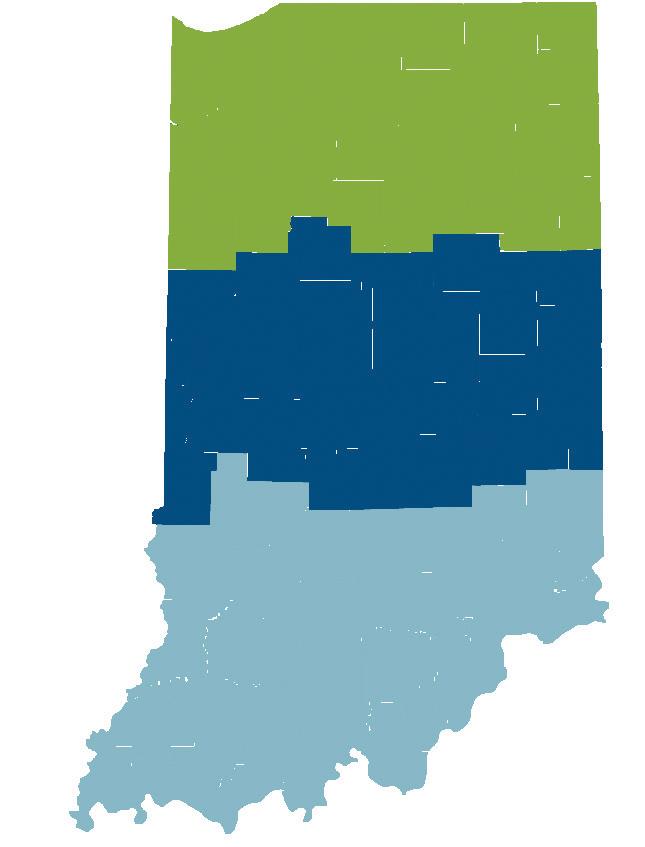
Nestled on the northside of Indianapolis, Elevate Ventures assists high-growth startups extend their businesses through access to capital and resources.
As the most active venture capital firm in the Great Lakes Region for the past six years, Elevate has impacted nearly 3,800 startups through its various programs.
Elevate is constantly striving to make the startup journey more efficient for entrepreneurs. According to the Bureau of Labor Statistics, 20 percent of new businesses fail within the first two years. In addition, according to the Bureau of Economic Analysis, 43 percent of businesses don’t exceed $50,000 in total revenue. In contrast, research conducted in collaboration with Dr. Regan Stevenson at Indiana University shows that when Elevate invests in a company, those companies hit $100,000 in revenue within three years of filing their first paperwork with the state.
Through targeted initiatives, Elevate Ventures is working to change these numbers to help startups reach these, and other milestones, more quickly.
To assist startups in reaching their first customer, Elevate offers mentorship and funding through their statewide Entrepreneurs-in-Residences, Elevate Origins, and Elevate Nexus. These programs are designed to give companies at the earliest stages a major boost, allowing them to gain access to more opportunities as their company grows.
Elevate is also working on initiatives to empower startups to hit revenue targets–whether $100,000 or $1 million. Elevate’s Sales & Marketing Accelerator, launched in September 2022, gives Elevate portfolio companies access to coaching that is focused on helping founders find product-market fit and grow revenue.
Elevate Ventures is committed to helping entrepreneurs at every stage of their journey and will continue to assess data to identify new ways to support startups as they face different challenges and obstacles.
Mean : 8. 24 Quarters ( 2.06 years) Std. Dev: 6.84
Mean : 10.96 Quarters ( 2.74 years years) Std. Dev: 7.19 Mean : 9. 32 Quarters ( 2.33 years years) Std. Dev: 8.68
Scan to learn more
TO ALL INVOLVED IN MAKING THIS PROJECT A REALITY: WE ARE VERY proud OF THE HARD WORK THE State of Indiana AND THE INDIANA ECONOMIC DEVELOPMENT CORP ARE DOING TO ENABLE Hoosier ENTREPRENEURS TO PURSUE THEIR dreams.
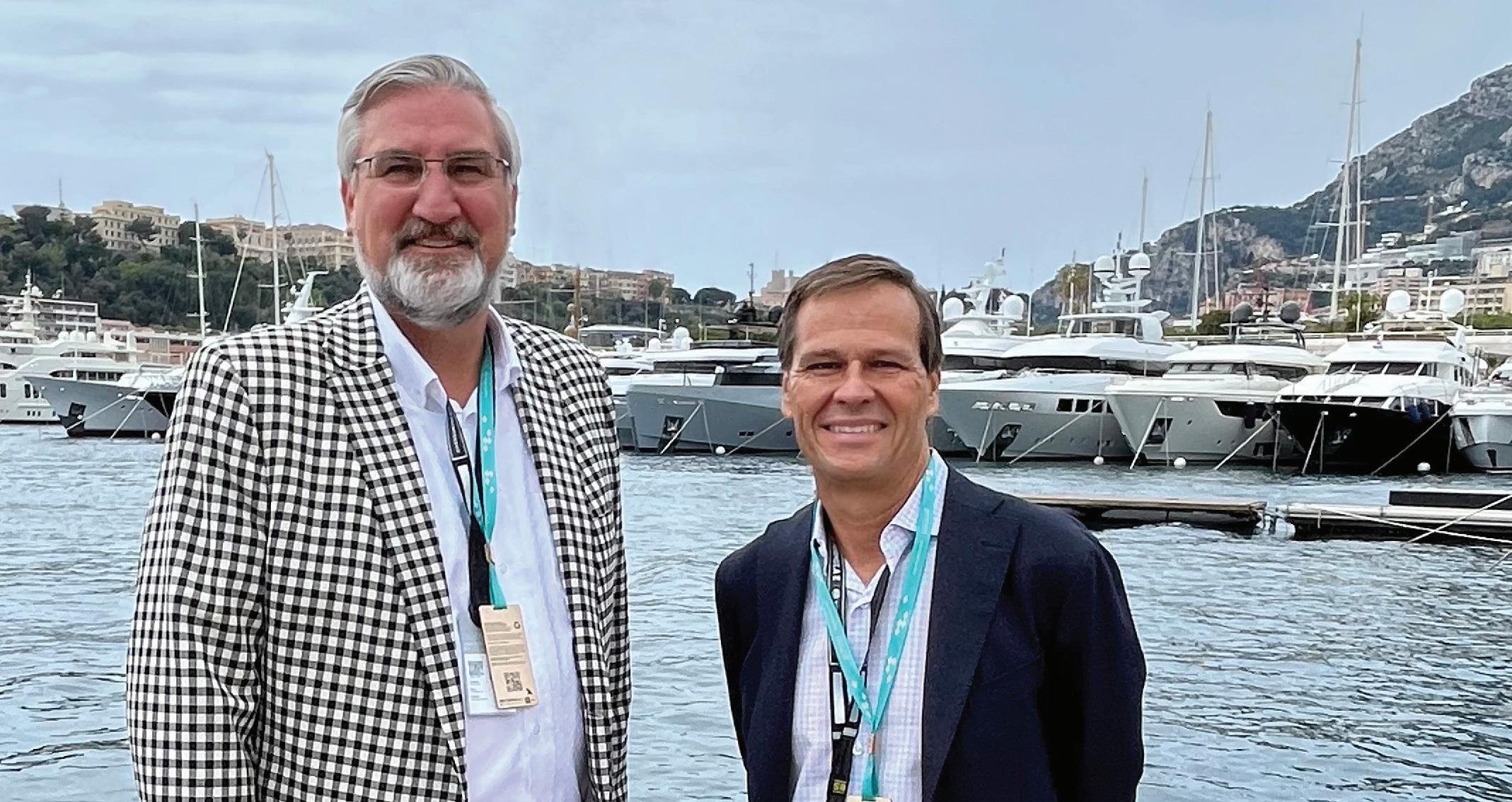
SINCERELY,

 Bradley B. Chambers Secretary of Commerce State of Indiana
Eric J. Holcomb
Governor State of Indiana
Bradley B. Chambers Secretary of Commerce State of Indiana
Eric J. Holcomb
Governor State of Indiana

Scan below to NOMINATE THEM TODAY.


